Robert Bruce Crandall Letters & Diary

1839—
1901
Civil War Wisconsin 23rd Infantry, Company F
1862
1865


1839—
1901
Civil War Wisconsin 23rd Infantry, Company F
1862
1865
Civil War Wisconsin 23rd Infantry, Company F

1862 1865

Researched and compiled from various sources by William C. Schuette
2021
© William C. Schuette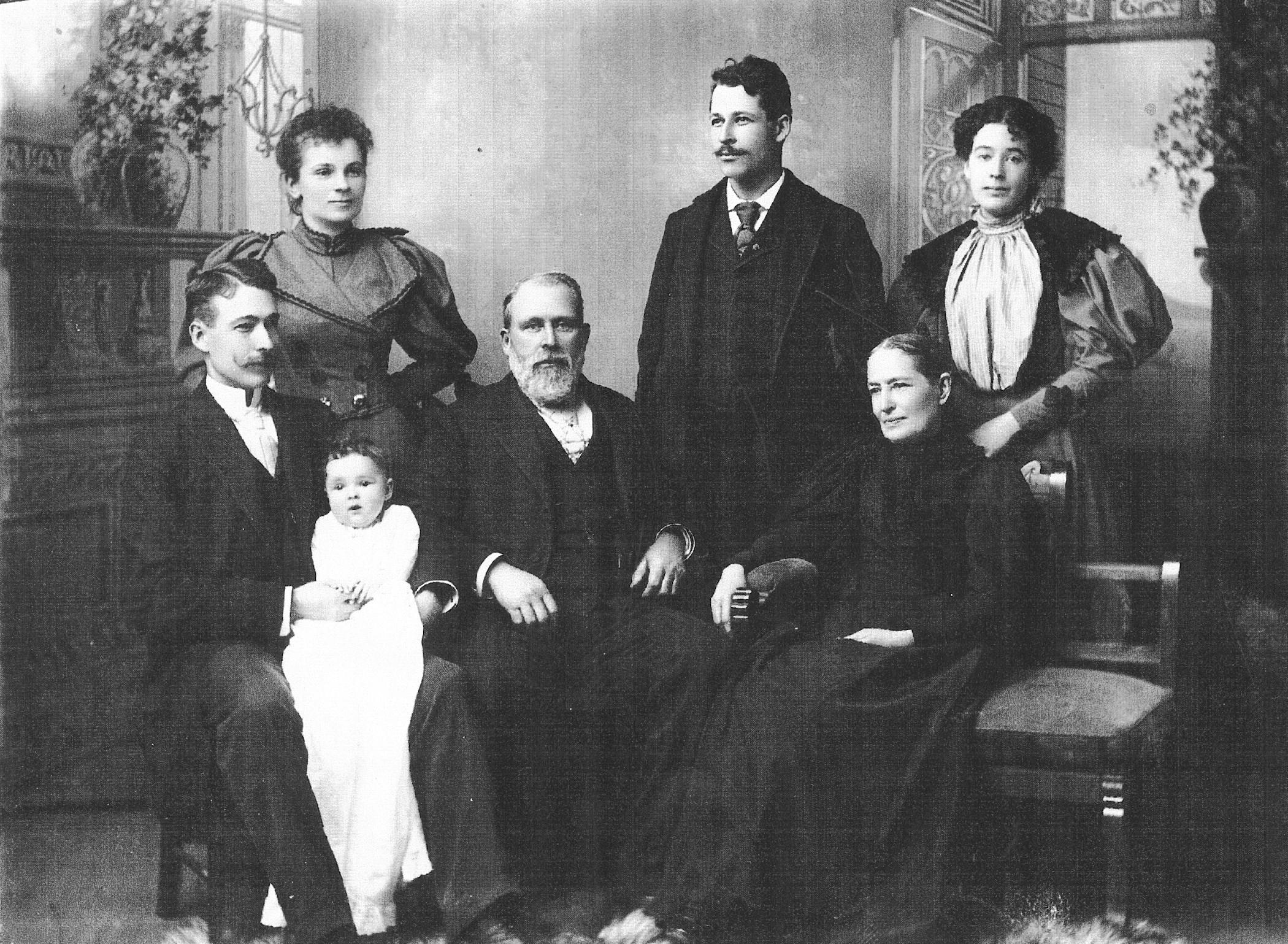

L-R: Day (David) Crandall (son) and wife and baby Day, R.B. Crandall, Morris Crandall (son),Alice Crandall (wife of R.B.)
Jessie Crandall (daughter)
taken in Olympia, WAca. 1898
Photo Photo from the collection of Beverly Cabbage 2020L-R: Morris C. (Son of Robert &Alice), Jesse (Daughter of Robert &Alice), Day (David) E.
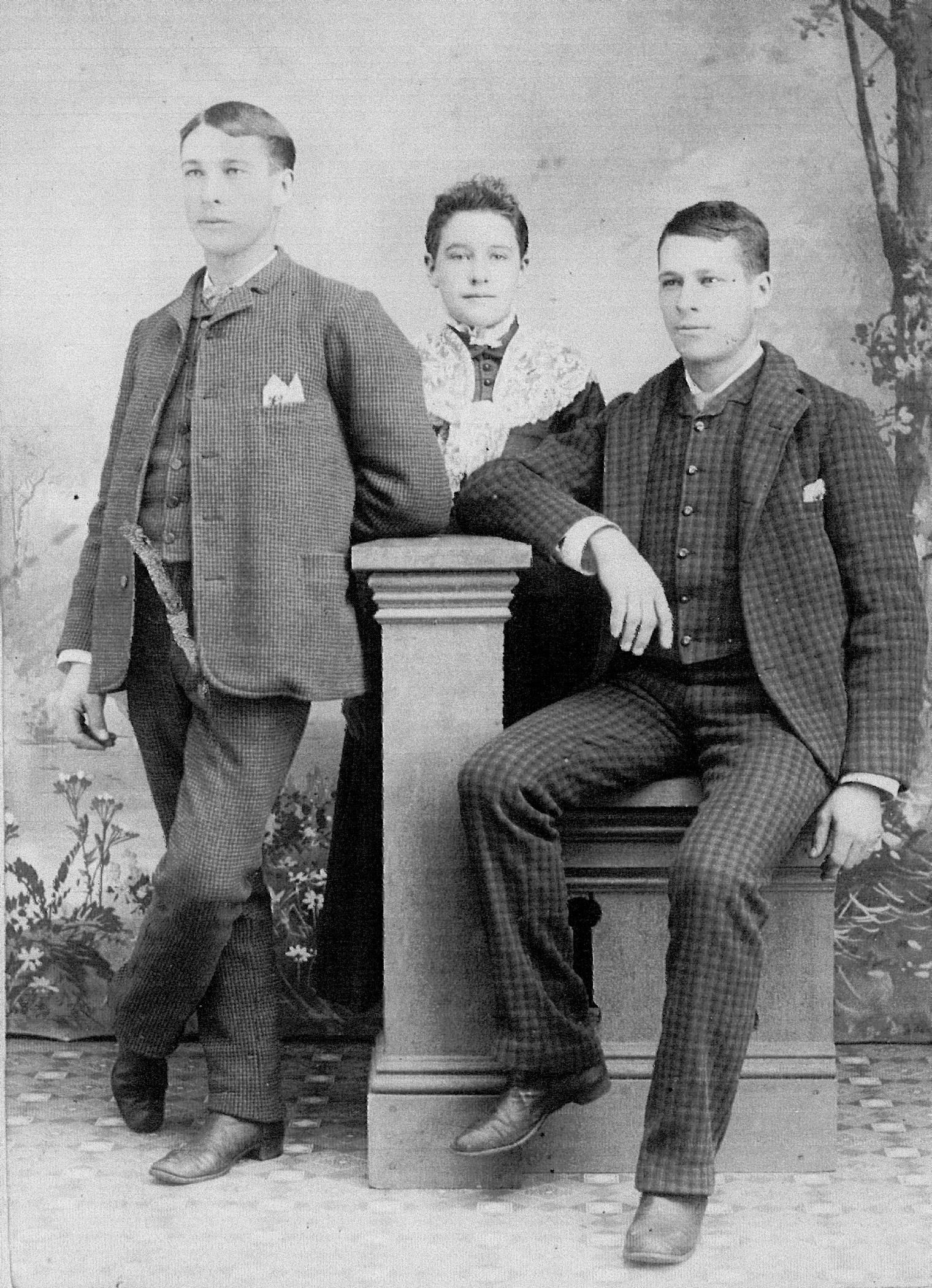
 (Son of Robert &Alice)
Photo from the collection of Beverly Cabbage 2020
(Son of Robert &Alice)
Photo from the collection of Beverly Cabbage 2020
Twenty-third Infantry. Col., Joshua J. Guppey, Lieut.-Cols., Edmund Jussen William F. Vilas, Edgar P. Hill; Majs., Edmund Jussen, Charles H. Williams, William F. Vilas, Edgar P. Hill, Joseph E. Green.
This regiment was organized at Camp Randall, Madison, in Aug., 1862, and left the state Sept. 15 for Cincinnati, whence it was ordered south to join the army before Vicksburg.
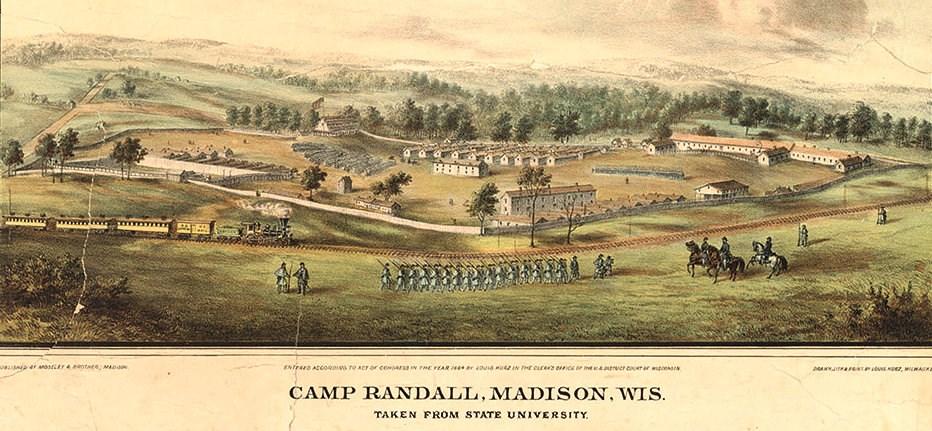
It was with Gen. Sherman in the assault on Chickasaw Bluffs and assisted in the reduction of Arkansas Post. The action of the regiment was the occasion of congratulatory orders from division and brigade commanders. It then proceeded to Young's point, La., near Vicksburg, where three-fourths of the men were stricken with virulent diseases because of adverse sanitary conditions.
The regiment was on scout and foraging work until April 30, 1863. It was brought into reserve at Port Gibson and entered the village the following day - the first Union troops to occupy it. It took the advance of the division at Champion's Hill, doing such effective work as to call forth compliments from the general commanding.
The following day it went into action at the Black River bridge, its brigade capturing the 60th Tenn. and carrying the enemy's works by assault. It reached Vicksburg on the 18th, and participated in the general assault on the 22nd, reaching the base of one of the forts under a heavy fire. It was on duty until the surrender, at which time losses had reduced its numbers
to 150 men who were fit for duty.
It participated in the attack on Jackson, and was constantly on duty until the evacuation of that point. It then joined the expedition through Louisiana, going as far as Barre's landing near Opelousas, which it occupied the entire summer.
The return march begun Nov. 1 and two days later a superior force attacked at Carrion Crow bayou, driving two regiments through the 23d's lines. Flanked on both sides, the regiment fell back, formed a new line when reinforced, drove the enemy back in turn and regained the lost ground, receiving for its gallantry the public thanks of the commanding general, though it lost 128 out of 220 engaged. It reached Brashear City, Dec. 13, and was ordered to Texas, where it remained until Feb. 22, 1864, when it returned to Louisiana. It was in the celebrated Red River expedition, was in the battle of Sabine CrossRoads, and the action at Cloutierville.
It was in camp at Baton Rouge from May 25 until July 8 and then proceeded to Algiers and Morganza where it remained until Aug. 18. It was transferred to the 3d brigade, 2nd division, 19th army corps, and was engaged in guard, post, garrison and reconnaissance duty until May 1, 1865.
It was then ordered to Mobile, where it was engaged in siege, patrol and picket duty, and short expeditions until July 4th, when it was mustered out.
 Wisconsin Genealogy Trails
Wisconsin Genealogy Trails
August 27, 1862---
Our Volunteers Gone In obedience to an order received last night, the Baraboo Rifle Company left this morning at 10 o’clock, for Madison. A large number of friends of the company assembled, to bid them Good-bye. Parting addresses were made by Judge Orton, Mrs. I. Codding, and Miss Mortimer, and on behalf of the company, by Robert B. Crandall.
The company had been warned to hold themselves in readiness to go into camp at short notice; but it
Captain CHARLES H. WILLIAMS
Lieutenants J.A. SCHLICK, E.L. WALBRIDGE
Malby Colvin Amos Colborn
John J. Hinds
Lucius Crozier
George B. Pearl George Dustin
Calvin P. Bliven
John H. Fulle
E.G. Seamans Edwin R Freeman
Hiram Snell James T. Gorgas
Beeman B. Spooner
Israel Greeney
Samuel Emery D.W. Hitchcock
Theodore Gwin Wm. H. Hamilton
Chauncey M. Blake James Hogeboom
Samuel H. Webster Charles Klumpp
George Van Orman Peter H. Kipp
Jesse Morley
Robert B. Crandall
Edward N. Narsch
Elisha W. Ellis
Joseph N. Savage Jr.
John W. Kezerta
William Lippitt
Charles Moore
James W. Mason
Homer D. Newell
Argalus Langdon C. Newell
William E. Brill
Jasper Odell
Charles F. Cooke B.B. Palmer
Edward Kingsbury
George A. Paddock
LJ. Bailey Jacob Platt
Samuel Maxham
Elijah C. Spear
William Quackenbush
James D. Roberts
Russell Delp Adam Richart
Zephaniah Palmer
Byron W. Pruyn
Zoeth E. Bailey
Cortez A. Langdon
Amasa Ritter
Marcus Remington
George Smith
Philip Stackhouse
H.H. Baldwin William L. Spooner
was hard to part with them so suddenly, notwithstanding. God bless them!
August 27, 1862
BARABOO RIFLES
The following are the names of our brave boys who compose the company formed here for the Twenty-third Regiment. A better company, in any respect, has never been raised in Wisconsin.
Baraboo RepublicJasper N. Babcock
Thomas B. Scott
John J. Foster
Abraham Lezert
George Stowell
Jeremiah Sullivan
Philos O. Stutton
Charles Secker
Daniel C. Stanley John Staley
Henry H. Johnson
Henry A. Morrill
Marvin Van Orman
Elisha H. Catlin
Orsamus W. Stutton
William Sproul
Charles L. Stoner
John Sheaser
F. Marion Crawford Calvin Traver
Henry C. Stanley
W.A. Slade
Andrew J. Miles
Henry Fessler
J.M. Densmore, Jr.
George Moog
William H. Hogeboom
Andrew J. Braley
William Simon
John Goman
Marvin E. Jopp
Jacob Cline
Henry Ketchum
E.W. Case
Ralph Cowles
J.H. Rhodes
John B. Alexander
Charles Bates
Henry Black
Thomas Bourk
William J. Clark
John E. Camp
Charles A. Thomas
Oliver W. Thomas
Jacob Vandenberg
Henry H. Williams
Henry Weller
Andrew A. Wescott
Marvin Wiggins
Joseph Waddell
John Waltz
George W. Waddell
W.W. Pollock
Thomas F. Holden
E.B. Reynolds
John Kenworthy
William Griffith
Ira J. Hall
John Hagon
Joseph Fisher
Smith Z. Deveraux
Jason Shaw
Peter Knowles
Isaiah Fry
September 3, 1862
To Leave Soon By a letter received this morning, we learn that the 23d Regiment is under orders to leave as soon as they can possibly be got ready, which will probably be before the end of the week. The Sauk Co. Guards took to Madison 125 men, and as no company is allowed more than 98 men, quite a number, aside from those thrown out through disability, must be transferred to some other company. A braver set of men never stood in line than Capt. SCHLICK and his gallant fellows.
Promotions Capt. C.H. WILLIAMS, of the Sauk Co. Guards, has been promoted to the rank of Major of the 23rd Regiment. Lieut. SCHLICK, succeeds him as Captain. E.L. Walbridge becomes 1st Lieutenant, and DANIEL C. STANLEY succeeds Lieut. WALBRIDGE as 2d Lieutenant.
These are worthy promotion(s), and will gratify the many friends of the company. Since the leading officers are not all to be taken from the ranks of regiments in the service, which seems to us to have the true policy, we do not see how the present corps of officers could be bettered.
Baraboo Republic
nent corner; it was generally remarkable that the second company did the finest marching. At 8 o’clock we were served with coffee, bread and cheese, and at 9, “fall in!” then away for Toledo. The most of [the men] enjoyed a good night’s sleep. We reached Toledo at 7 A.M. Tuesday, had an hour for breakfast and to run around, then off again for Columbus. We were troubled with but a single runner this day. His box of cigars being confiscated instanter, the boys were so jubilant, the Colonel called us the musical company. By the way, the Col. paid us a high compliment before leaving Madison. On Sunday, many members of other companies being in the guard house, the Colonel visited them, and giving them a severe reprimand, wound up by saying that Co. F. had not had a single man in the guard house yet, and he would point them to it as an example.
September 24, 1862---
From the 23rd Regiment
Camp Guppy, Near Covington, KY. Sept. 18, 1862.
Editors Republic: Yesterday, at twenty minutes past four o’clock, we stepped upon the “old Kentucky shore.” Last Monday morning we left Madison at 9 ½ A.M. The boys were very lively that day, and commenced trying their hand at confiscation, by appropriating to their own use the contents of baskets and boxes passed through the cars by those extortionary boy peddlers, or runners; they soon learned to avoid our cars, which met the approval of our officers, for they said we were far better off without the trash than with it.
The people on the road were very enthusiastic. It being “washing-day,” the ladies would run out and seize anything the most convenient, from a pocket handkerchief to a table cloth, and wave it till we were out of sight.
We arrived at Chicago at 6 o’clock P.M., and paraded through the principle streets for two hours. Co. F received loud applause upon turning every promi-
This afternoon we passed through a good fruit country. It was amusing to hear the exclamations of the boys at the rich sight of the apple and peach trees bending beneath their heavy weight of fruit. “Stop the iron horse, till we fill our pockets!” was one of the many. But at some of the larger stations we had opportunities for gratification of our taste, and to enjoy at the seme time the liberality of the citizens, who brought baskets full of fruit, and distributed among us.
We reached Columbus at 8 ½ P.M., had a very good supper, and a little exercise, and started for Cincinnati at 10. Sunrise this Wednesday morning found us 8 miles from the city. The morning was pleasant, and the scenery along the Ohio river is beautiful indeed, at this season of the year. Arriving at the depot, we marched up to Fifth street market, where we ate the best meal that we have had since leaving home. The regiment was then dismissed till dinner. The boys enjoyed themselves hugely in seeing and eating.
After dinner we received our haversacks and canteens, and after two hours more of recreation were formed into rank and took up the line of march for the scene of active operations. We crossed the river on a pontoon bridge, and marched back five miles to the line of defense. The evening was very warm, and the road very dusty, so that our progress was slow, night overtaking us before we reached our camping ground, which is on the top of one of these high Kentucky hills. Camp fires were visible for miles around. Dusty and fatigued, we laid ourselves down to rest
and the road very dusty, so that our progress was slow, night overtaking us before we reached our camping ground, which is on the top of one of these high Kentucky hills. Camp fires were visible for miles around. Dusty and fatigued, we laid ourselves down to rest without supper. We had just begun to realize camp life proper; our few days’ stay in Madison was mere play; but I heard no grumbling.
This morning we breakfasted on not the best of fare, it having been brought from Madison and marched back to the Ohio river, a few miles above Cincinnati. Water is very scarce back from the river it having to be hauled to camp by dray. We have been exceedingly fortunate in getting so good a ground.
When the Colonel called on the General commanding, this morning, to get our position, the General asked him where he was from. On being told, the General said, “Yours was the regiment that marched through the city yesterday, I believe? You will cam on the river, sir.”
The Major just told me that we should not remain here long. The21st and 24th Wis. by whose side we camped last night, left to-day for Lexington. We are camped in a nice peach orchard, minus the peaches, of course. Received our cartridges this morning.
Our friends will please direct their letters to Cincinnati, Ohio.
October 1, 1862
D. Baraboo RepublicFrom the 23rd Regiment: CAMP BATES, Ky, Sept. 25, 1862
Messrs. Editors. Do you like letter reading? We received our first mail yesterday. Anxiously each one awaited the calling of his name by the Captain, who held the package of letters. Many were disappointed, and turned waay saying, “why do they not write?” No one who has not been some distance from home, can realize the blessings of letter writing the pleasing sensation that cheers the soul on breaking a letter from loved ones. More especially do we realize this fact during the first few months of absence. Therefore we hope our friends will write us often, thus cheering us on in the great work upon which we have entered.
Our company has been favored with good health since we left Madison, having but one man in the
hospital. The position of our camp is a very desirable one, occupying as it does the extreme left of the line of defense overlooking a large extent of country on both sides of the Ohio river, and easily accessible to excellent water. The line of defense is said to be fifteen miles in length, guarding the cities of Cincinnati, Covington and Newport, and upon which have been at one time upward of 100,000 men. The number is now decreasing daily, being drawn off to reinforce the army at Louisville.
Our food is now good and plentiful, but before the departments of camp were thoroughly arranged, it was poor indeed. Here, as in Madison, we have been remembered by friends. Mrs. T. Thomas, who is now in Cincinnati, sent us the other day several boxes of nice peaches and other delicacies, and promised us more in a few days. If Sauk County has one man that has been more active than others in devising and meeting means for the suppression of this rebellion, that man is T. Thomas, Esq., and the unassuming manner in which he has done it, reflects upon him the greater credit. The effectual working of your branch of the Sanitary Commission is due to his energy, he having earnestly recommended it several months ago; which Commission we believe to be one of the most important institutions connected with the war.
How many thousand soldiers who have so nobly fought in the late battles in Virginia and Maryland, are today asking the blessings of Heaven to res down on the women of the North, for their labor to provide the thousand articles of use and comfort, to relieve their sufferings from sickness and wounds.
“Woman! Blest partner of our joys and woes!
E’en in the darkest hour of earthly ill, Untarnished yet, thy fond affection glows, Throbs with each pulse, and beats with every thrill!
Angel of comfort to the failing soul.”
How many sad and mournful countenances there must have been in Sauk County on the reception of the news of the disaster to the Sixth Regiment! But while fathers and mothers now mourn the loss of their brave sons, who perishing in this fearful storm, they may look forward to the time when ragings shall have ceased, and the sun of Freedom,
Righteousness and Prosperity shall beam forth upon a purified nation, and the faithful historian shall have recorded the names of the nation’s heroes, and proudly point to the name among them of him whom God permitted them to raise up to defend their country in its hour of peril.
I intended to speak of Proclamation of the President, and its reception by our regiment, but my letter is already full.
We have not received our tents yet, consequently have the full benefit of the cool, refreshing night air.
D. Baraboo RepublicNovember 12, 1862---
From the 23rd Regiment.
CAMP PRICE, (Near Nicholsville) Ky. November 5, 1862
ELECTION.
I send you the result of the election, as I have been able to gather it this morning, giving only the votes for the leading candidates for each office, and the vote of the reg’t.
sword and bayonet are the two great levers that move the machinery of our Nation’s destiny. If these be worked with hands prompted by hearts resolved on raising the Nation to the highest standard of true greatness, they will success.
We mourn the loss of one of our kindest boys. Mr. Spear was born in Racine, Wis. and was twentyone years of age. He was the first member enlisted in our company, and the first ready to perform its duties. We never heard him complain, always cheerful, obedient and obliging. He sustained a high moral and religious character, always avoiding the many vices that attend a camp life. His history is well known by your citizens it need not be repeated. He died in Cincinnati, 3rd Street hospital, Oct. 22d, of typhoid Fever.
D. BarabooRepublic
December 31, 1862
From the 23d Regiment.
The following private letter, written by a member of the 23rd Regiment, will give some information of the whereabouts of “our boys.”
Company F polled 75 votes. There was no excitement. We voted, then immediately prepared for two grand reviews, which came off between the hours of 10 and 11:30 A.M. and 2 and 4 P.M. what an illustration of the workings of the principles of a fee government. Men can step up to the polls, and deposit a vote for their representatives in State and National councils, who have pledged themselves to support the free institutions of this loved country, then, turning away, shoulder the rifle and enter the ranks to battle the traitors, who would tramp those institutions into the sesspool (sic.) of despotism. The ballot box,
We last night received orders to cook three days rations of provisions, and to be in readiness to go on board the transports on short notice. Will probably go on board to night or early to-morrow morning. Our destination is Vicksburg. We go to Helena the first day, to somebody’s landing the second, and to Mulligan’s Bend, about 10 or 15 miles above the city next. Gen. W.T. Sherman is in command. I do not know how many troops belong to this command, which is called the Right Wing of the army of Tennessee. We are in the 1st Brigade, Gen. Burbridge, 1st Division, Gen. A.J. Smith. There will be at least 20,000 men from this point, and perhaps 30,000; besides there is a large force at Helena.
In 1861, to mail a 1/2 ounce letter up to 3,000 miles would have cost 3 cents. That’s about 80 cents today.

March 18, 1863
‘Twould amuse you to hear us boys, while partaking of our frugal meal, discuss the various nice dishes gotten up by our mothers at home. Pies, cakes, jellies, puddings, stews, &c., are fully dispatched by words and wishes, when we wind up by saying, “Well, what is the use of talking, being in, bear it.”
Our company was in the expedition up the river from the 14th to the 26th [1863] ult. The object of this expedition was to disperse guerilla bands that have been planting batteries along the river, thus annoying our transports. I did not go with the company, but the officers say that they did not accomplish much, and had a pretty tough time of it.
Two Regiments of this brigade, the 23rd Wis. and _____, Col. Guppy, commanding, have orders for a similar expedition to-morrow morning, with ten days rations. Baraboo Republic
August 6, 1863
23rd Regiment – We learn that Lieut. John Starks, of Company I, was severely wounded; also Jasper N. Babcock and J.J. Foster of Company F.
January 4, 1865
From the 23d Regiment
HELENA, Ark. Dec. 26th, 1864
Ed. Republic Sir: Through the medium of your columns, and in behalf of Company F, we desire to return our sincere thanks to the friends of the Company in Baraboo and vicinity, for their kindness and liberality in contributing so generously to our comfort.
The box of good things which was sent to us arrived here last Saturday, the 24th, when it was opened, and every thing found to be in tip-top order. Preparations were immediately made for cooking that portion of the edibles that was not already prepared for the table, and a committee appointed to arrange the tables, and to distribute the viands. Having no table cloths, we used newspapers, which were found to answer all practical purposes. After the usual bustle, and hurrying here, there, and everywhere, were there was nothing to do, (however there were no dishes broken, as our dishes are all clean tin) we at last got everything prepared when Capt. Schlick and Lieuts Stanley and Crandall
joined us, and Company F all sat down to a repast fit for a king. The boys all did ample justice to the delicacies and substantials, and a right merry Christmas we had. Many were the expressions of gratitude to the donors, made by the men who have seen so many hardships, and known so little of the comforts of home for the last two years. We assure you that such marked attention and respect is most highly appreciated by us, rough “sons of Mars.” It is very pleasant for us to know, that we have the sympathy and support of our friends at home, and hereafter as heretofore, it will always be our highest aim to merit the confidence and respect of those who have so nobly sacrificed their own interests upon the altar of Union and Liberty, Truth and Freedom, by willingly parting with their husbands, brothers, and sons, that they might go and battle with the traitors who would destroy our Government.
We all look forward to the time when peace shall be restored to our beloved country with emotions of pleasure, but we want it to be a permanent peace, or none. We love our country just as dearly now, as we did two years ago last August, when one fine morning, we bade you farewell, and started “for the wars.” No one of us then knew but that friendly grasp of the hand would be the last; and to many it was, for many of our bravest boys are slumbering in the silent tomb. But their memory is enshrined in the hearts of their comrades as well as in the hearts of the “loved ones at home.” Hoping that we shall partake of our next Christmas dinner at home, and in the society of our friends, we once “More beg you to accept our thanks for past favors, and believe us to be, as ever, true to our country, &c. T.G. Baraboo Republic
August 23, 1865
[Excerpt] For Superintendent of Public Instruction, Lt. R.B. Crandall, of Baraboo was nominated. Lt. C. has but recently returned with the veteran 23d, in which regiment he had risen from the ranks to the grade of an officer. He is recommended by those who best know him as well qualified for the position.
August 30, 1865
[Excerpt] Republican-Union Nominations. For Superintendent……R.B. Crandall
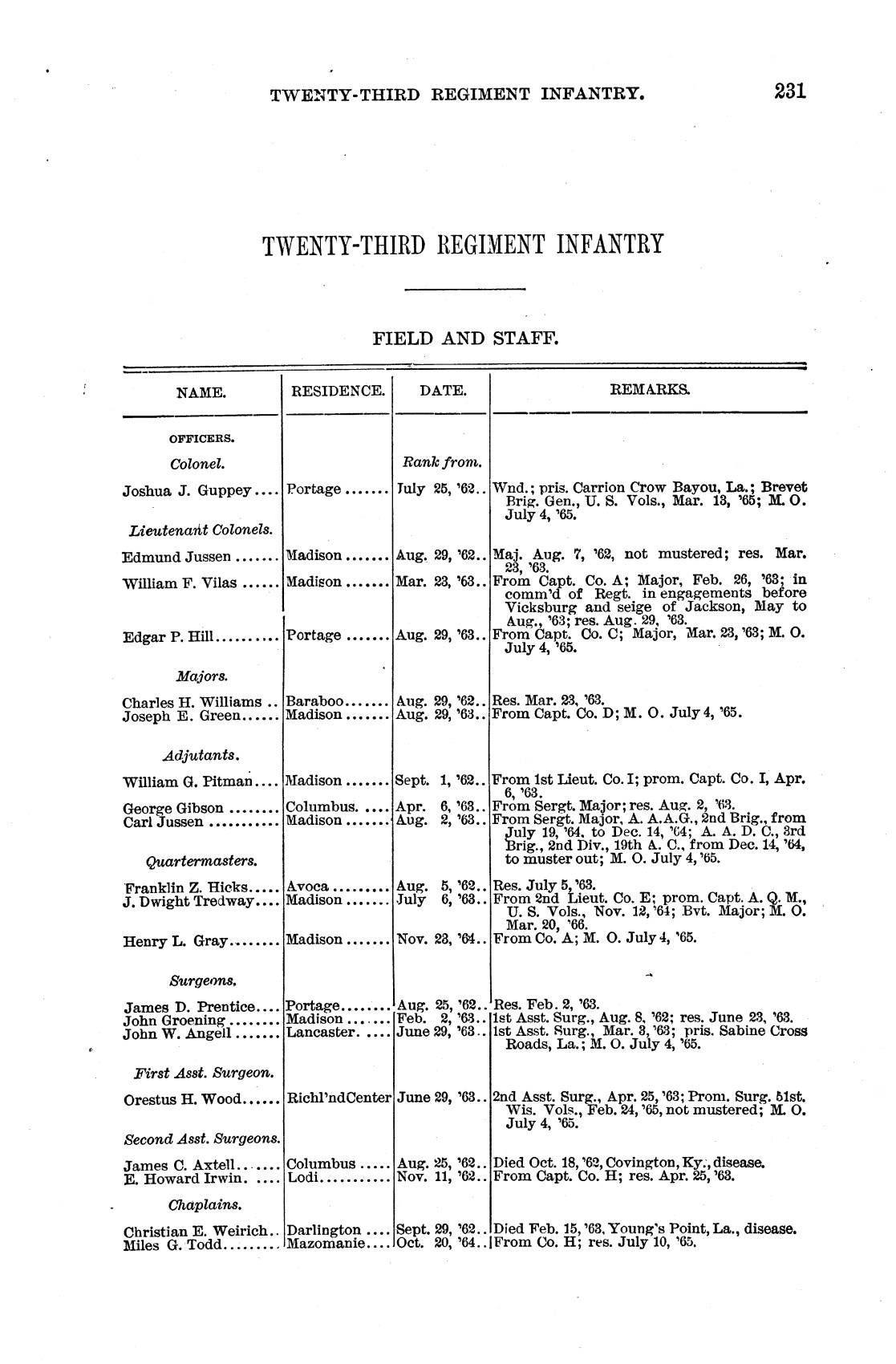
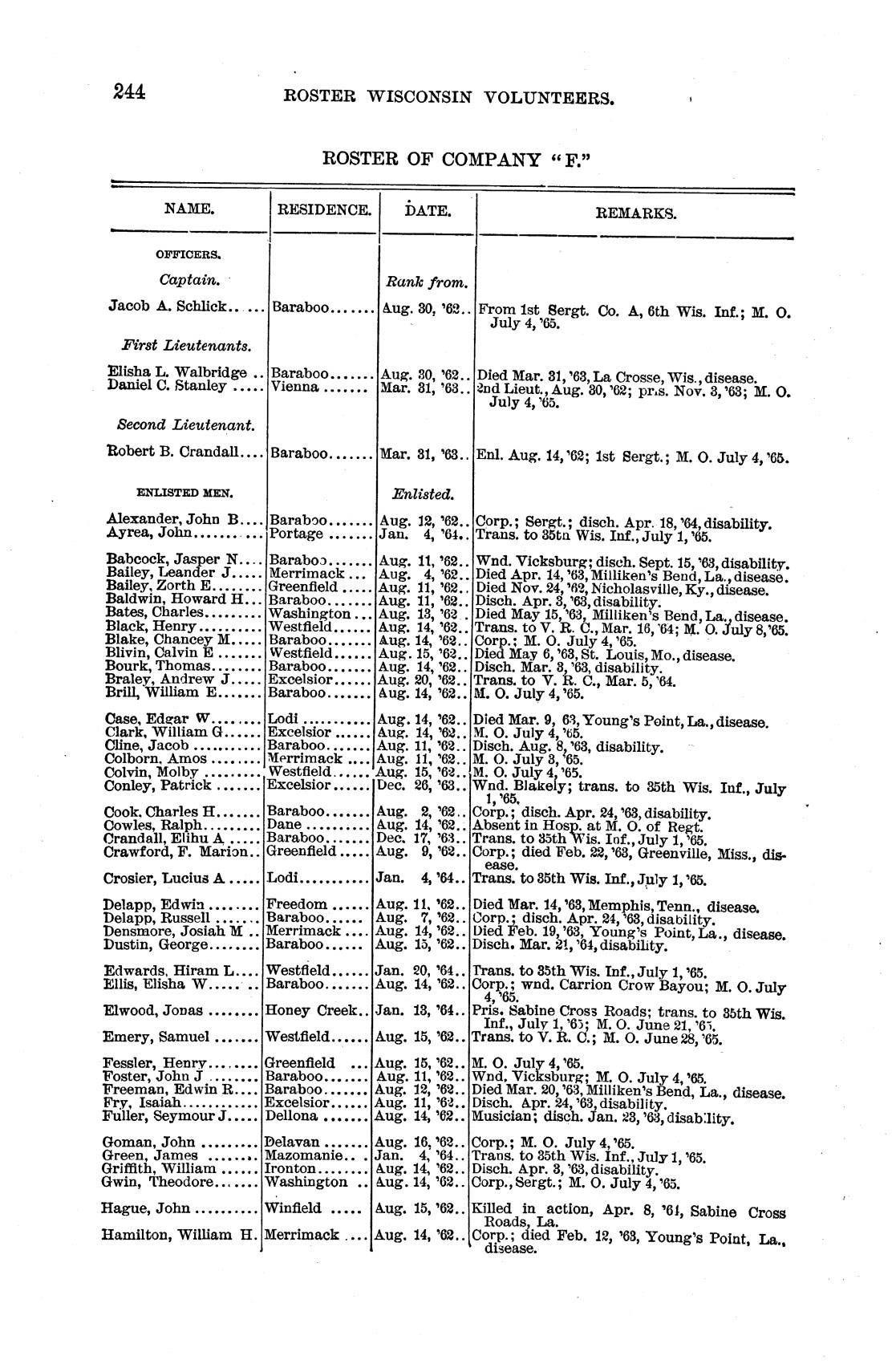
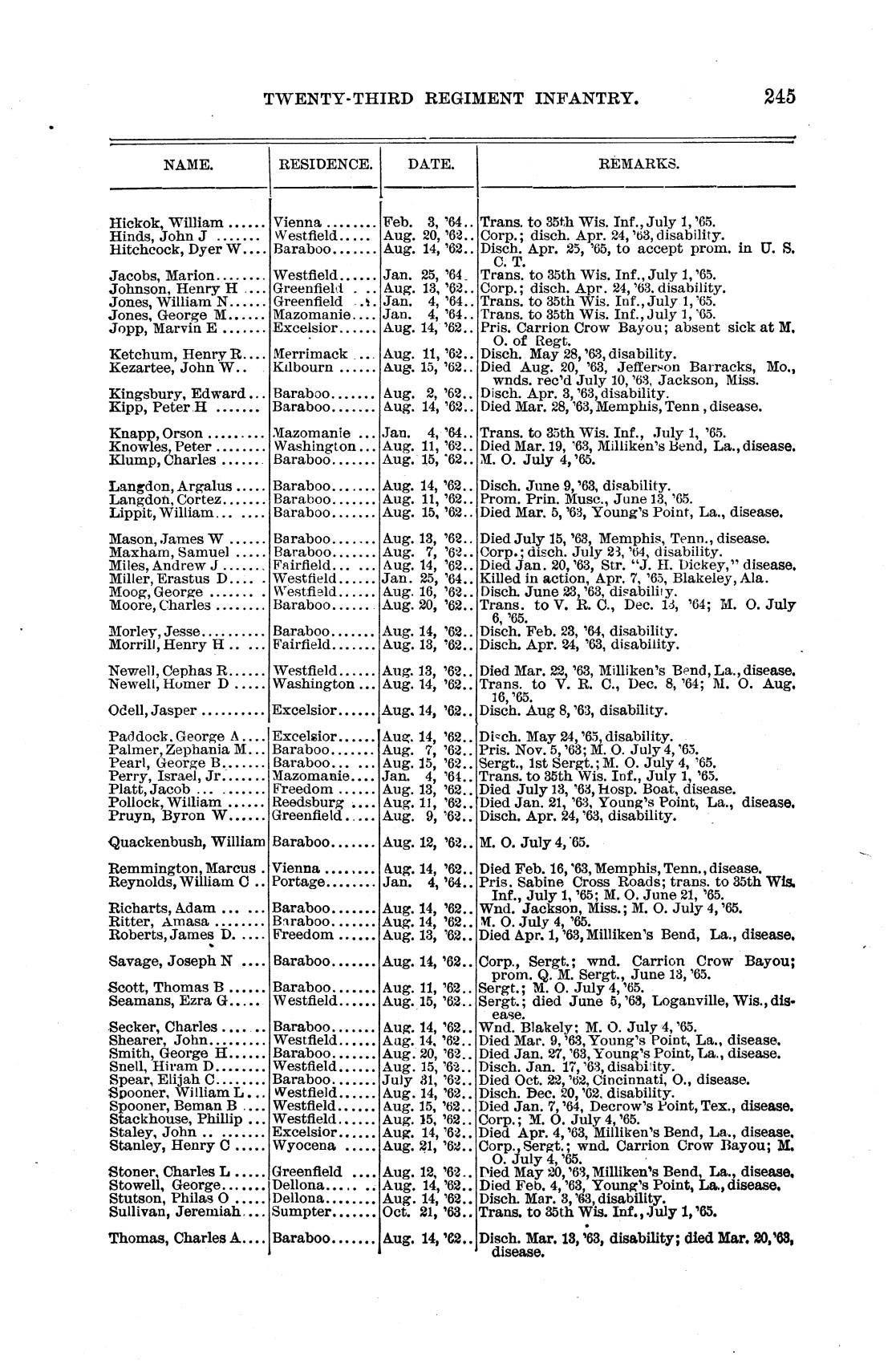
This type of recruiting poster would have been seen all across the North at the beginning of the Civil War.
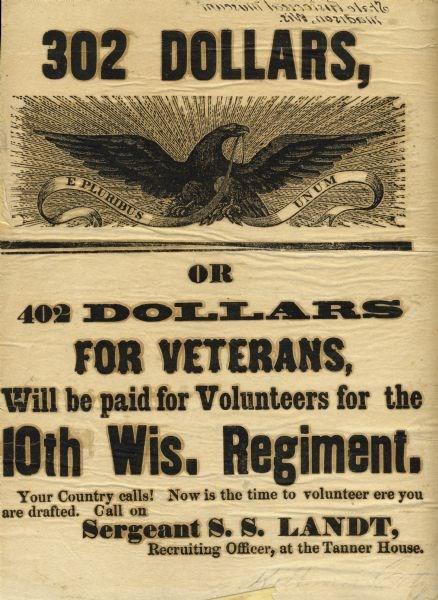
The $302 being offered to new recruits is equivalent to $9,000. in today’s purchasing power. The average salary for a laborer in 1861 would have been $306 for a 60 hour work week.



Lieutenants were second in command of infantry and cavalry companies and artillery batteries. Infantry lieutenants assisted the company captain in their positions behind the line of battle by guiding the troops in their movements and firing. Robert B. Crandall was a Second Lieutenant.
The salary of a Second Lieutenant during the Civil War, was $105.50, which would be equivalent to $3,105 in purchasing power today.
In some early battles soldiers often shot people from their own side. Uniforms at the beginning of the Civil War, however, showed greater variety than would be true later in the conflict. Many men wore whatever they brought from home. Eventually, the uniforms became more standard with the Union army wearing navy colored uniforms and the Confederates wearing grey. The Union uniform consisted of a dark blue wool coat with light blue trousers and a dark cap called a forage cap.

Overview:
Organized at Madison, Wis., and mustered in August 30, 1862. Left State for Cincinnati, Ohio, September 15. Attached to 2nd Brigade, 2nd Division, Army of Kentucky, Dept. of the Ohio, to October, 1862. 1st Brigade, 1st Division, Army of Kentucky, to November, 1862. 1st Brigade, 10th Division, Right Wing 13th Army Corps (Old), Dept. of the Tennessee, to December, 1862. 1st Brigade, 1st Division, Sherman's Yazoo Expedition, to January, 1863. 1st Brigade, 10th Division, 13th Army Corps, Army of the Tennessee, to August, 1863. 1st Brigade, 4th Division, 13th Army Corps, Dept. of the Gulf, to June, 1864. Defenses of New Orleans, La., to August, 1864. 3rd Brigade, 2nd Division, 19th Army Corps, Dept. of the Gulf, August, 1864. Guppy's Brigade, Mobile Bay, Dept. of the Gulf, to October, 1864. District of Eastern Arkansas, 7th Army Corps, Dept. of Arkansas, to February, 1865. 3rd Brigade, 1st Division, Reserve Corps, Military Division West Mississippi, February, 1865. 3rd Brigade, 1st Division, 13th Army Corps (New), Military Division West Mississippi, to July, 1865.
Service:
Duty at Newport, Ky., till October 8, 1862. Moved to Paris, Ky., October 8-15, thence to Lexington and Nicholasville, Ky., October 2231. Moved to Louisville; thence to Memphis, Tenn., November 8-27. Sherman’s Yazoo Expedition December 20, 1862, to January 3, 1863. Expedition from Milliken's Bend to Louisiana & Shreveport Railroads, December 2526. Chickasaw Bayou, December 26-28. Chickasaw Bayou, December 29. Expedition to Arkansas Post, Ark., January 3-10, 1863. Assault on and capture of Fort Hindman, Arkansas Post , January 10-11. Moved to Young's Point, La., January 15, and duty there till March 8. Expedition to Cypress Bend, Ark., February 14 -29. Moved to Milliken's Bend, La., March 8, and duty there till April 25. Movement on Bruinsburg and turning Grand Gulf April 25-30. Battle of Port Gibson , May 1 (Reserve). Battle
of Champion’s Hill, May 16. Big Black River , May 17. Siege of Vicksburg , Miss., May 18July 4. Assaults on Vicksburg May 19 and 22. Advance on Jackson, Miss., July 4-10. Siege of Jackson July 10-17. Camp at Vicksburg till August. Ordered to New Orleans, La., August 24. Expedition to New and Amite Rivers September 24-29. Western Louisiana Campaign October 3-November 30. Carrion Crow Bayou November 3. At New Iberia till December 7. Moved to Berwick, December 7-10. Moved to Brashear City, thence to Algiers and to Matagorda Peninsula, Texas, December 13, 1863January 1, 1864. Reconnaissance on Matagorda Peninsula January 21, 1864. Duty at DeCrow's Point till February 22. Moved to Algiers, La., February 22-26. Red River Campaign March 10-May 22. Advance from Franklin to Alexandria March 14-26. Bayou de Paul, Carroll's Mill, and battle of Sabine Cross Roads, April 8. Monett's Ferry, Cane River Crossing, April 23. At Alexandria April 26-May 13. Construction of dam at Alexandria April 30-May 10. Retreat to Morganza May 13-20. Mansura , May 16. Moved to Baton Rouge May 24, and duty there till July 8. Moved to Algiers, La., July 8, thence to Morganza July 26. Expedition to Mobile Bay August 18-September 2. Operations near Morganza September 16-25. Expedition to Bayou Sara October 3-6. Bayou Sara and Thompson's Creek, near Jackson, October 5. Moved to Helena, Ark., October 10, and duty there till February 23, 1865. Ordered to New Orleans, La., February 23. Campaign against Mobile, Ala., and its defenses March 17-April 12. Siege of Spanish Fort and Fort Blakely March 26-April 8. Assault on and capture of Fort Blakely , April 9. Occupation of Mobile April 12. Duty at and near Mobile till July. Mustered out July 4, 1865.
Regiment lost during service 1 Officer and 40 Enlisted men killed and mortally wounded and 5 Officers and 262 Enlisted men by disease. Total 308.
• Organized at Madison, Wis., and mustered in August 30, 1862.
• Left State for Cincinnati, Ohio, September 15.
• Attached to 2nd Brigade, 2nd Division, Army of Kentucky, Dept. of the Ohio, to October, 1862.
• 1st Brigade, 1st Division, Army of Kentucky, to November, 1862.
• 1st Brigade. 10th Division, Right Wing 13th Army Corps (Old), Dept. of the Tennessee, to December, 1862.
• 1st Brigade, 1st Division, Sherman's Yazoo Expedition, to January, 1863.
• 1st Brigade, 10th Division, 13th Army Corps, Army of the Tennessee, to August, 1863.
• 1st Brigade, 4th Division, 13th Army Corps, Dept. of the Gulf, to June, 1864.
• Defences of New Orleans, La., to August, 1864.
• 3rd Brigade, 2nd Division, 19th Army Corps, Dept. of the Gulf, August, 1864.
• Guppy's Brigade, Mobile Bay, Dept. of the Gulf, to October, 1864.
• District of Eastern Arkansas, 7th Army Corps, Dept. of Arkansas, to February, 1865.
• 3rd Brigade, 1st Division, Reserve Corps, Military Division West Mississippi, February, 1865.
• 3rd Brigade, 1st Division, 13th Army Corps (New), Military Division West Mississippi, to July, 1865
• Duty at Newport, Ky., till October 8, 1862.
• Moved to Paris, Ky., October 8-15, thence to Lexington and Nicholasville, Ky., October 22-31.
• Moved to Louisville, thence to Memphis, Tenn., November 8-27.
• Sherman's Yazoo Expedition December 20, 1862, to January 3, 1863.
• Expedition from Milliken's Bend to Louisiana & Shreveport Railroad December 25-26.
• Chickasaw Bayou December 26-28.
• Chickasaw Bluff December 29.
• Expedition to Arkansas Post, Ark., January 3-10, 1863.
• Assault on and capture of Fort Hindman, Arkansas Post, January 10-11.
• Moved to Young's Point, La., January 15, and duty there till March 8.
• Expedition to Cypress Bend, Ark., February 14-29.
• Moved to Milliken's Bend, La., March 8, and duty there till April 25.
• Movement on Bruinsburg and turning Grand Gulf April 25-30.
• Battle of Port Gibson May 1 (Reserve).
• Battle of Champion's Hill May 16.
• Big Black River May 17.
• Siege of Vicksburg, Miss., May 18-July 4.
• Assaults on Vicksburg May 19 and 22. Advance on Jackson, Miss., July 4-10.
• Siege of Jackson July 10-17.
• Camp at Vicksburg till August.
• Ordered to New Orleans, La., August 24.
• Expedition to New and Amite Rivers September 24-29.
• Western Louisiana Campaign October 3-November 30.
• Carrion Crow Bayou November 3.
• At New Iberia till December 7.
• Moved to Berwick December 7-10.
• Moved to Brashear City, thence to Algiers and to Matagorda Peninsula, Texas, December 13, 1863January 1, 1864.
• Reconnaissance on Matagorda Peninsula January 21, 1864.
• Duty at DeCrow's Point till February 22.
• Moved to Algiers, La., February 22-26.
• Red River Campaign March 10-May 22.
• Advance from Franklin to Alexandria March 14-26.
• Bayou de Paul, Carroll's Mill, and battle of Sabine Cross Roads April 8.
• Monett's Ferry, Cane River Crossing, April 23.
• At Alexandria April 26-May 13.
• Construction of dam at Alexandria April 30-May 10.
• Retreat to Morganza May 13-20.
• Mansura May 16.
• Moved to Baton Rouge May 24, and duty there till July 8.
• Moved to Algiers, La., July 8, thence to Morganza July 26.
• Expedition to Mobile Bay August 18-September 2.
• Operations near Morganza September 16-25.
• Expedition to Bayou Sara October 3-6.
• Bayou Sara and Thompson's Creek, near Jackson, October 5.
• Moved to Helena, Ark., October 10, and duty there till February 23, 1865.
• Ordered to New Orleans, La., February 23.
• Campaign against Mobile, Ala., and its defences March 17-April 12.
• Siege of Spanish Fort and Fort Blakely March 26-April 8.
• Assault on and capture of Fort Blakely April 9.
• Occupation of Mobile April 12.
• Duty at and near Mobile till July. Mustered out July 4, 1865.
Regiment lost during service 1 Officer and 40 Enlisted men killed and mortally wounded and 5 Officers and 262 Enlisted men by disease. Total 308.
All information on this document is from Dyer's reference

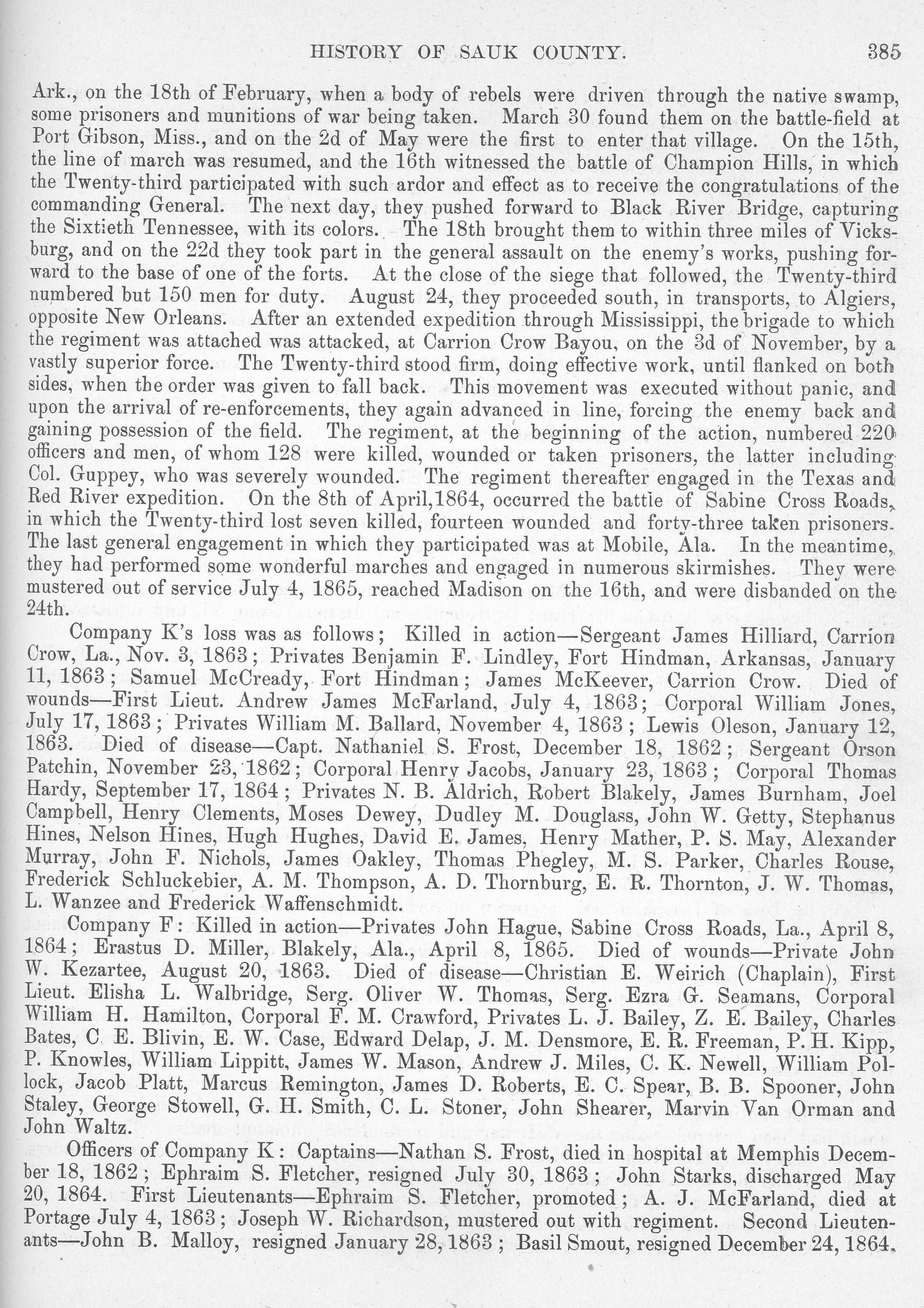


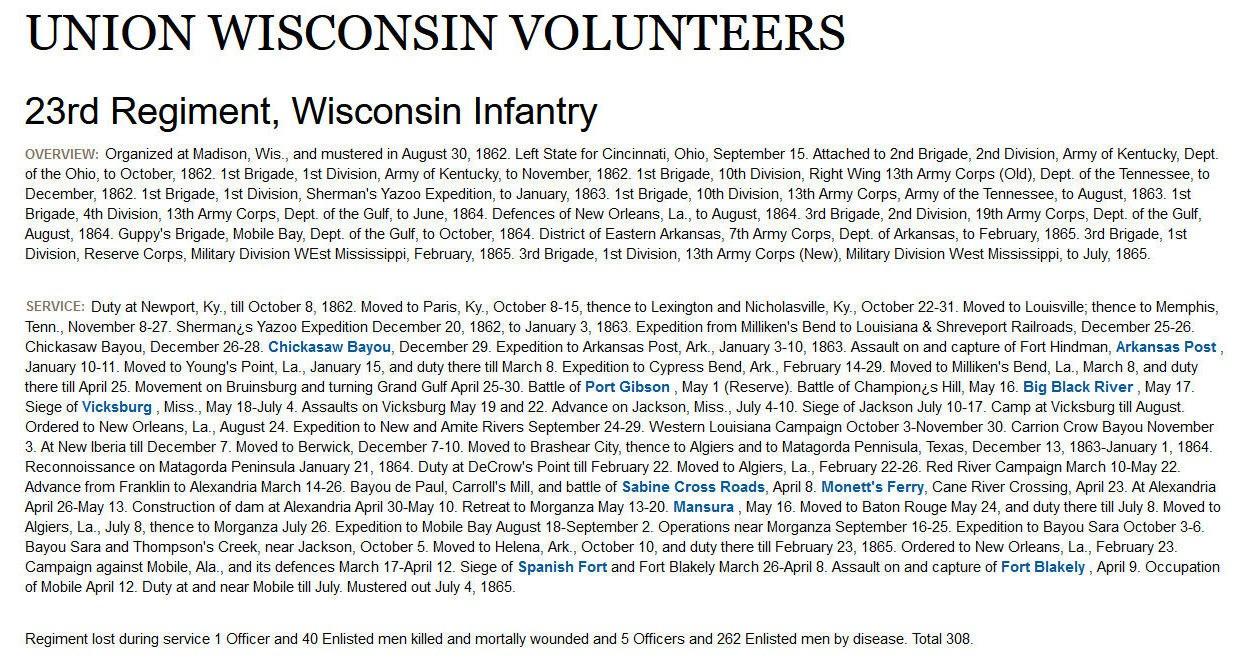
The Battle of Mansfield, also known as the Battle of Sabine Crossroads, on April 8, 1864 in Louisiana formed part of the Red River Campaign during the American Civil War, when Union forces were attempting to occupy the Louisiana state capital, Shreveport.
The Confederate commander, Major General Richard Taylor, chose Mansfield as the place where he would make his stand against the advancing Union army under General Nathaniel Banks. Taylor concentrated his forces at Sabine Crossroads, knowing that reinforcements were nearby. Banks prepared for a fight, though his own army was not fully assembled either. Both sides were reinforced by stages throughout the day. After a brief resistance, the Union army was routed by the Confederates, consisting mainly of units from Louisiana and Texas, reportedly strengthened by hundreds of men breaking parole.
Prelude
During the second half of March 1864, a combined force from the Union Army of the Gulf and navy led by Major General Nathaniel P. Banks, supported by Admiral David Porter's fleet of gunboats, ascended the Red River with the goal of defeating the Confederate forces in Louisiana and capturing Shreveport. By April 1 Union forces had occupied Grand Ecore and Natchitoches. While the accompanying gunboat fleet with a portion of the infantry continued up the river, the main force followed the road inland toward Mansfield, where Banks knew his opponent was concentrating.
Major General Richard Taylor, in command of the Confederate forces in Louisiana, had retreated up the Red River in order to connect with reinforcements from Texas and Arkansas. Taylor selected a clearing a few miles south of Mansfield as the spot where he would take a stand against the Union forces. Sending his cavalry to harass the Union vanguard as it approached, Taylor called his infantry divisions forward.
The morning of April 8 found Banks's army stretched out along a single road through the woods between Natchitoches and Mansfield. When the cavalry at the front of the column found the Confederates taking a strong position along the edge of a clearing, they stopped and called for infantry support. Riding to the front, Banks decided that he would fight Taylor at that spot, and he ordered all his infantry to hurry up the road. It became a race to see which side could bring its forces to the front first.
Confederate
At the start of the battle, Taylor had approximately 9,000 troops consisting of Brigadier General Alfred Mouton's Louisiana/Texas infantry division, Major General John G. Walker's Texas infantry division, Brigadier General Thomas Green's Texas cavalry division, and Colonel William Vincent's Louisiana cavalry brigade.[4] He had also called on the 5,000 men in the divisions of Brigadier General Thomas J. Churchill and Brigadier General Mosby M. Parsons that had been encamped near Keachi, between Mansfield and Shreveport. These troops arrived late in the afternoon, after the battle had commenced.
Anecdotal evidence indicates that there were additional Louisiana men in the ranks. This included paroled soldiers from units that had surrendered at Vicksburg. Historian Gary Joiner claimed that “there may have been from several hundred to several thousand of them. The Confederate Governor of Louisiana, Henry Watkins Allen, had organized two battalions of the state guard and brought them to Taylor's aid, yet the documentary record is unclear as to what role they played in the battle. Joseph Blessington, a soldier in Walker's division, wrote that, “The Louisiana militia, under command of Governor Allen, was held in reserve, in case of an emergency.” In addition, Blessington wrote that, from the surrounding communities, “old men shouldered their muskets and came to our assistance”.
At the start of the battle, the Union forces consisted of a cavalry division commanded by Brigadier General Albert L. Lee, consisting of approximately 3,500 men, and the 4th Division of the XIII Corps, commanded by Colonel William J. Landram, consisting of approximately 2,500 men. During the battle, the 3rd Division of the XIII Corps, commanded by General Robert A. Cameron, arrived with approximately 1,500 men. The battle ended when the pursuing Confederates met the 1st Division of the XIX Corps, commanded by Brigadier
General William H. Emory, with approximately 5,000 men, including the 47th Pennsylvania Infantry, the only regiment from the Keystone State to fight in the Union's 1864 Red River Campaign.[9] Thomas E. G. Ransom commanded the XIII Corps during the engagement, while the XIX Corps was commanded by William B. Franklin.
During the morning, Taylor positioned Mouton's division on the east side of the clearing. Walker's division arrived in the afternoon and formed on Mouton's right. As Green's cavalry fell back from the advancing Union forces, two brigades moved to Mouton's flank and the third to Walker's flank. The Arkansas division arrived around 3:30 pm but was sent to watch a road to the east. The Missouri division did not arrive until around 6:00 pm, after the battle was fought.
At around noon, the Union cavalry division, supported by one infantry brigade of Landram's division, was deployed across a small hill at the south end of the clearing. Shortly thereafter the other brigade of Landram's division arrived. Cameron's division was on its way, but would not get there until the battle had already begun. For about two hours the two sides faced each other across the clearing as Banks waited for more of his troops to arrive and Taylor arranged his men. At that point, Taylor enjoyed a numerical advantage over Banks. At about 4:00 pm, the Confederates surged forward. On the east side of the road, Mouton was killed, while several of his regimental commanders were hit as well and the charge of his division was repulsed. However, west of the road, Walker's Texas division wrapped around the Union position, folding it in on itself. Ransom was wounded trying to rally his men and was carried from the field; hundreds of Union troops were captured and the rest retreated in a panic. As the first Union line collapsed, Cameron's division was arriving to form a second line but it too was pushed back by the charging Confederates, with Franklin wounded as well but remaining on the field in command. For several miles the Confederates pursued the retreating Union troops until they encountered a third line formed by Emory's division. The Confederates launched several charges on the Union line but were repulsed, while nightfall ended the battle.
The Union forces had suffered 113 killed, 581 wounded, and 1,541 captured as well as the loss of 20 cannons, 156 wagons, and a thousand horses and mules, killed or captured. More than half of the Union casualties were from four regiments – 77th Illinois, 130th Illinois, 19th Regiment Kentucky Volunteer Infantry and 48th Ohio. Most of the Union casualties occurred in the XIII Corps, while the XIX Corps lost few men.
Kirby Smith reported that Confederate loss was “about 1,000 killed and wounded” at Mansfield, but precise details of Confederate losses were not recorded. Some of the wounded, perhaps thirty, were taken to Minden for treatment. Those who died of wounds there were interred without markers in the historic Minden Cemetery. They were finally recognized with markers erected on March 25, 2008. The local town of Keachi converted its women's college into a hospital and morgue on its second floor. One hundred soldiers' remains are marked nearby in Keachi's Confederate Cemetery, maintained by the local Sons of Confederate Veterans and Daughters of the Confederacy.
After the Union troops retreated, they fought Confederates again on April 9 at the Battle of Pleasant Hill.
From Wikipedia
- Organized on Aug 30 1862 at Camp Randall, Madison, WI

- Enlistment term: 3 years
- Mustered out on Jul 4 1865 at Mobile, AL
Available statistics for total numbers of men listed as:
- Enlisted or commissioned: 1134
- Drafted: 1
- Killed or died of wounds (Officers): 1
- Killed or died of wounds (Enlisted men): 40
- Died of disease (Officers): 5
- Died of disease (Enlisted men): 262
- Prisoner of war: 75
- Died while prisoner of war: 1
- Disabled: 181
- Missing: 3
- Deserted: 3
- Discharged: 95
- Mustered out: 401
- Transferred out: 145
Twenty-third Infantry WISCONSIN
Twenty-third Infantry. Col., Joshua J. Guppey, Lieut.-Cols., Edmund Jussen William F. Vilas, Edgar P. Hill; Majs., Edmund Jussen, Charles H. Williams, William F. Vilas, Edgar P. Hill, Joseph E. Green.
This regiment was organized at Camp Randall, Madison, in Aug., 1862, and left the state Sept. 15 for Cincinnati, whence it was ordered south to join the army before Vicksburg.
It was with Gen. Sherman in the assault on Chickasaw Bluffs and assisted in the reduction of Arkansas Post. The action of the regiment was the occasion of congratulatory orders from division and brigade commanders. It then proceeded to Young's point, La., near Vicksburg, where three-fourths of the men were stricken with virulent diseases because of adverse sanitary conditions.
The regiment was on scout and foraging work until April 30, 1863. It was brought into reserve at Port Gibson and entered the village the following day - the first Union troops to occupy it. It took the advance of the division at Champion's Hill, doing such effective work as to call forth compliments from the general commanding.
The following day it went into action at the Black River bridge, its brigade capturing the 60th Tenn. and carrying the enemy's works by assault. It reached Vicksburg on the 18th, and participated in the general assault on the 22nd, reaching the base of one of the forts under a heavy fire. It was on duty until the surrender, at which time losses had reduced its numbers to 150 men who were fit for duty.
It participated in the attack on Jackson, and was constantly on duty until the evacuation of that point. It then joined the expedition through Louisiana, going as far as Barre's landing near Opelousas, which it occupied the entire summer.
The return march begun Nov. 1 and two days later a superior force attacked at Carrion Crow bayou, driving two regiments through the 23d's lines. Flanked on both sides, the regiment fell back, formed a new line when reinforced, drove the enemy back in turn and regained the lost ground, receiving for its gallantry the public thanks of the commanding general, though it lost 128 out of 220 engaged.
It reached Brashear City, Dec. 13, and was ordered to Texas, where it remained until Feb. 22, 1864, when it returned to Louisiana. It was in the celebrated Red River expedition, was in the battle of Sabine Cross-Roads, and the action at Cloutierville.
It was in camp at Baton Rouge from May 25 until July 8 and then proceeded to Algiers and Morganza where it remained until Aug. 18. It was transferred to the 3d brigade, 2nd division, 19th army corps, and was engaged in guard, post, garrison and reconnaissance duty until May 1, 1865.
It was then ordered to Mobile, where it was engaged in siege, patrol and picket duty, and short expeditions until July 4th, when it was mustered out.
Its original strength was 994. Gain by recruits, 123; total, 1,117. Loss by death, 289; missing, 1; desertion 6; transfer, 124; discharge, 281; mustered out, 416.
Source: The Union Army, vol. 4, p. 59
Report of Col. Joshua J. Guppey, Twenty-third Wisconsin Infantry, including operations to May 22.
SIR: I have the honor to submit the following report of the part taken by this regiment in the battles that have taken place since the army landed in the State of Mississippi:
On May 1 last, the regiment, after marching the entire night preceding, was formed as a part of the reserve in the battle of Port Gibson. In the forenoon, by order of Gen. Burbridge, it supported Foster's Wisconsin battery and Sheldon's brigade, Gen. Osterhaus' division, in several advances. In the afternoon it rejoined the brigade and took the advance on the right of the line.
Later in the day it was deployed as skirmishers, drove the enemy from the woods toward Port Gibson, took 20 prisoners, and destroyed a large quantity of small-arms.
On the morning of May 2, the regiment was in line of battle at 2 a.m., and at daylight took the advance toward Port Gibson, having the honor of being the first regiment which entered the city, and which gave the first cheer for our national flag, raised over it by Gen. Burbridge. During the day the regiment did duty as provost guard.
On May 16, the regiment was engaged in the battle of Midway Hill. In the evening five companies were deployed as skirmishers, and afterward two companies were added to them. They did most efficient service in driving the enemy's skirmishers and gaining knowledge of his position. Capts. Greene and Bull, who each commanded parties, displayed excellent conduct and judgment, and are entitled to great credit for their skill and bravery. Two companies of the enemy's skirmishers were literally cut to pieces, if the account of prisoners afterward taken may be believed.
In the afternoon the regiment was placed in reserve and did little, except make an advance under a heavy fire from the enemy's artillery, to support the Eighty-third Ohio and Sixty-seventh Indiana. I believe the advance was made in a manner which met the approval of the general commanding.
On May 17, the regiment took part in the battle of Black River Bridge, and constituted the reserve, when the Sixtieth Tennessee Regiment surrendered to the brigade; three hundred and sixty stand of arms captured, the destruction of which was assigned to this regiment, and they were accordingly destroyed under my supervision.
HDQRS. TWENTY-THIRD REGIMENT WISCONSIN VOLS., Near Vicksburg, Miss., May 25, 1863.I have little to say of the affairs which took place under the walls of the forts near this city on the 20th and 22d instant. Whatever name may be given to them, they were, in reality, nothing more than reconnaissance's in force, and should be so regarded.
On the 20th, my whole regiment was deployed as skirmishers, and did their duty most gallantly. Lieut. A. J. McFarlane was wounded severely while leading his men against the enemy, who were concealed in the fallen timber in front of one of their forts. Later in the day Lieutenant Bull was wounded.
On the 22d, the brigade aided in shutting up a large number of the enemy in one of their forts so closely that they could neither discharge their cannon nor their small-arms. Here Lieutenant Starks was wounded, and Sergeants [Judson A.] Lewis, Company C, and [Daniel] Eder, Company D, were killed. Our gallant soldiers seemed determined to get inside the fort by some means. Not being able to scale its walls, they tried to dig them down, and not succeeding in this, they hailed with cheers the cannon which had been ordered up, and two of the companies of my regiment (B and E) dragged it up the hill to the walls of the fort, where it was most vigorously served. It was too late in the day, however, to accomplish the desired result. Heavy reenforcements poured in to aid the enemy, and all that we could do was, with the aid of a covering brigade, to retire in good order. The fire of musketry was the hottest that I have ever seen, and the bravery of our soldiers under it is beyond all praise.
All of my officers behaved with distinguished gallantry. Lieut.-Col. Vilas and Maj. Hill proved themselves to be brave and skillful leaders, and handled the men entrusted to their charge with much skill.
Being in command of the reserve, my work principally consisted in guarding against attempts of the enemy to turn our right flank, several of which were made, and all of which failed.
Our total killed, wounded, and missing in these engagements were:
Very respectfully, your obedient servant, J. J. GUPPEY, Col., Commanding.
Lieut. R. CONOVER, Acting Assistant Adjutant-Gen.
Source: Official Records CHAP. XXXVI.] BATTLE OF CHAMPION'S HILL, MISS. PAGE 38-37 [Series I. Vol. 24. Part II, Reports. Serial No. 37.]
From the collection of Beverly Cabbage
October 2020

Lieut. Robert B. Crandall has participated in the Battles of Port Gibson, Champion Hills, Black River Bridge, Seige (sic) of Vicksburg & Jackson, Carrion Crow Bayou, Sabine Cross Roads, Cane River, Jackson, La, and Seige (sic) of Spanish Fort & Blakely, Ala. J.J. Guppey, Col 23 Wis Volit.
Col. Guppey was commissioned an officer in the Union Army in 1861 and was assigned to the 10th Wisconsin Volunteer Infantry Regiment. In 1862, he was promoted to Colonel and assumed command of the 23rd Wisconsin Volunteer Infantry Regiment at Camp Randall. The regiment, with Guppey in command, later took part in the Battle of Fort Hindman and the Battle of Champion Hill. Guppey later contracted malaria and suffered a wound in battle that incapacitated him for a time. Afterwards, he took part in the Red River Campaign. In 1865, he participated in the Battle of Fort Blakely. Guppey was mustered out of the volunteers on July 4, 1865. On January 13, 1866, President Andrew Johnson nominated Guppey for appointment to the grade of brevet brigadier general of volunteers to rank from March 13, 1865, and the United States Senate confirmed the appointment on March 12, 1866. After the war, Guppey was active in the Wisconsin Army National Guard until retiring in 1893.
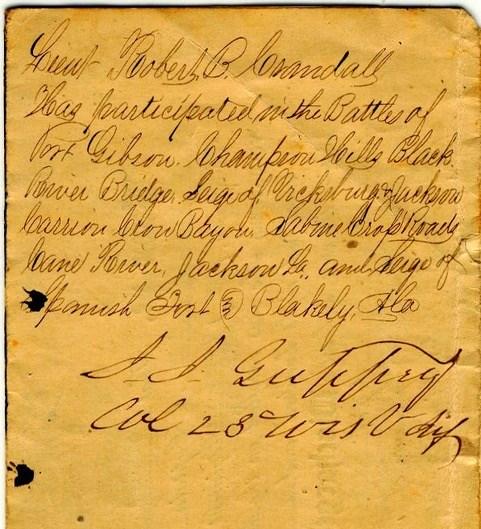
From the collection of the Wisconsin Veterans Museum
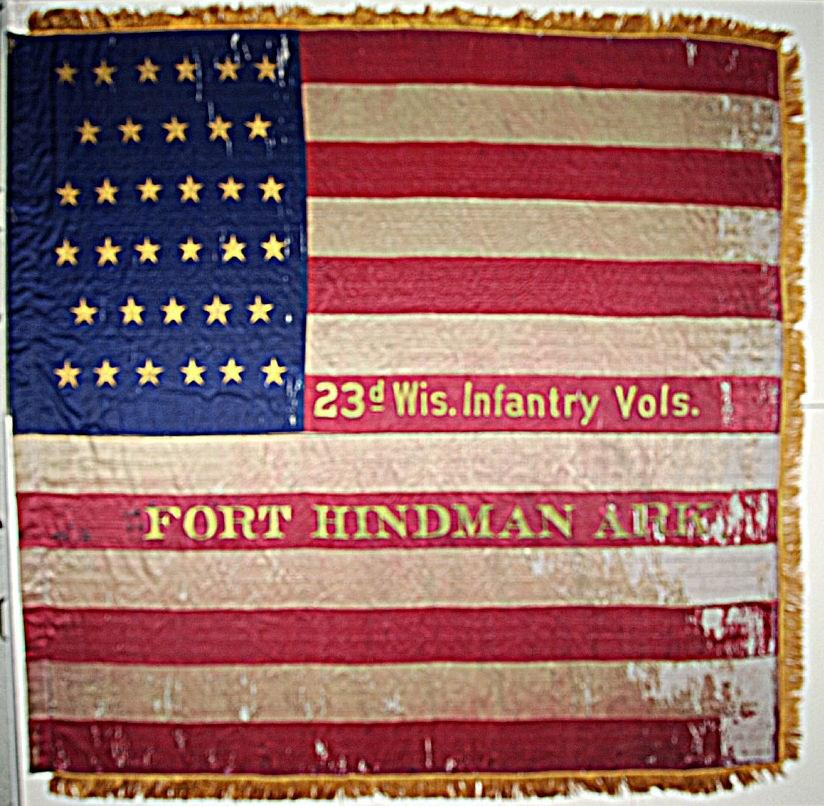
Many corps, divisions, brigades, regiments, and even individual companies carried unique flags, many of them designed and sewn by women "back home" who presented the unit with the flag. In a number of cases, the state seal of a regiment would be embroidered or painted onto a flag. A unit that performed well in a battle might get permission to add the name of that battle on its flag, and veteran units might have a halfdozen or more battle names on their banners.

The Battle of Arkansas Post, also known as Battle of Fort Hindman, was fought from January 9 until 11, 1863, near the mouth of the Arkansas at Arkansas Post, as part of the Vicksburg Campaign of the American Civil War. Although a Union victory, it did not move them any closer to Vicksburg
The Confederate States Army constructed a large, four-sided earthwork fortification near Arkansas Post, on a bluff 25 feet above the north side of the river, forty-five miles downriver from Pine Bluff, to protect the Arkansas River and prevent Union Army passage to Little Rock. The fort commanded a mile view up and downriver. It was a base for disrupting shipping on the Mississippi River. The fort was named Fort Hindman in honor of General Thomas C. Hindman of Arkansas. It was manned by approximately 5,000 men, primarily Texas cavalry, dismounted and redeployed as infantry, and Arkansas infantry, in three brigades under Brig. Gen. Thomas J. Churchill. By the winter of 1862–63, disease and their life at the end of a tenuous supply chain had left the garrison at Fort Hindman in a poor state.
Union Maj. Gen. John A. McClernand was an ambitious politician and had permission from President Abraham Lincoln to launch a corps-sized offensive against Vicksburg from Memphis, Tennessee, hoping for military glory (and subsequent political gain). This plan was at odds with those of Army of the Tennessee commander, Maj. Gen. Ulysses S. Grant. McClernand ordered Grant's subordinate, Maj. Gen. William T. Sherman, to join the troops of his corps with McClernand's, calling the two corps the Army of the Mississippi, approximately 33,000 men. On January 4, he launched a combined army-navy movement on Arkansas Post, rather than Vicksburg, as he had told Lincoln (and did not bother to inform Grant or the general in chief, Maj. Gen. Henry W. Halleck).
January 9
Union boats began landing troops near at Notrebe's Plantation, 3 miles below Arkansas Post in the evening of January 9. The troops started up river towards Fort Hindman and Sherman's corps overran the Confederate trenches. The enemy retreated to the protection of the fort, anchored on the east by the Arkansas River, and adjacent rifle-pits running west across the neck of land. By 11:00 am the following morning the remainder of the Union army had gone ashore. Churchill was stunned by the overwhelming size of the Union force and immediately requested reinforcements from his superior, Theophilus H. Holmes. Holmes advised Churchill to “... hold out till help arrived or until all dead.”
On January 10 the Union army moved upriver to fully invest the Confederate garrison. Two brigades from Peter J. Osterhaus' division of George W. Morgan's corps were detached from the main movement of the army. Colonel Daniel W. Lindsey's brigade was put ashore on the riverbank opposite the fort and Colonel John F. De Courcey's brigade was held in reserve near the initial landing site. Morgan advanced Osterhaus (accompanying his remaining brigade) along the levee of the river followed by his remaining division under Andrew J. Smith. Sherman followed with David Stuart's division along the river and sent his other division under Frederick Steele inland to find a flanking route, but failed due to swampy land and impassable roads.[3] The advance of Morgan's column overran the first line of Confederate trenches manned largely by dismounted Texas cavalry.
As McClernand's soldiers moved against the fort, Porter's gunboats; Baron DeKalb, Louisville, and Cincinnati, moved against the fort. The Navy pounded the fort at a range of 400 yards. The Union tinclad Rattler moved in too close, ran aground and took heavy fire at point blank range from the fort. After several hours the Naval bombardment had inflicted heavy losses to the Confederate artillery. Meanwhile, McClernand sent an army lieutenant up a tree to observe if Morgan and Sherman's troops were in place. The lieutenant reported they were in place and ready to assault, but Sherman's troops were still moving into position through muddy swamps. By the time the Navy's attack concluded it was too dark for the infantry to assault although some skirmishing had taken place.
On the morning of January 11 McClernand's forces were deployed in an arc facing Fort Hindman and its riflepits. Running West to East were the divisions of Steele, Stuart, Smith with Osterhaus anchored on the Arkansas River. Churchill's defenses were manned by Colonel James Deshler's brigade on the left and Colonel Robert Garland's brigade on the right. McClernand's infantry attacked around 1:00pm and made little progress at first. At the same time Porter's gunboats moved in to attack aided by Colonel Lindsey's brigade across the river. Within an hour the fort's east face was reduced to rubble and its artillery silenced. Steele's attack on the west was led by the brigades of Brig. Gens. Charles E. Hovey and John M. Thayer with Francis P. Blair, Jr. in reserve. To the east Stuart supported with the brigades of Colonels Giles Smith and Thomas Kilby Smith against the rifle pits of Deshler's Arkansas and Texas soldiers. In the center A.J. Smith spearheaded his attack with Brig. Gen. Stephen G. Burbridge's brigade supported by Colonel William J. Landram. Burbridge's men became embroiled in small arms fight which caused more than 1/3 of all Union casualties. Osterhaus advanced against the fort with Colonel Lionel A. Sheldon's single brigade.
At 4:30pm McClernand was planning to order one massive assault against the defenders when white flags of surrender began to appear. The battle ended with some confusion. Porter's gunboats picked up infantry from Lindsey's brigade and ferried them across the river who climbed into the crumbling remains of Fort Hindman. Porter personally accepted the surrender of Colonel John Dunnington who was in charge of the fort's artillery. General Steele entered the rifle-pits under a flag of truce to discuss surrender with Colonel Deshler. As the two conferred, Deshler noticed Steele's men continually moving closer and demanded they be ordered to stop or he'd open fire again. General Sherman arrived on the scene to personally seek out Churchill. However, Sherman stood by as Churchill and Colonel Garland became involved in an argument over surrendering. Garland claimed he had been ordered to surrender while Churchill denied giving such an order. Colonel Deshler rode up from his front and declared to the group he had not surrendered at all and insisted on renewing the fight. Sherman ended the argument by pointing out the Union forces had all but occupied the Confederate's works. Some Union soldiers had even begun disarming the Confederates. One final scene took place as a Union staff officer rode into the fort and demanded the Navy vacate, so A.J. Smith's infantry could take possession. However, the fort had already been surrendered to Porter. Colonel Dunnington, who had a background in the Navy, conceded a small satisfaction at being able to surrender to a fellow Naval officer instead of the infantry.
The defeat at Arkansas Post cost the Confederacy fully one-fourth of its deployed force in Arkansas, the largest surrender of Rebel troops west of the Mississippi River prior to the final capitulation of the Confederates in 1865. Union forces suffered 1,061 casualties, with 134 killed; Confederate 4,900, almost all by surrender. Although Union losses were high and the victory did not contribute to the capture of Vicksburg, it did eliminate one more impediment to Union shipping on the Mississippi. Grant was furious at McClernand's diversion from his overall campaign strategy, ordered him back to the Mississippi, disbanded the Army of the Mississippi, and assumed personal command of the Vicksburg Campaign.
“Glorious! Glorious! My star is ever in the ascendant. Now, on to Little Rock.” John A. McClernand responding to the victory
That Grant removed McClernand for this reason is a contested point. In his Memoirs (Loc 5013), Gen. W.T. Sherman said that no word was received from Grant until after the battle. On the 13th - when the army rendezvoused at the mouth of the Arkansas River after destroying the fort - McClernand showed Sherman the letter in which Grant disapproved of the plan. Sherman notes that Grant's letter was written before the outcome of the battle was known: “When informed of this, and of the promptness with which it had been executed, he could not but approve.”
The Battle of Port Gibson was fought near Port Gibson, Mississippi, on May 1, 1863, between Union and Confederate forces during the Vicksburg Campaign of the American Civil War. The Union Army was led by Maj. Gen. Ulysses S. Grant, and was victorious.
Grant launched his campaign against Vicksburg, Mississippi, in the spring of 1863, starting his army south from Milliken's Bend on the west side of the Mississippi River. He intended to storm Grand Gulf, while his subordinate Maj. Gen. William T. Sherman deceived the main army in Vicksburg by feigning an assault on the Yazoo Bluffs. Grant would then detach the XIII Corps to Maj. Gen. Nathaniel P. Banks at Port Hudson, Louisiana, while Sherman hurried to join Grant and James B. McPherson for an inland move against the railroad. The Union fleet, however, failed to silence the Confederate batteries at Grand Gulf. Grant then sailed farther south and began crossing at Bruinsburg, Mississippi, on April 30. Sherman's feint against the Yazoo Bluffs the Battle of Snyder's Bluff was a complete success, and only a single Confederate brigade was detached south.
The only Confederate cavalry in the area, Wirt Adams's regiment, had been ordered away to pursue Grierson's raiders, and Maj. Gen. John S. Bowen performed a reconnaissance in force to determine Grant's intentions. Bowen moved south from Grand Gulf with Green's Brigade and took up a position astride the Rodney road just southwest of Port Gibson near Magnolia Church. A single brigade of reinforcements from Vicksburg under Brig. Gen. Edward D. Tracy arrived later and was posted across the Bruinsburg Road two miles north of Green's position. Baldwin's Brigade arrived later and was positioned in support of Green's Brigade. Onehundred-foot-tall (30 m) hills separated by nearly vertical ravines choked with canebrakes and underbrush rendered Bowen's position tenable, despite the overwhelming Union force heading his way.
The absence of any Confederate cavalry would have a major impact on the campaign. If Bowen had known that Grant's men were landing at Bruinsburg and not Rodney, he would have taken a position on the bluffs above Bruinsburg, denying Grant's army a bridgehead into the area. Federal efforts to push rapidly inland were slowed because Maj. Gen. John A. McClernand had forgotten to issue rations to the men. Despite the resulting delay, however, the Army of the Tennessee moved onto the river bluffs unopposed and pushed rapidly towards Port Gibson. Shortly after midnight on May 1, advanced elements of the 14th Division under Brig. Gen. Eugene A. Carr engaged Confederate pickets near the Shaifer House. Sporadic skirmishing and artillery fire continued until 3 a.m. Wary of Tracy's Brigade to the north, McClernand posted Brig. Gen. Peter J. Osterhaus's 9th Division facing that direction. Having developed each other's positions, the opposing forces sat down and waited for daylight.
General Carr scouted the ground before him and realized that a frontal assault through the canebrakes would be fruitless. He devised a turning movement in which one brigade would move slowly forward through the canebrake, while the second brigade would descend into the Widow's Creek bottoms and strike for the Confederates' left flank. Brig. Gen. Alvin P. Hovey's 12th Division arrived and surged forward just as Carr's men were storming the Confederate position. Both flanks were turned, and Green's men broke and ran. McClernand stopped to reorganize, then launched into a series of grandiose speeches until Grant pointed out that the Confederates had simply withdrawn to a more defendable position. Reinforced by Brig. Gen. A. J. Smith's 10th Division and Stevenson's Brigade of McPherson's XVII Corp, McClernand resumed the pursuit. With 20,000 men crowded into a 1.5-mile (2.4 km) front, McClernand's plan appeared to be to force his way past the Confederate line. A flanking assault by Col. Francis Cockrell's Missourians crumpled the Federal right flank and gave McClernand pause. Sundown found the two sides settling into a stalemate along a broad front on the Rodney Road several miles from Port Gibson.
On the Bruinsburg Road front, Osterhaus had been content to pressure Tracy's command with federal sharpshooters and artillery, occasionally launching an unsupported regiment against the Confederate line. Maj. Gen. James B. McPherson showed up late in the afternoon with John E. Smith's brigade. Donning a cloak to disguise his rank, he reviewed the front lines and quickly devised a turning movement that would render untenable the entire Confederate right flank. Twenty minutes after the troops had been staged for the assault, the Confederates were retreating into the Bayou Pierre bottoms, having left behind several hundred prisoners. The road to his rear now threatened, Bowen commenced retreating through Port Gibson to the north shore of Bayou Pierre.
On May 2, Grant quickly maneuvered Bowen out of position by sending McPherson to cross the Bayou Pierre at a ford several miles upstream. Struck with the realization that McPherson could cut him off from the bridge over the Big Black River, Bowen ordered the formidable defenses at Grand Gulf abandoned, the magazine exploded, and the heavy artillery destroyed. Union gunboats, investigating the nature of the explosion, arrived and took Grand Gulf without a shot. Grant understood the nature of the explosion and rode to Grand Gulf with a small escort, enjoying his first bath in weeks, and celebrating the capture of what would become his central supply depot as he moved inland. As he relaxed, he caught up on correspondence, including a message from Banks that he was nowhere near Port Hudson. Grant's plan to detach McClernand to Banks would have to wait.
Too late to do anything more than affirm Bowen's decision, Maj. Gen. William W. Loring arrived and took command. Heavy rear-guard activity took place as the Confederates scrambled to remove their force across the narrow bridge. Advanced elements of the XVII Corps arrived in time to save the bridge from destruction. The ragtag army that had fought so well at Port Gibson would not rest until they had entered the Warrenton fortifications nearly ten miles away. Here they began improving the fortifications along the roads to Vicksburg, expecting that Grant would be close behind. Grant, however, would have other plans; the roads on the west bank of the Big Black River were open all the way to the Mississippi state capital and the critical rail link to Vicksburg. Against this target, Grant poised his army to strike.


The Battle of Jackson, fought on May 14, 1863, in Jackson, Mississippi, was part of the Vicksburg Campaign in the American Civil War. Union commander Maj. Gen. Ulysses S. Grant and the Army of the Tennessee defeated elements of the Confederate Department of the West, commanded by General Joseph E. Johnston, seizing the city, cutting supply lines, and opening the path to the west and the Siege of Vicksburg.
On May 9, Gen. Johnston received a dispatch from the Confederate Secretary of War directing him to “proceed at once to Mississippi and take chief command of the forces in the field.” As he arrived in Jackson on May 13, from Middle Tennessee, he learned that two army corps from the Union Army of the Tennessee the XV, under Maj. Gen. William Tecumseh Sherman, and the XVII, under Maj. Gen. James B. McPherson were advancing on Jackson, intending to cut the city and the railroads off from Vicksburg, Mississippi which was a major port on the Mississippi River. These corps, under the overall command of Grant, had crossed the Mississippi River south of Vicksburg and driven northeast toward Jackson. The railroad connections were to be cut to isolate the Vicksburg garrison. And if the Confederate troops in Jackson were defeated, they would be unable to threaten Grant's flank or rear during his eventual assault on Vicksburg.
Johnston consulted with the local commander, Brig. Gen. John Gregg, and learned that only about 6,000 troops were available to defend the town. Johnston ordered the evacuation of Jackson, but Gregg was to defend Jackson until the evacuation was completed. By 10 a.m., both Union army corps were near Jackson and had engaged the enemy. Rain, Confederate resistance, and poor defenses prevented heavy fighting until around 11 a.m., when Union forces attacked in numbers and slowly but surely pushed the enemy back. In mid-afternoon, Johnston informed Gregg that the evacuation was complete and that he should disengage and follow.[1]
Soon after, Union troops entered Jackson and had a celebration in the Bowman House, hosted by Grant, who had been traveling with Sherman's corps. They then burned part of the town and cut the railroad connections with Vicksburg. Johnston's evacuation of Jackson was premature because he could, by late on May 14, have had 11,000 troops at his disposal and by the morning of May 15, another 4,000. The fall of the former Mississippi state capital was a blow to Confederate morale.
General Sherman appointed Brig. Gen. Joseph A. Mower to the position of military governor of Jackson and ordered him to destroy all facilities that could benefit the war effort. With the discovery of a large supply of rum, it was impossible for Mower's Brigade to keep order among the mass of soldiers and camp followers, and many acts of pillage took place. Grant left Jackson on the afternoon of May 15 and proceeded to Clinton, Mississippi. On the morning of May 16 he sent orders for Sherman to move out of Jackson as soon as the destruction was complete. Sherman marched almost immediately, clearing the city by 10 a.m.. By nightfall on May 16, Sherman's corps reached Bolton, Mississippi, and the Confederacy had reoccupied what remained of Jackson. Jackson had been destroyed as a transportation center and the war industries were crushed. But more importantly the Confederate concentration of men and materials aimed at saving Vicksburg were scattered. Sherman would later lead an expedition against Jackson following the fall of Vicksburg to clear Johnston's relief force from the area.
The Battle of Champion Hill of May 16, 1863, was the pivotal battle in the Vicksburg Campaign of the American Civil War (1861–1865). Union Army commander Maj. Gen. Ulysses S. Grant and the Army of the Tennessee pursued the retreating Confederate States Army under Lt. Gen. John C. Pemberton and defeated it twenty miles to the east of Vicksburg, Mississippi, leading inevitably to the Siege of Vicksburg and surrender. The battle is also known as Baker's Creek
Following the Union occupation of Jackson, Mississippi, on May 14, both Confederate and Federal forces made plans for future operations. General Joseph E. Johnston, commanding all Confederate forces in Mississippi, retreated with most of his army up the Canton Road. However, he ordered Lt. Gen. John C. Pemberton, commanding three divisions totaling about 23,000 men, to leave Edwards Station and attack the Federals at Clinton. Pemberton and his generals felt that Johnston's plan was likely to result in disaster and decided instead to attack the Union supply trains moving from Grand Gulf to Raymond. On May 16, however, Pemberton received another message from Johnston repeating his former orders. Pemberton had already started after the supply trains and was on the Raymond-Edwards Road, with his rear at a crossroads one-third mile south of the crest of Champion Hill. When he obediently ordered a countermarch, his rear, including his supply wagons, had become the vanguard of his attack.
Around 7 am on May 16, Union forces engaged the Confederates and the Battle of Champion Hill began. Pemberton's force formed into a three-mile (5 km)-long defensive line that ran southwest to northeast along a crest of a ridge overlooking Jackson Creek. Grant wrote in his Personal Memoirs, “... where Pemberton had chosen his position to receive us, whether taken by accident or design, was well selected. It is one of the highest points in that section, and commanded all the ground in the range.”
Pemberton was unaware that one of the three Union columns was moving along the Jackson Road against his unprotected left flank on Champion Hill. Pemberton posted Brig. Gen. Stephen D. Lee's Alabama brigade on Champion Hill where they could watch for a Union column reported moving on the crossroads. Lee soon spotted the Union troops and they in turn saw him. If the enemy force was not stopped, it would cut the Confederates off from their Vicksburg base. Pemberton was warned of the Union movement and sent troops to defend his left flank. Union forces at the Champion House moved into action and their artillery began firing.
When Grant arrived at Champion Hill at about 10:00 a.m., he ordered an attack to begin. John A. McClernand's corps attacked on the left and James B. McPherson's on the right. William T. Sherman's corps was well behind the others, departing from Jackson. By 11:30 a.m., the Union forces had reached the Confederate's main line. At 1:00 p.m., they took the crest, the troops from Carter L. Stevenson's division retiring in disorder. McPherson's corps swept forward, capturing the crossroads and closing the Jackson Road escape route. The division of John S. Bowen counterattacked in support of Stevenson, pushing the Federals back beyond the Champion Hill crest before their surge was halted. However, they were too few to hold the position. Pemberton directed William W. Loring to send forces from the southern area of the line, where they were only lightly engaged with McClernand's ineffective attack, to reinforce the Hill. However, Loring refused to budge, citing a strong Union presence to his front.
Grant now counterattacked, committing his forces that had just arrived from Clinton by way of Bolton. Pemberton's men could not resist this assault, and he ordered his men to use the one escape route still open, the Raymond Road crossing of Bakers Creek. By now, Loring had decided to obey Pemberton's order and was marching toward the fighting by a circuitous route that kept them out of action. Brig. Gen. Lloyd Tilghman's brigade formed the rearguard and held at all costs, including the death of Tilghman, killed by artillery fire. Late in the afternoon, Grant's troops seized the Bakers Creek Bridge, and by midnight they had occupied Edwards. The Confederates fell back to a defensive position at the Big Black River in front of Vicksburg. The Battle of Big Black River Bridge the next day would be the final chance for Pemberton to escape.
Champion Hill was a bloody and decisive Union victory. In his Personal Memoirs, Grant observed, “While a battle is raging, one can see his enemy mowed down by the thousand, or the ten thousand, with great composure; but after the battle these scenes are distressing, and one is naturally disposed to alleviate the sufferings of an enemy as a friend.”
Grant criticized the lack of fighting spirit of McClernand, a rival for Union Army leadership, because he had not killed or captured Pemberton's entire force. McClernand's casualties were low on the Union left flank (south); McPherson's on the right constituted the bulk of the Union losses, about 2,500. The Confederates suffered about 3,800 casualties. According to diarist William Eddington, so many Confederate horses had been killed, Union soldiers could not easily approach the abandoned batteries; after the Battle of Big Black River Bridge, Union horses were sent back to recover them. The Confederates' effective loss included most of Loring's division, which had marched off on its own to join Joseph E. Johnston in Jackson.


SIR: I have the honor to submit the following report of the part taken by this regiment in the battles that have taken place since the army landed in the State of Mississippi [only portions related to the Battle of Champion Hill are included by the editor]:
On May 16, the regiment was engaged in the battle of Midway Hill. In the evening five companies were deployed as skirmishers, and afterward two companies were added to them. They did most efficient service in driving the enemy's skirmishers and gaining knowledge of his position. Captains Greene and Bull, who each commanded parties, displayed excellent conduct and judgment, and are entitled to great credit for their skill and bravery. Two companies of the enemy's skirmishers were literally cut to pieces, if the account of prisoners afterward taken may be believed.
In the afternoon the regiment was placed in reserve and did little, except make an advance under a heavy fire from the enemy's artillery, to support the Eighty-third Ohio and Sixty-seventh Indiana. I believe the advance was made in a manner which met the approval of the general commanding. On May 17, the regiment took part in the battle of Black River Bridge, and constituted the reserve, when the Sixtieth Tennessee Regiment surrendered to the brigade; three hundred and sixty stand of arms captured, the destruction of which was assigned to this regiment, and they were accordingly destroyed under my supervision.
Very respectfully, your obedient servant,
J. J. GUPPEY, Colonel, Commanding.The Battle of Big Black River Bridge was fought on May 17, 1863, as part of the Vicksburg Campaign of the American Civil War. After a Union army commanded by Major General Ulysses S. Grant defeated Lieutenant General John C. Pemberton's Confederate army at the Battle of Champion Hill on May 16, Pemberton ordered Brigadier General John S. Bowen to hold a rear guard at the crossing of the Big Black River to buy time for the Confederate army to regroup. Union troops commanded by Major General John McClernand pursued the Confederates, and encountered Bowen's rear guard. A Union charge quickly broke the Confederate position, and during the retreat and river crossing, a rout ensued.
Many Confederate soldiers were captured, and 18 Confederate cannons were taken by the Union troops. The retreating Confederates burned both the railroad bridge over the Big Black River, as well as a steamboat that had been serving as a bridge. The surviving Confederate soldiers entered the fortifications at Vicksburg, Mississippi, and the Siege of Vicksburg began the next day.
On the night of the 16th, after the defeat at Champion Hill, Pemberton formed a line at the crossing of the Big Black River in order to buy time for his army. For this rear guard, Pemberton selected the Missouri troops of Bowen's division, Brigadier General John C. Vaughn's Tennessee brigade, and the 4th Mississippi Infantry Regiment.This force numbered about 5,000 men. The left of the Confederate line was held by Brigadier General Martin E. Green's brigade of Bowen's division, Vaughn's brigade held the center, Bowen's other brigade, commanded by Colonel Francis M. Cockrell, was positioned on the Confederate right, and the 4th Mississippi was placed between Cockrell and Vaughn. Vaughn's brigade was composed of inexperienced conscripts, and Bowen's division had seen heavy fighting at Champion Hill. The Confederate line was supported by Wade's Missouri Battery, Landis' Missouri Battery, and Guibor's Missouri Battery.A railroad ran through the Confederate position, and the river could be crossed either over the railroad bridge or over a steamboat that had been positioned crossways across the river, creating a makeshift bridge.
On the morning of May 17, McClernand's XIII Corps advanced towards the Confederate position at the Big Black River. Brigadier General Eugene A. Carr's division led the way, and deployed to confront the Confederate lines. The brigade of Brigadier General Michael K. Lawler formed the right of the Union line. Carr was soon reinforced by Brigadier General Peter J. Osterhaus' division. An artillery duel began, and Osterhaus was wounded in the leg by a shell fragment. After some preparations, Lawler's brigade charged, quickly breaking the Confederate line. Vaughn's brigade routed to the rear, and the gap in the line quickly forced Green's brigade to retreat as well. Lawler's charge had lasted only three minutes. Cockrell's brigade also collapsed in much disorder, one survivor summarized the retreat as "the devil take the hindmost being the order of the day." The 1st and 4th Missouri Infantry Regiment (Consolidated) served as a rear guard for the retreating Confederates, as it was one of the few units still in functioning order. The Confederates lost a number of cannons in the retreat due to an error; the horses for Wade's Battery, Guibor's Battery, and a portion of Landis's Battery had been positioned on the far side of the Big Black River, and were not available to haul off the cannons. In total, the Confederates lost 18 cannons at the Big Black River. The retreating Confederates burned both the bridge and the steamboat serving as a bridge, and those who escaped the Union army joined the fortifications at Vicksburg.
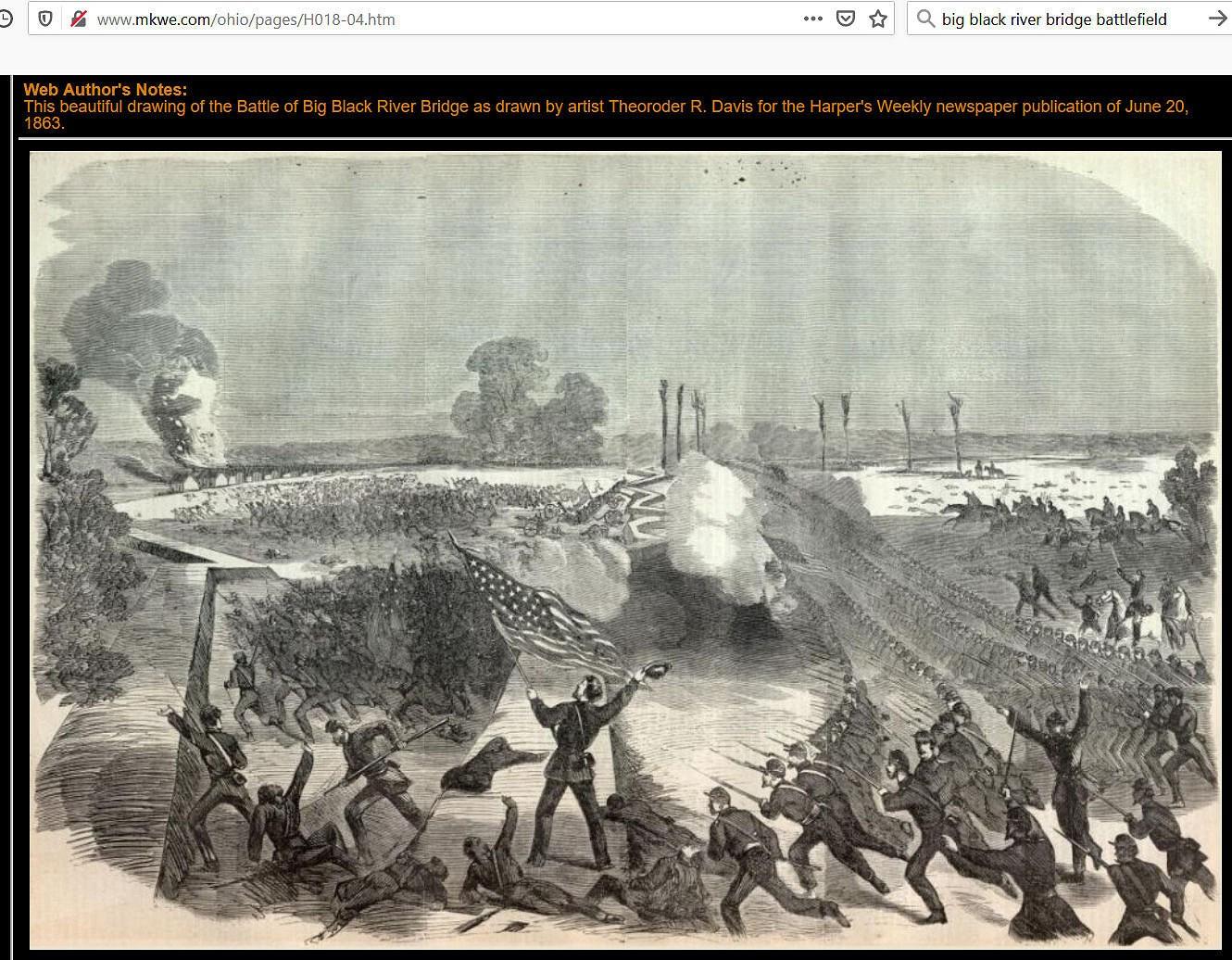


From Wikimedia Commons


 Fought on May 17, 1863, the Battle of Big Black River Bridge, was the final battle in Major General Ulysses S. Grant’s Vicksburg Campaign.
Fought on May 17, 1863, the Battle of Big Black River Bridge, was the final battle in Major General Ulysses S. Grant’s Vicksburg Campaign.
The Battle of Bayou Bourbeux also known as the Battle of Grand Coteau, Battle of Boggy Creek or the Battle of Carrion Crow Bayou (Carencro is the Cajun French word for buzzard), which is present day Carencro Bayou, was fought in southwestern Louisiana west of the town of Grand Coteau, during the American Civil War. The engagement was between the forces of Confederate Brigadier General Thomas Green and Union Brigadier General Stephen G. Burbridge.

Under orders from Major General Richard Taylor, Green launched the attack on the Union camp after receiving three infantry regiments on November 2, 1863. These regiments were led by Colonel Oran M. Roberts.

Lieutenant William Marland of the 2nd Massachusetts Battery earned the Congressional Medal of Honor for his actions during this battle.
The Federals reported casualties of 26 killed, 124 wounded, and 566 captured or missing. The Confederates admitted a loss of 22 killed and 103 wounded.
Report of Maj. Joseph E. Greene, Twenty-third Wisconsin Infantry, of engagement at Sabine CrossRoads.
HDQRS. TWENTY-THIRD Regt. WIS. VOL. INFY., Grand Ecore, La., April 12, 1864. SIR: In compliance with circular from your headquarters, I have the honor to make the following report of the part taken by this command in the campaign from Natchitoches to Sabine Cross-Roads:
On the 5th instant I received marching orders, and on the morning of the 6th, the regiment rejoined the First Brigade, Fourth Division, Thirteenth Army Corps, and left Natchitoches, where it had been doing provost duty, at 7 a.m. We marched 17 miles that day, and went into camp. At 5.30 a.m., 7th instant, left camp and marched 18 miles to Pleasant Hill. Received orders that night to march at 5.30 a.m. in the morning. The order was countermanded and the hour for starting changed to 3 a.m. Started at the appointed time and marched about 8 miles, when we came up with Gen. Lee's cavalry, and immediately took the advance; were formed in line in an open field, left resting on the road, and ordered to support the skirmishers and advance with them. The regiment advanced in this way, alternately marching in line of battle through the thick woods and underbrush and by the flank in the road, until about 12 m., driving the enemy before us. Arriving at an open field near Sabine Cross-Roads, were formed in line on the left of the road, and ordered to advance and take position on a hill and support Nims' battery and two howitzers of Sixth Missouri Cavalry. Remained in position until about 4 p.m., when the enemy were reported moving to attack us. One company was thrown out as skirmishers, but was soon compelled to fall back, the enemy appearing in view in force and pouring a hot fire into them. We held the position until the regiment on our right gave way, and then, being on the extreme left of the line of infantry, outflanked on both sides, and in imminent danger of capture, we were compelled to retire after all but one piece of the battery we were ordered to support was withdrawn. As we retired a destructive crossfire swept through our ranks.
Nearly all of the casualties (64 killed, wounded, and missing) were sustained by the regiment while endeavoring to hold its first position. Parts of the regiment were subsequently rallied under their different officers, moved forward to the edge of the woods, and there did their utmost to stem the advance of the enemy, until their ammunition became exhausted and they were again forced to fall back. Subsequently the regiment was rallied in rear of the position held by the Nineteenth Corps, and remained until ordered to march back to Pleasant Hill, which place was reached early on the following morning. From there we marched at about noon toward Natchitoches until 12 p.m. Started at sunrise 10th instant; marched 8 miles and camped; were detailed to guard prisoners; moved camp to cotton-gin on Grand Ecore road, and remained until sunrise the next day, when we rejoined the column and marched 12 miles to where we are now encamped.
I have the honor to subscribe myself, very respectfully,
JOS. E. GREENE, Maj., Cmdg.
Lieut. HENRY P. AYRES, Acting Assistant Adjutant-Gen.
Source: Official Records CHAP. XLVI.] THE RED RIVER CAMPAIGN. PAGE 298-61 [Series I. Vol. 34. Part I, Reports. Serial No. 61.]
Battle of Monett's Ferry or Cane River Crossing
Campaign: Red River Campaign
Date(s): March-April 1864
March-April 1864
Principal Commanders: Major General Nathaniel Banks [US] Brigadier General Hamilton Bee [CS]
Estimated Casualties: 600 total (US 200; CS 400;)
Description:
Near the end of the Red River Expedition, Maj. Gen. Nathaniel P. Banks's army evacuated Grand Ecore and retreated to Alexandria, pursued by Confederate forces. Banks's advance party, commanded by Brig. Gen. William H. Emory, encountered Brig. Gen. Hamilton P. Bee's cavalry division near Monett's Ferry (Cane River Crossing) on the morning of April 23. Bee had been ordered to dispute Emory's crossing, and he placed his men so that natural features covered both his flanks. Reluctant to assault the Rebels in their strong position, Emory demonstrated in front of the Confederate lines, while two brigades went in search of another crossing. One brigade found a ford, crossed, and attacked the Rebels in their flank. Bee had to retreat. Banks's men laid pontoon bridges and, by the next day, had all crossed the river. The Confederates at Monett's Ferry missed an opportunity to destroy or capture Banks's army.
Results: Union Victory
From: US Government, National Park Service
Banks's advance party, commanded by Brig. Gen. William H. Emory, encountered Brig. Gen. Hamilton P. Bee's cavalry division near Monett's Ferry, or Cane River Crossing, on the morning of April 23. Bee had been ordered to dispute Emory's crossing, and he placed his men so that natural features covered both his flanks. Reluctant to assault the rebels in their strong position, Emory demonstrated in front of the Confederate lines. Among the troops supporting Emory in this effort were members of the 47th Pennsylvania Infantry, the only regiment from the Keystone State to fight in the Union's 1864 Red River Campaign across Louisiana.
Meanwhile, two other Union brigades went in search of another crossing, one of which successfully found a ford, crossed, and attacked the rebels in their flank, forcing Bee to retreat. Banks's men laid pontoon bridges and, by the next day, had all crossed the river.
The Confederates at Monett's Ferry missed an opportunity to destroy or capture Banks's army. According to General Richard Taylor, the errors made by Bee were as follows: Sending Terrell's and Buschel's regiments back to Beasley to guard a wagon train "For the safety of which I had amply provided for", taking no steps to artificially increase the strength of his position, (Presumably by building earthworks or other fortifications), in massing his troops to the center "Where the enemy were certain not to make any decided effort" instead of concentrating on his flanks, and finally, in retreating his entire force 30 miles to Beasley upon being forced back instead of attacking the disorganized Union column. In Hamilton P. Bee's defense, in addition to fatigue on his horses and men from non-stop fighting since the Battle of Mansfield on April 8, 1864 and being outnumbered 10 to 1 and almost out of supplies and ammunition, there was no time to entrench, and Bee wrote that he chose to save his force in order to fight another day rather than see his entire force enveloped and annihilated with an impossible task resulting in the needless loss of irreplaceable troops. Blame for the Confederate tactical and strategic defeat has been debated ever since. From Wikipedia
Bailey's Dam was a timber dam on the Red River in Alexandria, Louisiana. The dam was built in 1864 at Lieutenant Colonel Joseph Bailey's request to afford passage over the Alexandria rapids for part of Rear Admiral David Dixon Porter's Mississippi River Squadron during the Red River Campaign in the Civil War. The dam successfully raised the level of the river and was then breached in order to allow the boats in its reservoir to pass downstream.
The Red River was an important transportation corridor through Louisiana, where the river channel meandered through alluvium. A short distance upstream of Alexandria, the river crosses two ledges of sandstone and siltstone. The depth of water over these bedrock ledges was less than the channel depth through nearby alluvium, and the downstream ledge controlled the water level upstream of that ledge.
During the Red River Campaign in March 1864, General Nathaniel P. Banks and his Union troops moved north along the Red River in order to capture Shreveport. Accompanying them was Rear Admiral David D. Porter who was in command of the Mississippi River Squadron.[3] The levels of the river were unseasonably low, perhaps due to a multi-year drought, and made passage for the boats difficult when they reached the Alexandria falls. Porter could only move 12 gunboats and 20 transports north of the falls after waiting for the level to become high enough. The rest of the fleet would wait behind. After being defeated by Confederate General Richard Taylor and failing to capture Shreveport in the Battle of Mansfield on April 8, General Banks and the Union troops were now retreating back south along the Red River. Taylor's troops were in pursuit of them and harassing them with gunfire. Porter's flotilla managed to navigate the river but with difficulty. By April 28, the flotilla reached the Alexandria falls, although the river was too low at 3 feet and 4 inches. Porter's boats lightened their loads but needed 7 feet of water to pass. They did not have time to wait for the river level to rise. The chief engineer of the 19th Corps, Lieutenant Colonel Joseph Bailey, suggested that a wing dam should be built in order to raise the river level and free the boats. Bailey had constructed dams in Wisconsin as a lumberman and was familiar with how one could solve the problem. Although other officers criticized Bailey for the idea, General Banks agreed to it and ordered the construction.
Construction soon began supervised by Bailey. Around 3,000 soldiers started to fell trees and bring rock, brick, stone and other materials to the construction site. As construction progressed, two wings of the dam developed from either shore of the 758-foot-wide (231 m) river. The dam was at the bottom of the downstream ledge and was built with local materials. Where trees were plentiful on the left (east) side of the river, men with logging experience from the 29th Maine Volunteer Infantry Regiment used those trees for dam-building. Freed slaves of the 97th and 99th United States Colored Infantry Regiments worked from the right bank building box cribs filled with rocks and stones. The dam was built with 4 x 10 inch wooden timbers that were stacked parallel with the river. The upstream tops of the timbers were anchored with stone while their trunks were raised higher by timbers that were perpendicular to the river. This helped support the dam and make it stronger as a reservoir filled in behind. The rock-crib structure did not cross the entire river and four coal barges were sunk in between the dam's 150-foot (46 m) gap. The barges were filled with local material and anchored into the riverbed. Bailey directed that one of the barges only be partially filled as he planned to quickly remove it in order to allow the reservoir to empty and the flotilla to pass. Among the materials used were that of the Red River Railroad.
By May 6, the dam had raised the river level to four feet and by May 8, it was over five feet, allowing some of the smaller boats to pass in directly behind the dam. At 5:30 AM on May 9, two of the barges surprisingly broke loose, sending a gush of water downstream. Only four of Porter's ships including the Lexington passed through as the rest were unprepared. Bailey now needed to repair the dam but also decided to build two smaller dams upstream as well. These two winged dams were complete on May 11 and would channel the water downstream into a deeper course but also relieve pressure on the downstream dam. On May 13, with the dam repaired, the gunboat Mound City breached the dam and eventually the rest of the fleet was safely below the falls. From Wikipedia
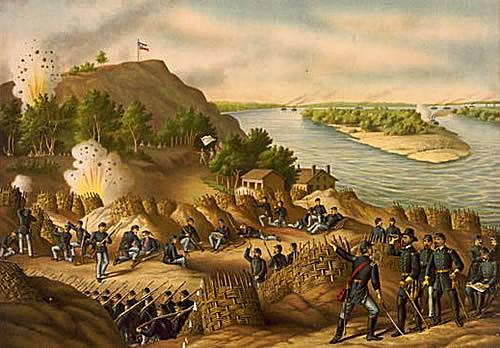
The Siege of Vicksburg (May 18, 1863-July 4, 1863) was a decisive Union victory during the American Civil War (1861-65) that divided the confederacy and cemented the reputation of Union General Ulysses S. Grant (1822-85). Union forces waged a campaign to take the Confederate stronghold of Vicksburg, Mississippi, which lay on the east bank of the Mississippi River, halfway between Memphis to the north and New Orleans to the south. The 47-day siege gave control of the Mississippi River to the Union, a critical supply line, and was part of the Union’s Anaconda Plan to cut off outside trade to the Confederacy.
Vicksburg was one of the Union Army’s most successful campaigns of the American Civil War. The Vicksburg campaign was also one of the longest. Although General Ulysses S. Grant’s first attempt to take the city failed in the winter of 1862-63, he renewed his efforts in the spring. Admiral David Porter (1813-91) had run his flotilla past the Vicksburg defenses in early May as Grant marched his army down the west bank of the river opposite Vicksburg, crossed back to Mississippi and drove toward Jackson. After defeating a Confederate force near Jackson, Grant turned back to Vicksburg. On May 16, he defeated a force under General John C. Pemberton (1814-81) at Champion Hill. Pemberton retreated back to Vicksburg, and Grant sealed the city by the end of May. In three weeks, Grant’s men marched 180 miles, won five battles and captured some 6,000 prisoners.
Grant made some attacks after bottling Vicksburg but found the Confederates well entrenched. Preparing for a long siege, his army constructed 15 miles of trenches and enclosed Pemberton’s force of 29,000 men inside the perimeter. It was only a matter of time before Grant, with 70,000 troops, captured Vicksburg. Attempts to rescue Pemberton and his force failed from both the east and west, and conditions for both military personnel and civilians deteriorated rapidly. Many residents moved to tunnels dug from the hillsides to escape the constant bombardments. Pemberton surrendered on July 4, 1863, and President Abraham Lincoln (1809-65) wrote that the Mississippi River “again goes unvexed to the sea.”
From History.com/American Civil War

The terrain in northwestern Louisiana was thickly wooded and little traveled, with only a narrow road threading its way to the Texas state line. For the past two days, 3,000 blue-clad Union cavalry had been making leisurely progress westward from the town of Alexandria, confident that another Federal army, descending from Arkansas, would draw off any Confederate opposition from their flank. Their overconfidence was rudely shattered on the afternoon of April 8, 1864, when a force of Confederate cavalry, comprised mostly of Texans but with a scattering of Louisianans, Missourians and Arkansans, broke from the surrounding woodland and crashed into the vulnerable Yankee column. In a matter of minutes, months of carefully laid plans for a Union march through the lowlands of east Texas were a shambles.
The campaign that had led the Union troops to this confrontation at Sabine Crossroads was the culmination of mounting pressures political, diplomatic and military that compelled Union forces in Louisiana to expand the war west of the Mississippi River. To the politically appointed Maj. Gen. Nathaniel P. Banks, the lands west of the Mississippi represented little more than a sideshow. His real ambition was the investiture of Mobile, an important seaport on the coast of Alabama. Unfortunately for Banks, French Imperial forces were active in Mexico under the pretext of protecting European interests against the revolutionary forces of Benito Juarez and threatened to interfere with American interests in Texas. It was already apparent that there had been stealthy meddling on the diplomatic front; the French consul at Richmond had tried to convince Texan officials to re-establish the Lone Star Republic and had been summarily rebuffed by Confederate authorities. Nevertheless, the French represented enough of a potential threat for Washington to want Union forces to take action if not to knock Texas out of the war, at least to discourage further French meddling north of the border.
Banks was told to forget about Mobile for the time being and was ordered to focus on Texas. Major General Henry W. Halleck, the Federal chief of staff, indicated that he would like to see an operation up the Red River toward Shreveport, La., but with the approach of autumn 1863, the river was too low for waterborne transportation, and an alternate strategy had to be developed.
Accordingly, Banks organized a 3,500-man expedition to occupy a number of positions along the Texas coast. Everything went smoothly, including the occupation of Brownsville on November 3, 1863, but the captured ports played a puny role in controlling Texas trade, and the vulnerability of the widely separated Federal units made further reinforcing operations necessary. Rather than sanction operations so far from the main Union base in New Orleans, General Halleck still preferred his original Red River plan for the department’s main military campaign that spring. A drive up the Red River soon became the only practical means for the Union to concentrate its strength with a short supply line from Louisiana. Also, Maj. Gen. Frederick Steele’s 10,400 troops would descend from their base at Little Rock, Ark., to support Banks’ troops as they penetrated the interior.
The only thing working against the campaign was time. Major General William Tecumseh Sherman was planning to march on Atlanta, Ga., that summer and wanted Banks’ forces to reinforce him. To conform to that timetable, Banks would have to ascend the Red River as soon as the water level rose in the spring, cross the Texas border and then create his own swath of destruction through the more populous and productive eastern part of the state in time to join Sherman when needed.
Accordingly, in the early months of 1864 the Union commanders were busily occupied with coordinating the various roles they each would have in the coming campaign. The most crucial elements involved Steele’s linkup with Banks and the level of the water over the falls above Alexandria, which would have to be deep enough to take the gunboats and transports of the Mississippi squadron to support the expedition.
On March 1, Sherman arrived in New Orleans to finalize the plan and to promise 10,000 men, who would march up the Black River to Harrisburg and reach Alexandria by March 17. Banks’ forces, made up of two divisions of Maj. Gen. William B. Franklin’s XIX Corps, two of the XIII Corps, and a division of cavalry and mounted infantry commanded by Brig. Gen. Albert L. Lee, would move up from Franklin, Tenn., to relieve Sherman’s troops, freeing them to resume duty with Sherman in the east. Steele, meanwhile, was directed to bring his men south toward Shreveport, a move that did not have his enthusiastic support.
After Sherman left for Vicksburg, the plan went into action. Brigadier General Andrew J. Smith was ordered to take combined elements of the XVI and XVII corps to Louisiana from Vicksburg and start up the Red River for the rendezvous. By March 11 he was in position, with his troops loaded aboard the largest Union armada west of the Mississippi including brigs of light draft that could be maneuvered over the falls; Ouachita, a paddle-wheel steamer equipped with howitzers and 34 cannons of varying size along her two decks; and an assortment of lightly armored ironclads.
As scheduled, the gunboats hauled anchor on March 12 and led the way up the river, which had risen just high enough to allow the heavily laden transports to pass. Progress was slow, as the gunboats were frequently forced to stop so that troops could clear the river of obstructions left behind by the enemy. They reached Simmesport on the 13th, and the army occupied a camp abandoned by the vastly outnumbered Confederates who had retreated upriver toward Fort de Russy. The next day Smith’s men followed the Rebels, who led them on a 28-mile chase that finally ended when the Federals seized the fort. Unfortunately for Banks, the bulk of the enemy force was able to escape, leaving a rear guard of only 300 men. Disappointed, the army continued its advance, fighting shallow water, obstructions and the nightmarish twists in the river’s course.
On the 14th the Federals were again delayed by an obstruction made of a double row of piles driven deep in the riverbed and anchored near the banks by sunken rafts. In addition, trees had been cut down upstream and allowed to drift down and entangle themselves among the piles. After a frustrating afternoon of ramming and dragging the piles free, a group of ironclads made it through and hurried up the river, where they were greeted by erratic, inaccurate artillery fire. Following a brief engagement, orders were given to move directly to Alexandria, but the message was somehow delayed, and there was a five-hour wait before the final dash up the river was completed. That delay was all Maj. Gen. Richard Taylor and his small force of Texans and Louisianans needed to get their own transports above the falls and escape the Yankee advance.
By the 17th, Smith had completed his part in the plan, bringing his 8,000-man army to the rendezvous as scheduled, but Franklin’s army was not there to meet them. Because he had only received his orders on March 10, there was no way for Franklin to get his men to Alexandria, a march of 175 miles, by the 17th. Furthermore, troops who had been assembled from various spots along the Gulf were without transportation, and the cavalry was still in New Orleans. With all the delays, Franklin’s troops were not able to reach Alexandria until the 25th.
While the bulk of Franklin’s men were still struggling to reach Alexandria, Maj. Gen. Joseph A. Mower led six infantry regiments, some artillery and a brigade of Albert Lee’s cavalry into the piney fastness of the Louisiana countryside to drive off Taylor’s bothersome Texans. With the help of Rebel deserters, Mower’s men slogged through a night of driving rain and waist-deep mud to a small rise deep in the swamp called Henderson’s Hill, where they surprised and captured 250 of the Confederates, effectively wiping out Taylor’s cavalry and forcing him to hurry along Brig. Gen. Thomas Green’s Texas cavalry.
The ultimate objective of Bank’s campaign, the town of Shreveport, lay 340 miles farther up the Red River. The main supply depot for the Confederate army west of the Mississippi, Shreveport was equipped with docks, machine shops and warehouses. Its defenses were equally formidable, with a line of works that spread up to three miles from the city. To get there, the Union flotilla would have to negotiate a river that twisted and turned through a populated countryside and was dominated by two small rapids, called the Falls of Alexandria. Situated just above the city, those rapids were impossible to cross when the river was low. When the squadron reached Alexandria, the river was still fairly low and seemed likely to be a problem for weeks to come. Little did the invaders know that, for the first time in 20 years, the river would stay low and even begin to fall long before spring ended.
Despite the shallow water, Banks decided to continue the advance, but he also played it safe by keeping part of his naval force below the rapids and hauling his equipment around the falls by land. By April 2, he was 80 miles up river at Natchitoches and had an additional 2,000 men under Brig. Gen. T. Kilby Smith farther up at Grand Ecore.
Aware of Banks’ approach from the south, the commander of the Confederate Trans-Mississippi Department, Maj. Gen. Edmund Kirby Smith, scrambled to slow the Union advance from New Orleans until he could deal with General Steele’s threat from Arkansas. He rounded up as many regular troops as he could from the department’s depleted ranks while Maj. Gen. John B. Magruder marched his Texans to the Red River. Most of the Confederate soldiers were ill-equiped and practically starving and they were facing a strong, well-armed foe with superior numbers. It was an inopportune time for a political gesture, but Texas Governor Pendleton Murrah chose that moment to further heighten the tensions on the Texas border. In the midst of a political struggle with Richmond over the allocation of Texas troops to the East when he needed them to defend their home state, Murrah refused to allow state militia units to cross into Louisiana.
Despite all those difficulties, Confederate Maj. Gen. Sterling Price got an army of 5,000 Texans, Arkansans, Missourians and Choctaw Indians between Steele and Shreveport. Steele got as far as Camden on April 15, but constant Rebel pressure on his supply lines ultimately compelled him to withdraw to Little Rock, even though he still held a 2-to-1 advantage in troop strength. The utter failure of Steele’s Camden expedition deprived Banks of his expected support and left the Confederate command free to concentrate its forces farther to the south.
Well before the Union reverse at Camden, elements of Banks’ army above Alexandria, moving by land and water, began to concentrate on Mansfield, only 40 miles from the Texas line. Making their way through the forests and marshy bayous of northwestern Louisiana, the Federals were forced to march along a single narrow road that in some places barely accommodated the supply wagons. Unknown to Banks, he had missed a second road that paralleled the river, and he instead marched ever farther from his naval support. By April 7, 3,300 mounted infantry were probing out ahead of the main army, which struggled along 15 miles in the rear. In the meantime, Banks had left Kilby Smith and had ridden to Franklin’s headquarters at Pleasant Hill, eight miles from where the cavalry was scouting.
Taylor, meanwhile, found himself in a desperate situation. Having done everything possible to delay and harass the advancing Federals, he was determined to give up no more of Louisiana territory and decided the time had come to make a stand. To face the 25,000-strong Union army, he had a hastily thrown-together collection of Southern units. Besides the regulars under Brig. Gen. Alfred Mouton and Prince Camille Armand Jules Marie de Polignac (known to his men as ‘General Polecat), there were volunteers from Missouri, Louisiana and Arkansas, and the veteran Texas Cavalry Division under General Green. Taylor’s far-from-cohesive army still came to only 11,000 men, but his force made up in courage and dash what they lacked in numbers. It did not seem to Taylor that he had a chance, but with Smith’s cavalry detached and out in front of the main army, there was a possibility for him to hand the Yankees a devastating psychological blow.
The first confrontation occurred on the afternoon of April 7 at a place called Wilson’s Farm, where part of Albert Lee’s cavalry was scouting the countryside ahead of the main column. Made up mostly of mounted infantrymen grown cocky from days of chasing Taylor’s retiring foot soldiers, the Yankee cavalry force was unprepared for the surprise appearance of Green’s Texas troopers. At first, there was uncertainty on both sides; then, instead of retreating as had been the case before, the four regiments of Southern horsemen spurred forward, screaming their Rebel yell as the two sides met in a flurry of gunshots and wheeling horses. Breaking away from the bluecoats, the Confederates reached the supply train and engaged in heavy fighting until they were eventually driven back into the forest.
The Union had lost 53 men in the running fight. Worried about more such encounters to come, Albert Lee asked Banks for infantry support and was given most of the XIII Corps’ 4th Infantry Division, led by Colonel William J. Landram.
The next day, the Union march continued toward the little town of Mansfield, brushing up against occasional Confederate horsemen and Louisianan snipers. Three miles ahead, however, Taylor had found the spot to make his stand. At a lonely intersection of local dirt roads called Sabine Crossroads, the Confederate general began to place his men. Outnumbered by the Federals and still waiting for reinforcements from Brig. Gen. Thomas Churchill’s corps of Missouri and Arkansas infantry to arrive from Keatchie, Taylor took full advantage of the open pasture on either side of the stage road, along which the Yankee column would have to pass. A rail fence that bounded the fields was the only protection for his ragged but high-spirited troops as they threw themselves into position.
As noon approached, Lee’s men seized Honeycutt Hill, a small rise of land bordering the open ground at the crossroads, and spotted Taylor’s line of defense. Finding the enemy prepared to stand his ground, the Federal troopers waited as Banks rode to the head of the column with Brig. Gen. Thomas Edward G. Ransom, commander of the XIII Corps, and the rest of the 4th Division. By late afternoon, Ransom had more than 4,800 men arrayed before the Confederate positions in an L-shaped formation facing the rail fences, with Landram’s two brigades the 1st Brigade under Colonel Frank Emerson and the 2nd Brigade under Colonel Joseph Vance and some artillery set back on the rise. Two cavalry brigades were stationed near either flank Lee’s on the left and Colonel Thomas Lucas’ on the right. As the afternoon waned, more men were still struggling up the long supply train, which choked the road, to reach the scene of the action. As a result, Taylor enjoyed numerical superiority on the actual field of battle, and it was to his advantage to start the fight before the Yankees could bring more men to bear.
Taylor had placed three infantry brigades under Brig. Gens. Horace Randal, Thomas Waul and William Scurry north and south of the road . Anchoring the right were two of Green’s Texas cavalry regiments, commanded by Brig. Gen. Hamilton P. Bee, supported by two artillery batteries; on the left, covering the length of exposed road across which the Union forces were positioned, were Brig. Gen. Alfred Mouton’s division, including a brigade of Texan infantry under Polignac, a Louisiana brigade under Colonel Henry Gray, and two more artillery batteries. To their left were Colonel William G. Vincent’s, Brig. Gen. Arthur P. Bagby’s and Colonel Walter Lane’s brigades, detached from Green’s Texas cavalry and formed into an ad hoc division under Brig. Gen. James Major. Astride the road between Walker’s and Mouton’s divisions was Colonel Xavier B. DeBray’s 26th Texas Cavalry, which was initially held back in reserve but later moved up the road, ahead of the infantry units.
When Taylor gave the word, the units on the left vaulted the rail fence and began to charge, only to falter in the face of Union rifles and artillery. Urged on by their officers, the Confederates charged again, and once more the murderous fire drove them to ground, forcing them to seek cover in a depression in the field before the Federal positions. The attack cost scores killed, including Mouton, who was allegedly cut down while approaching some temporarily unarmed Union prisoners, some of whom picked up their dropped weapons and fired on the general. Polignac assumed command, but after losing more than 750 men in half an hour, the Rebel charge was spent.
In the meantime, Major’s and Bee’s dismounted cavalry began to work their way separately around the Union flanks. A brigade of Texan infantrymen under Brig. Gen. William Scurry struck the Union center, was repulsed and charged again a number of times. Finally, in a determined effort and amid screaming horses, dying men, artillery shots and hand-to-hand fighting, the Rebel troopers gained the summit of the hill behind the Union positions.
One of Bee’s regiments, Colonel Alexander W. Terrell’s Texas Cavalry, had shifted left to reinforce Major’s division for its assault on the Federal right. The remaining unit on the Rebel right, Colonel Augustus Buchel’s 1st Texas Cavalry, outflanked Landram’s line to the south and threatened to surround the Yankees. Landram was forced to order a retreat to avoid losing his entire command, but in the confusion, some units never got the word and were captured. The retreat quickly became a disorganized rout as some of Walker’s Texans turned captured artillery pieces on the rapidly crumbling Union line.
Division and managed to throw up a second line of defense across the path of retreat. Nothing, however, was going to stop the charging Confederates at that point. They quickly outflanked the new line and again drove the bluecoats back in panicky flight.
Franklin lost his horse, received a wound in one shin and witnessed his army’s undignified retreat as his men swarmed over their own line of supply wagons. Unable to have the 150 wagons and 20 artillery pieces turned around in the crowded, narrow road, he abandoned them. He managed at least to get word back to Brig. Gen. William H. Emory to form a line of battle at Pleasant Grove, about three miles south of Sabine Crossroads. Emory’s division had to fight its way through the wildly fleeing cavalry and loose animals to reach the new position. Meanwhile, despite Banks’ valiant attempts to stem the tide of retreat, his men still streamed to the rear and through the peach orchard at Pleasant Grove, while Emory’s men watched in amazement. Delayed somewhat by looting the rich supply train, the pursuing Confederates at last burst from the forest across the main road from where Emory had lined up his three brigades.
Borne on by the momentum of their swift victory at Sabine Crossroads, the Confederates wasted no time in launching themselves at the new Union position. Once again they hit the Union center while their cavalry tried to outflank the Federals, but each attempt failed in bloody disappointment. At last, as night fell, the Confederate attacks ceased, and Banks took stock. The magnitude of the debacle was enormous: 2,200 troops lost, 200 wagons filled with supplies and 20 artillery pieces taken. But Banks felt that once he was reinforced by the XVI Corps, he would be able to overwhelm the Rebels and reach Shreveport on schedule. He deemed it prudent, however, to have his force fall back another 14 miles to the town of Pleasant Hill.
Moving silently through the night, the Union army regrouped at Pleasant Hill. Taylor’s force, reinforced at last with General Churchill’s infantry divisions, caught up with the Federals the next morning. Using the same tactics that had been so successful the day before, the Confederates opened an artillery barrage while their cavalry rode to the Union flanks. Churchill’s infantry emerged from the woods on the Union right flank and found itself facing Colonel Lewis Benedict’s brigade, situated well forward of the Union line. With a yell, the Missourians and Arkansans swept down on the Federal position, killing Benedict and immediately threatening Banks’ exposed position in the town. Unknown to Churchill’s command, however, his troops had emerged from the woods well short of the Union flank and were consequently exposed to a murderous enfilading fire from A.J. Smith’s regiments, located in the forest on the Federal left. In no time, the startled Southerners were swept from the field and back to the ravine beyond the plateau.
The sound of Churchill’s initial attack was the signal for the Confederate units on the Union right and center to charge. First Walker and Green ordered their men forward, but their charge was halted in its tracks and thrown back. Ordered to try again, Colonel Buchel hesitated, knowing the fearsome cost of such an attack. Finally, after receiving the third order to go, he led his men out and into the deadly flanking fire of Smith’s advancing troops. Buchel lost half his regiment and was himself struck. He died of his wounds days later.
Now it was Taylor’s turn to taste defeat as the survivors of Churchill’s infantry began to break for the safety of the woods. Soon there was little he could do but hold his position until nightfall, then begin his retreat. The Confederates had lost 1,621 men (to 1,369 Federal casualties), and the exhausted survivors were in wretched condition. Even while the Northern forces were claiming victory, however, Banks ordered a retirement to Grand Encore that soon developed into a full withdrawal. Banks’ army spent the next couple of months trying to assist its fleet’s retirement down a river whose depth was rapidly diminishing in an unseasonal drought, while Confederate units continued to harass them from the riverbanks. Banks may have written off his entire campaign because he felt that progress inland if opposed as rigorously as at Sabine Crossroads would delay his campaign past the time that Sherman expected him to help in the east. Whatever the case, the ultimate outcome of the Red River campaign was a victory for Taylor and his Confederates. Their sacrificial stand had defeated an overwhelmingly superior adversary and effectively ended the war west of the Mississippi.
This article was written by Pierre Comtois, and originally appeared in the October 1997 issue of America’ s Civil War magazine.
The Battle of Fort Blakeley took place from April 2 to April 9, 1865 in Baldwin County, Alabama, about 6 miles (9.7 km) north of Spanish Fort, AL, as part of the Mobile Campaign of the American Civil War. At the time, Blakeley, Alabama had been the county seat of Baldwin County.
The Battle of Blakeley was the final major battle of the Civil War, with surrender just hours after Grant had defeated Lee at Appomattox on the morning of April 9, 1865. Mobile, Alabama was the last major Confederate port to be captured by Union forces, on April 12, 1865. After the assassination of President Lincoln on April 15, 1865, other Confederate surrenders continued into May 1865.

Maj. Gen. Edward Canby's Union forces, the XVI and XIII Corps,moved along the eastern shore of Mobile Bay, forcing the Confederates back into their defenses. Union forces then concentrated on Spanish Fort, Alabama and nearby Fort Blakeley. By April 1, Union forces had enveloped Spanish Fort, thereby releasing more troops to focus on Fort Blakeley. Union forces built 3 rings of earthworks reaching ever closer until nearly 1,000 yards (910 m) from the Fort Blakely front. Confederate Brig. Gen. St. John R. Liddell, with about 4,000 men, held out against the much larger Union force until Spanish Fort fell on April 8 in the Battle of Spanish Fort. This allowed Canby to concentrate 16,000 men for the attack on April 9, led by Brig. Gen. John P. Hawkins. Sheer numbers breached the Confederate earthworks, compelling the Confederates, including Liddell, to surrender within about 30 minutes in the final assault after 5:30 pm.
The casualty figures are approximate, but an estimated 75 Confederate soldiers were killed, with over 2,800 captured, and 150 Union troops were killed with 650 wounded during the siege and assault. The siege and capture of Fort Blakeley was basically the last combined-force battle of the war. Yet, it is criticized by some (such as Ulysses S. Grant) as an ineffective contribution to Union war effort due to Canby's lateness in engaging his troops. The battle was actually fought hours after the Confederate General Robert E. Lee surrendered at Appomattox. The battle is considered the last major battle of the Civil War with the exception of the Battle of Columbus, Georgia, fought a few days later. African-American forces played a major role in the successful Union attack, with 5,000 colored troops of the Union U.S.C.T. brought through Pensacola, FL
Two days later, the 2 nearby island batteries in the Blakeley River were abandoned. After this battle, Union forces were finally able to occupy the city of Mobile, Alabama on April 12, 1865. From Wikipedia
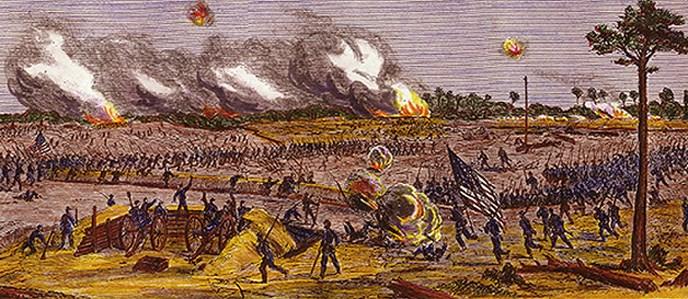 Storming of Fort Blakeley
Storming of Fort Blakeley
November 21, 1862: Robert Bruce Crandall to Katherine Mary Crandall

November 21, 1862: Robert Bruce Crandall to Katherine Mary Crandall

Transcribed on following page

This letter was written by Robert Bruce Crandall (1839-1901) who enlisted on the 14 Aug 1862 as a 1st Sergeant in Co. F, 23rd Wisconsin Infantry. He was later promoted to 2nd lieutenant for meritorious conduct and mustered out at Mobile, Alabama the 4th July 1865. The 23rd Wisconsin served in the western theater of the war, primarily along the Mississippi River Valley. They served in the Campaign and Siege of Vicksburg, fought in numerous battles including Arkansas Post, and Sabine Cross Roads, and later they participated in the Red River Campaign and in siege operations around Mobile, Alabama. After the war he married Alice M. Knight (1837-1915), raised two sons, including Morris Crandall, a longtime, early secretary of the Sauk County Historical Society. Crandall worked for the local school system serving as principal for several graded schools eventually becoming Superintendent of Sauk County Schools. Later in life he moved to Olympia, Washington, where he died in 1901.
Robert was the son of David Phelps Crandall (1802-1877) and Priscilla East (b. 1815) who came to Sauk county, Wisconsin, from Montgomery, Mississippi. Robert wrote the letter to his sister, Katherine (“Kate”) Mary Crandall (1842-Aft1900).
Crandall’s 1863 Civil War Diary is housed at the Sauk County Historical Society and is transcribed and posted on-line.
Addressed to Miss K. M. Crandall, Baraboo, Sauk county, Wisconsin Postmarked Cannelton, IN
On Board steamer, “Masonic Gem” ¹ Near Evansville, [Indiana]
November 21, 1862
Dear Sis,
Here we are, “sailing down the river Ohio” on the third day’s pull. We are on a small boat which takes only four companies and heavily loaded at that. Six companies with Col. [Joshua James] Guppey are on another boat ahead of us. Col. [Edmund] Jüssen is our commander on this boat expedition. Our pilot is drunk and runs us aground every little while, taking often hour’s time to get started again. So all the other boats ahead of us. But I don’t care for this because the longer we are on the boat, the less marching we shall do. We are not far from a place called Evansville in Indiana. There we shall have a chance to send home mail. I am going to seize upon every opportunity for writing home. The letter I wrote just before leaving Louisville will reach you and you will think it rather strange that I didn’t send it by Henry Turner. The reason is this. We were expecting to be paid off at Louisville but were disappointed. Hence, Capt. and [Elisha L.] Walbridge had no money to send either waiters or trunks so they have taken both. I concluded to send my letter as you would get some idea of our whereabouts by it.
We are going, of course, directly to Cairo and shall not leave this boat until we reach Memphis. From thence our destination is not known. It seems reasonable to me to suppose that we are going to Vicksburg. One victory there and another at Richmond, Va. our officers say will win the whole thing.
We didn’t start that P. M. at three o’clock but had made all preparations for it when we received orders to cork two days rations. But we started early next morning in a heavy rainstorm. Our boat was a mile and a half distant. When we reached it, we were wet and muddy. The privates had to take the deck and the officers took the state rooms. poor boys! I feel sorry for them and would willingly share my berth with them could it be done. ‘Tis a hard berth to be an officer but a dreadful thing to be a private in an army. I sleep in a state room with Lieut. [Elisha L.] Walbridge and [Daniel C.] Stanley. I see not one officer about me engaged in anything useful. All are smoking and playing cards. But this is not my business. When not engaged in other duties, I am studying my tactics. I have my motto, “inveniam viam aut faciam” [which means] “I will either find or make a way.” And I write.
But I must give up my pleasant desk to the Quartermaster Sergeant. The jarring of the boat makes it rather inconvenient writing, however. Give my love to everyone. I will write at the next mailing depot. As ever, your affectionate brother, R. B. Crandall
P. S. Continue to direct your letters via Louisville until otherwise ordered. R. B. C.
¹ The Masonic Gem was a cargo-bearing steamboat that operated for some time out of the White River in Indiana, running goods to southern markets, primarily Memphis. Sgt, Crandall said she was fully loaded with four companies which would have been roughly 400 men.
Spared & Shared 17 Saving History One Letter at a Time

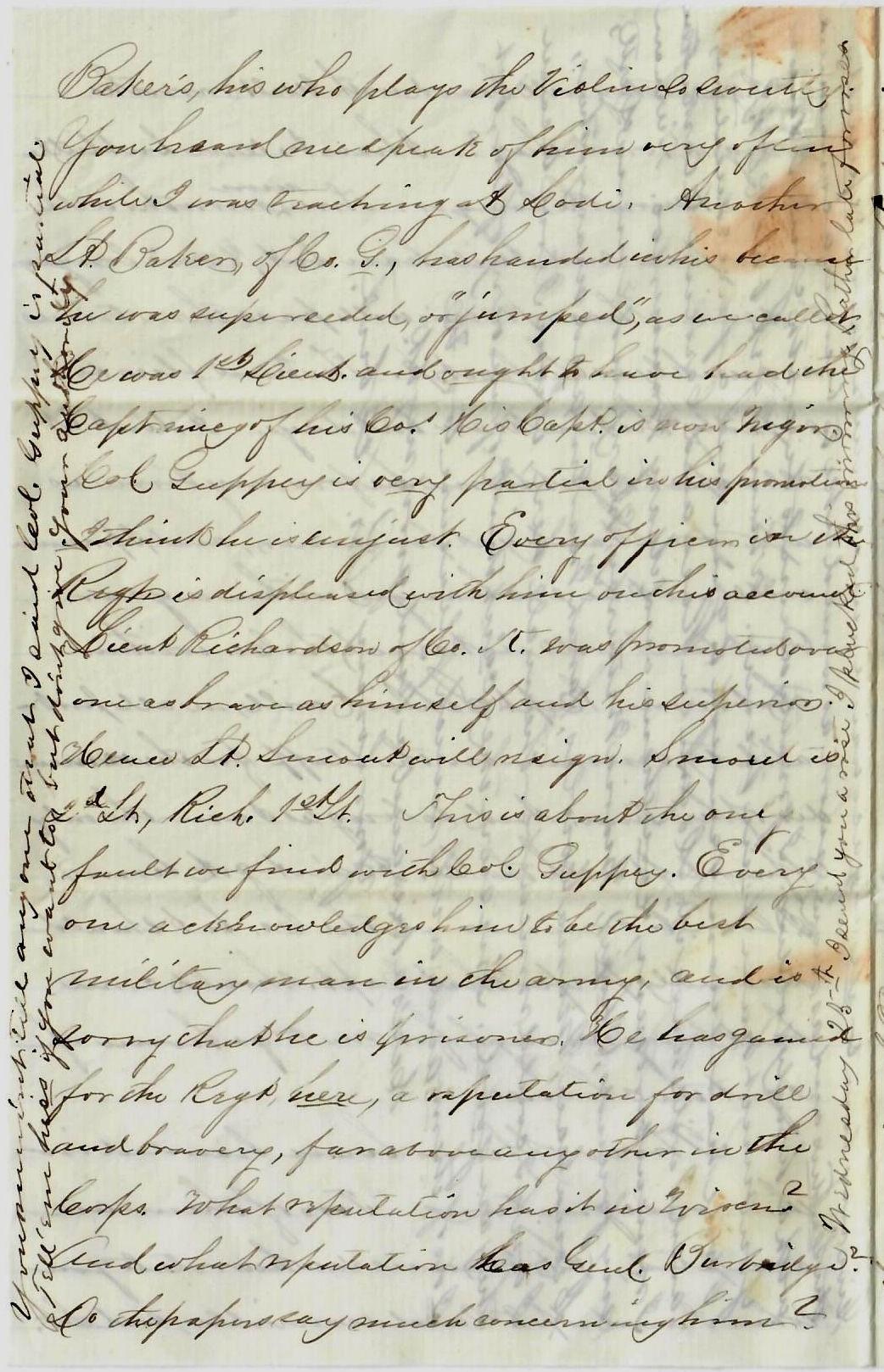



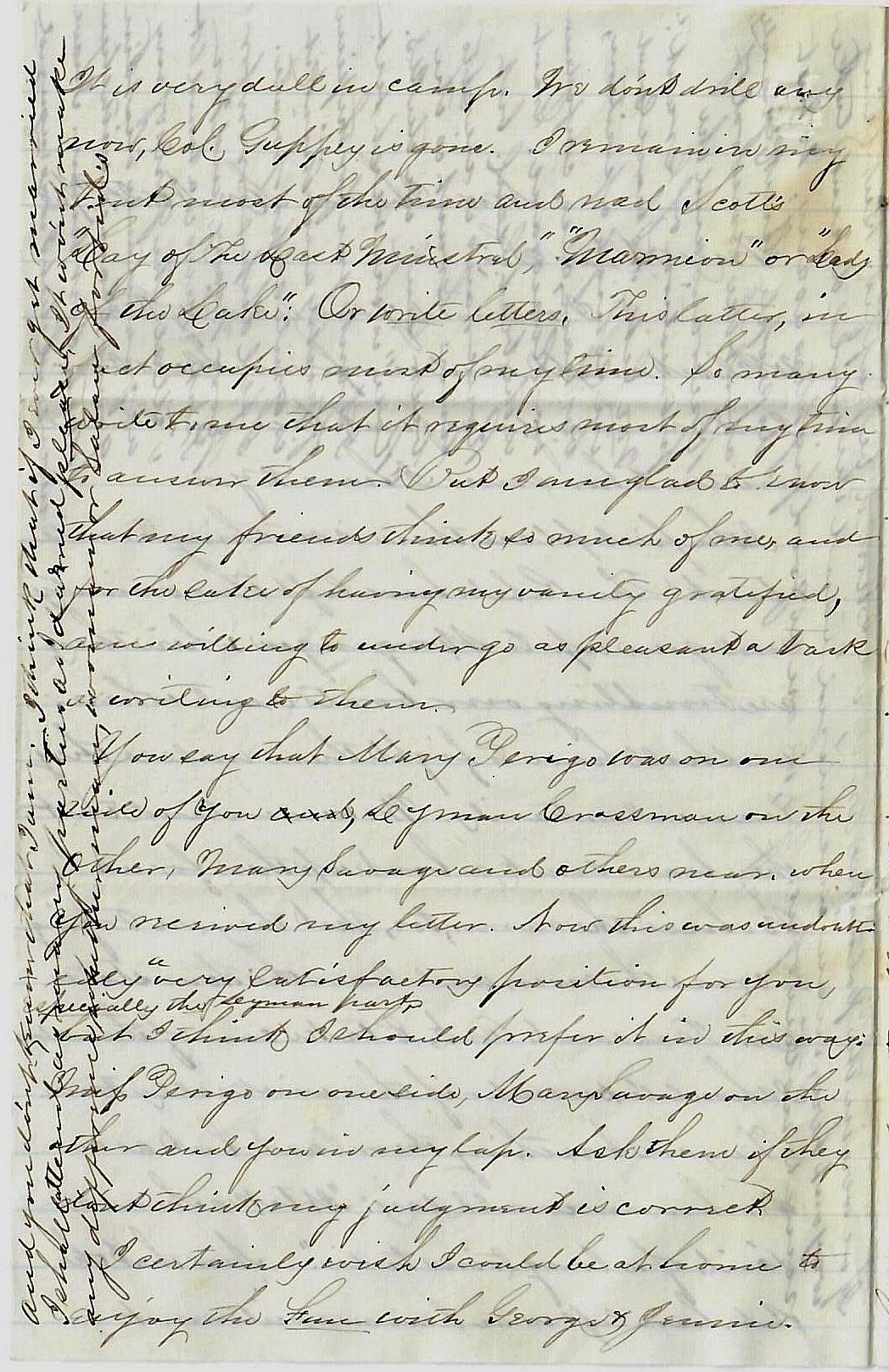

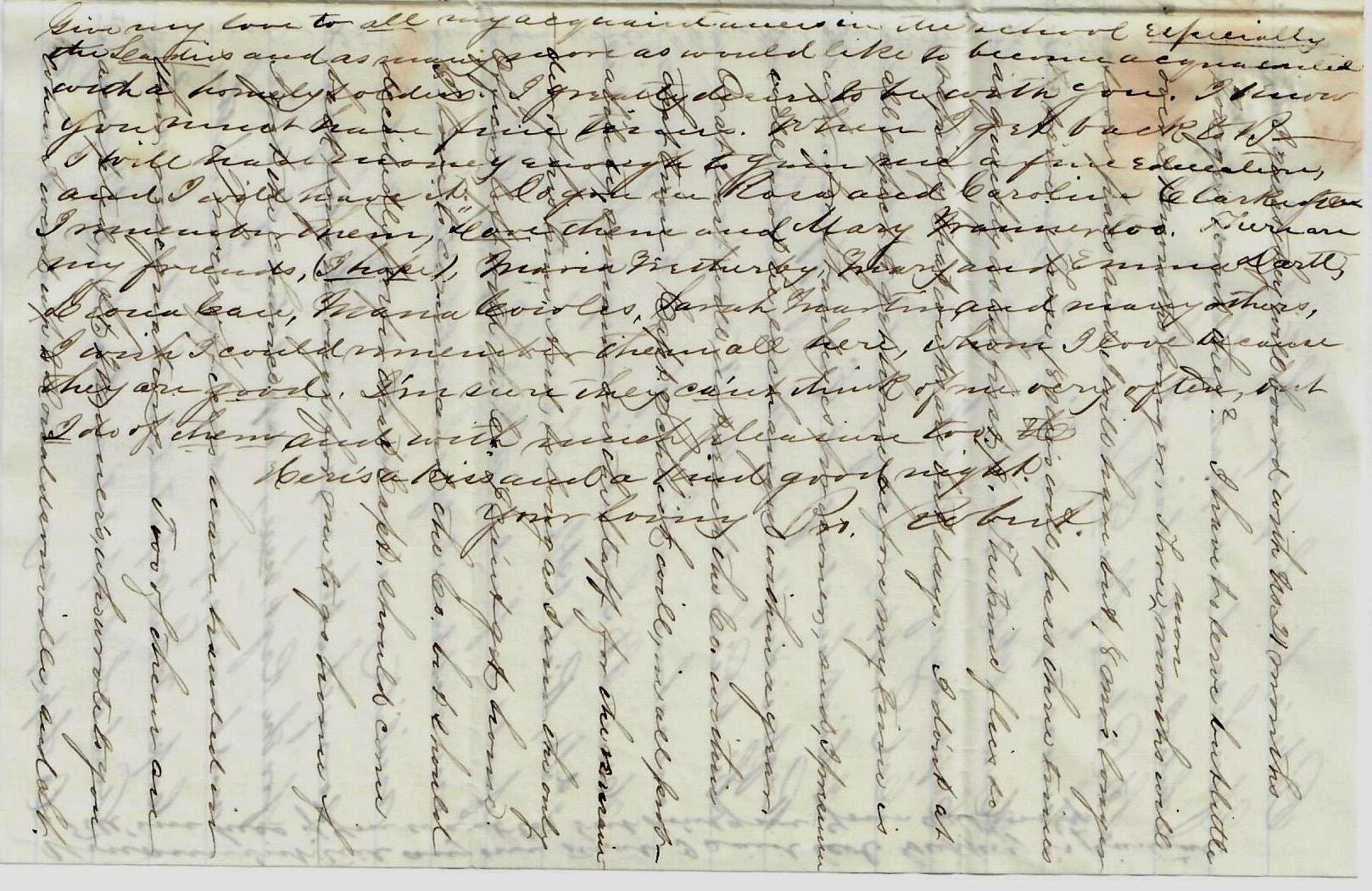
Transcribed on following pages

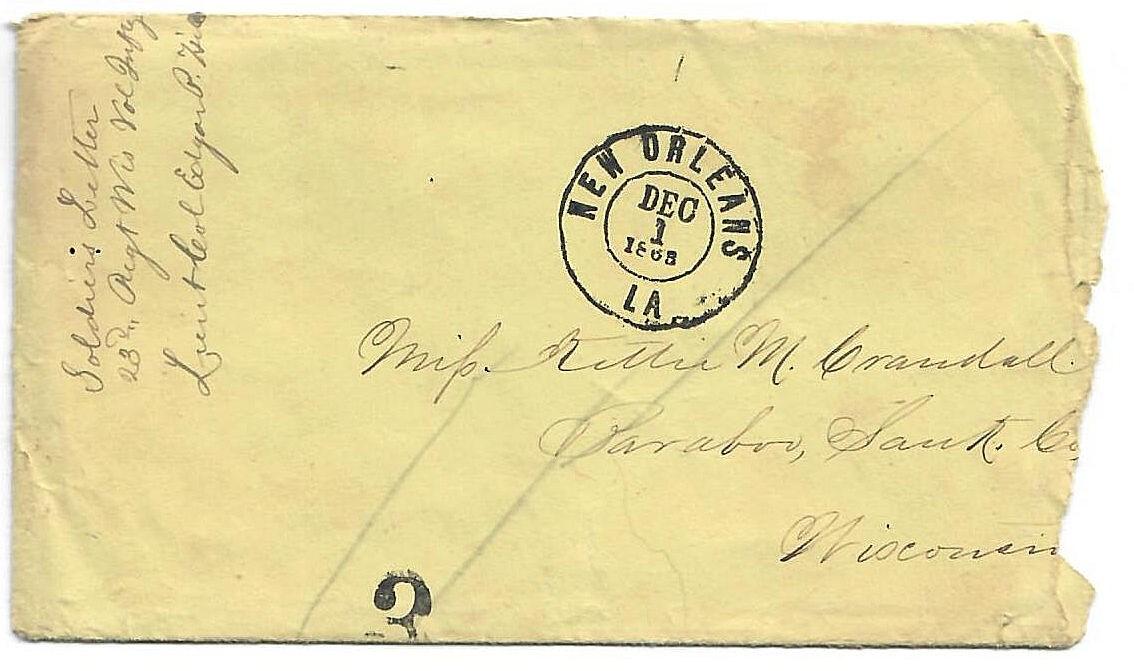 Robert Crandall’s letter to his sister, Kittie, New Iberia, La. Nov. 24th, 1863
Robert Crandall’s letter to his sister, Kittie, New Iberia, La. Nov. 24th, 1863
Postmark: December 1, 1863, New Orleans, Louisiana
Soldier’s Letter
23rd, August Wis Vol Inftry
Lieut Col Edgar P. Hill
(The U.S. Postal Service remained relatively effective often allowing troops to send letters marked "Soldier's Letter" for free (postage was collected from the recipient).
Addressed to:
M??? Kittie M. Crandall
Baraboo, Saint ???
Wisconsin
LETTER:
New Iberia, La. Nov. 24th, 1863
My Dear Sis,
I received your letter of October 30th last night, and one from Alice too. I will answer yours first since I have written to her since I have to you.
In the first place, ther is nothing to write about. The Rebels have left this vicinity and gone up to Morganzin where they are troubling our boats and where we shall have to fight them unless they leave voluntarily. We understand that they have sunk a boat up there for us. We have the rumor, too, that they are trying to cross the river and leave the three states, La. Texas and Ark to take care of themselves. I shouldn’t wonder if this wise ??? true. They are ? their last, but as an Irishman would say, “It takes them a devil of a long time to die.” Now that the Rebs have left us we have no excitement. It is very dull in camp. We don’t drill any now, Col. Guppey is gone. I remain in my tent most of the time and read Scott’s “Lay of The Last Minstrel”, “Marmion” or “Lady of the Lake”. Or write letters. This letter, in fact occupies most of my time. So many write to me that it requires most of my time to answer them. But I am glad to know that my friends think so much of me, and for the ? of having my vanity gratified, am willing to undergo as pleasant a task as writing to them.
You say that Mary Gerigo(?) was on one side of you , Lymann Crossman on the other, Mary Savage and others near when you received my letter. Now this was undoubtedly a very satisfactory position for you, especially the Lyman part, but I think I should prefer it in this way. ? Perigo on one side, Mary Savage on the other and you in my lap. Ask them if they should think my judgment is correct. I certainly wish I could be at home to enjoy the fun with George and Jessie(?). I guess they will board with us 21 months longer, won’t they? I have to serve but little over 21 months longer. Three more months will ? fast and I will have but 18 mo’s longer to serve. Those 18 mos. Will pass three times as quickly as the first 18. The time flies so rapidly that weeks are but days. I don’t at all expect to get home before my time is up for Stanley is ?, and, I ? will not be exchanged within a year. Or at least will not reach the Co. within that time. Capt. Schlick will, in all
probability, will remain on the Staff for the remainder of his term. And so long as I am the only officer left with the Co. I can’t get home. I have to command the Co. but should decidedly prefer(?) that Capt. should come back long enough for me to go home if I get the chance.
Three officers have handed in their resignations. Two of them are accepted, Lt. ?, who wrote to you when we went up to Donaldsonville, and Lt(?) Baker’s, his who plays the violin so sweetly. You heard me speak of him very often while I was teaching at ?. ? Lt(?) Bakers, of Co.G, has handed in his because he was suspended, or “jumped,” as we call it. He was 1st Lieut. And ought to have had the Capt. ? of his Co. His Capt. is now ? Col. Guppey is very practical in his promotions, I think he is unjust. Every officer in the Regt. Is displeased with him on this account. Lieut. Richardson of Co. ? was promoted over one as brave as himself and his superiors(?). Hence Lt(?) Smoret(?) will resign. Smoret(?) is a 2nd Lt., Rich. 1stLt. This is about the one fault we find with Co. Guppey. Everyone acknowledges him to be the best military man in the army, and is sorry that he is prisoner. He has gaine for the Regt here, a reputation for drill and bravery, far above any other in the Corps. What reputation has it in ? and what reputation has Gen(?) Burbridge. Do the papers say much concerning him?
Sideways last page top:
You mustn’t(?) tell anyone that I said Col. Guppey is partial. Tell’em this if you want to but don’t give your authority.
Sideways last page bottom:
Wednesday 23rd I sent you a rose I plucked this morning. Rather late for roses.
Sideways 1st page top and right:
If we were in the Potomac area we should be ?. But being way out here, in an “?” land the world doesn’t take such notice of ?. Yet, we are as good fighters as any. What do people think generally about the ? of R(?) and the ? of Grant? We like it to have Grant in so high a position, but have, also, confidence in R(?). Grant is the best Genrl. But R(?) is next to him. Grant is the best Genl. In the U.S. “Rose” is the next best. I thank you for the piece of (?) and think it is quite appropriate. I feel deep sorrow for ? Mary(?), and Mr/Mrs(?) ?. Theirs is a ? lot. Tell all the girls of my acquaintances that I’m going to dance(?) with them when I get home. I have never said that I ? ?
Sideways 2nd page top:
And you don’t know that I am. I think that if I ever get married I shall attend as ? ? as I darned please. It won’t make any difference whether man(?), woman(?) or Satan forbids.
Sideways 3rd page:
Give my love to all my acquaintances in the school, especially the Le(?) and as ? as would like to become acquainted with a homely soldier. I greatly desire to be with you. ? you must have ? ? . When I get back to B (?), I will have seriously(?) enough(?) to ? such a fine education, and I will leave(?) it. Do you see Rosa and Caroline Clark often. I remember them and “Love them and Mary ? too. ? are my friends (I hope), Francis (?), Mary and Emma Dartl(?), Gloria Case(?), Mama Loiles(?), Sarah Martin, and many others, I wish I could remember them all here, whom I love because they are good. I’m sure they can’t think of me very often, but I do of them, and with such pleasure too.
Here’s a kiss and a kind good night.
Your loving Bro. Robert.
Since 4 o’clock this morning I have been as busy employed as at any time since being in the office. But I am through with the day’s work, and to night must be employed in writing letters for ____ day after tomorrow will commence my work which has to be done at the close of each month. So it is not probable that you will hear from me again for a little more than a week. I will, however, try to find time enough within a week to pen a short note.
Our Regt. being the only one here from our Brigade, the details for picket and other duties are necessarily very heavy. Sixty one men in camp for duty, the others had been detailed. Yet, what remained were ordered out to drill for the benefit of the Genl. ______hspector whose business it is to report upon the condition and discipline of the troops forming the corps. It is Major Aelson, an officer of the Regular Army. He praised the men highly, but complimented the officers by saying that they were a little “Rusty.” The white River campaign is abandoned. The troops of our Division are returning. So we are saved from a trip into that barren country. But we may yet be sent up to Paducah as we know that the Brigade has gone there. But we expect them to return soon, and that we will all be sent to Vicksburg. there is lately some talk that we will be sent up to Yazoo city. I mean that our Division will be. We are to be sent there to garrison the place. I hope it is fine, for it is highly probable that I should get the opportunity of being _____ of our Yazoo and Madison county friends. While at Baton Rouge I saw men and women who had come from twenty to twenty five miles from the country to buy provisions. (I have no doubt those very provisions helped to feed Rebel soldiers). I would give a hundred dollars to see some of the above mentioned friends.
About half your letters are post marked one day later than the date of the letters themselves, and the other half two days later. I guess they are all sent very promptly from the office.
I did not say that I enjoyed letters from home more than any others but that I always read them first of all others. This is simply because I think they claim it, and ought to claim it, for a good while yet. I think your decision to let other folks alone in their affairs a very good one. If many others would do the same they might, at least succeed in making themselves less alone(?). I think I’d better show that portion o your letter to Joseph. I have _____ ______ to him about my affairs and he knows nothing about them but what he has surmised. If he says that he sent with Alice to the boys he tells a palpable falsehood, for I sent with her myself. _____ _____ _____ asserted to find the bat beforehand. I don’t care a _____for what he sent to his mother, but that_____ of inter___ddling with what is none of his business makes me mad. You think a person must be quite sound asleep to _____ a person is never sound asleep when he _____.
It is then that we are marched in many instances when it is necessary. But our General can always tell when he ought and when he ought not to march.
You say you will always like Governor Servis(?), because he was so prompt in ordering Manion home. If he promised, it is not at all likely that he did it. He is not a man of his word. He is a corrupt man.
[Written vertically across the left side of the first page of his letter]
If he were to run again for Gov. I should be tempted to stump it against him. All Wisconsin Soldiers of my acquaintance loved Gov. Salomon. He was a just man, and did the right thing. It was Jewish(?) scheming which robbed Salomon of a second nomination.
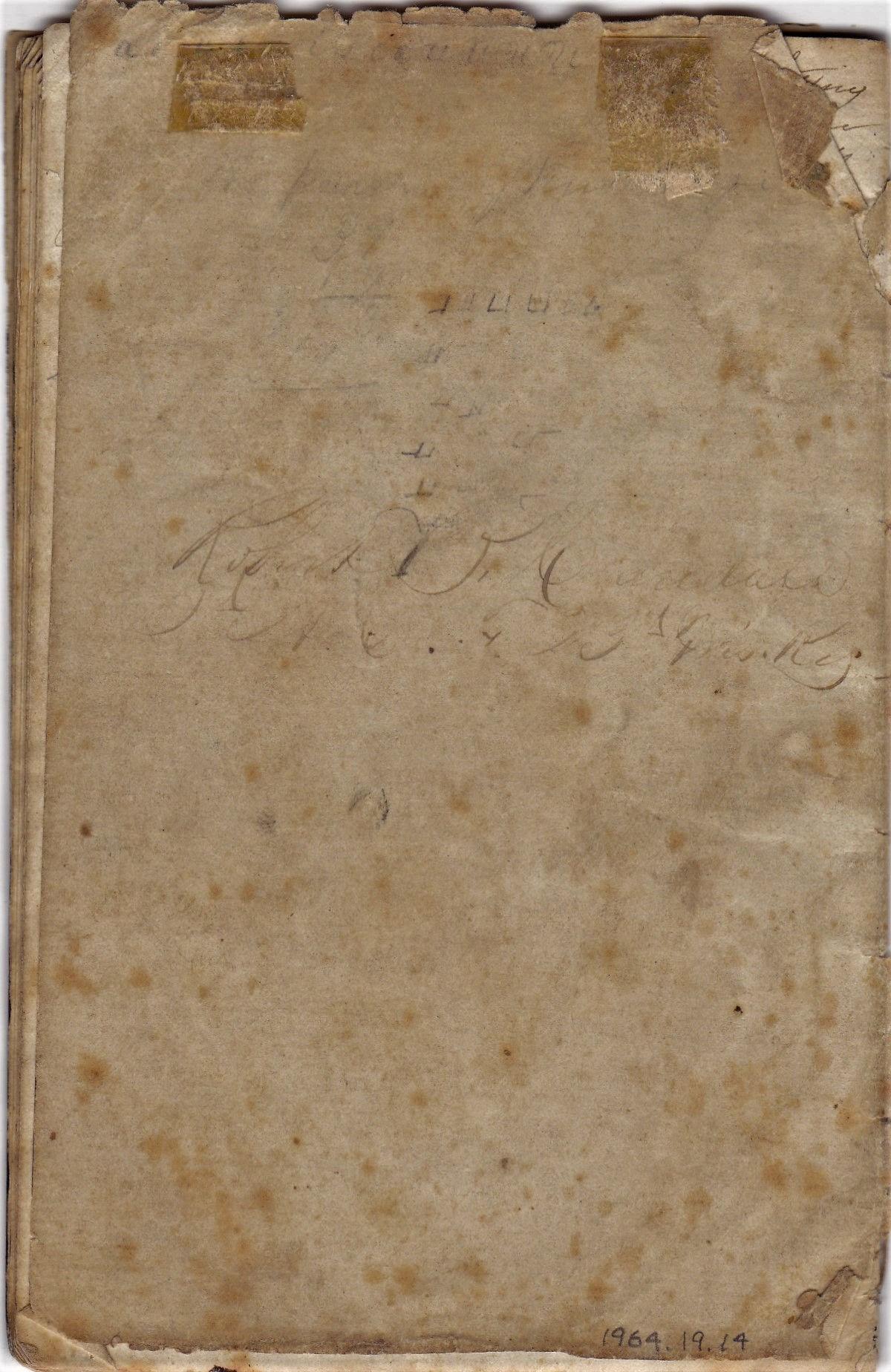 This Robert B. Crandall Diary is located in the archives of the Sauk County Historical Society, Baraboo, Wisconsin
This Robert B. Crandall Diary is located in the archives of the Sauk County Historical Society, Baraboo, Wisconsin





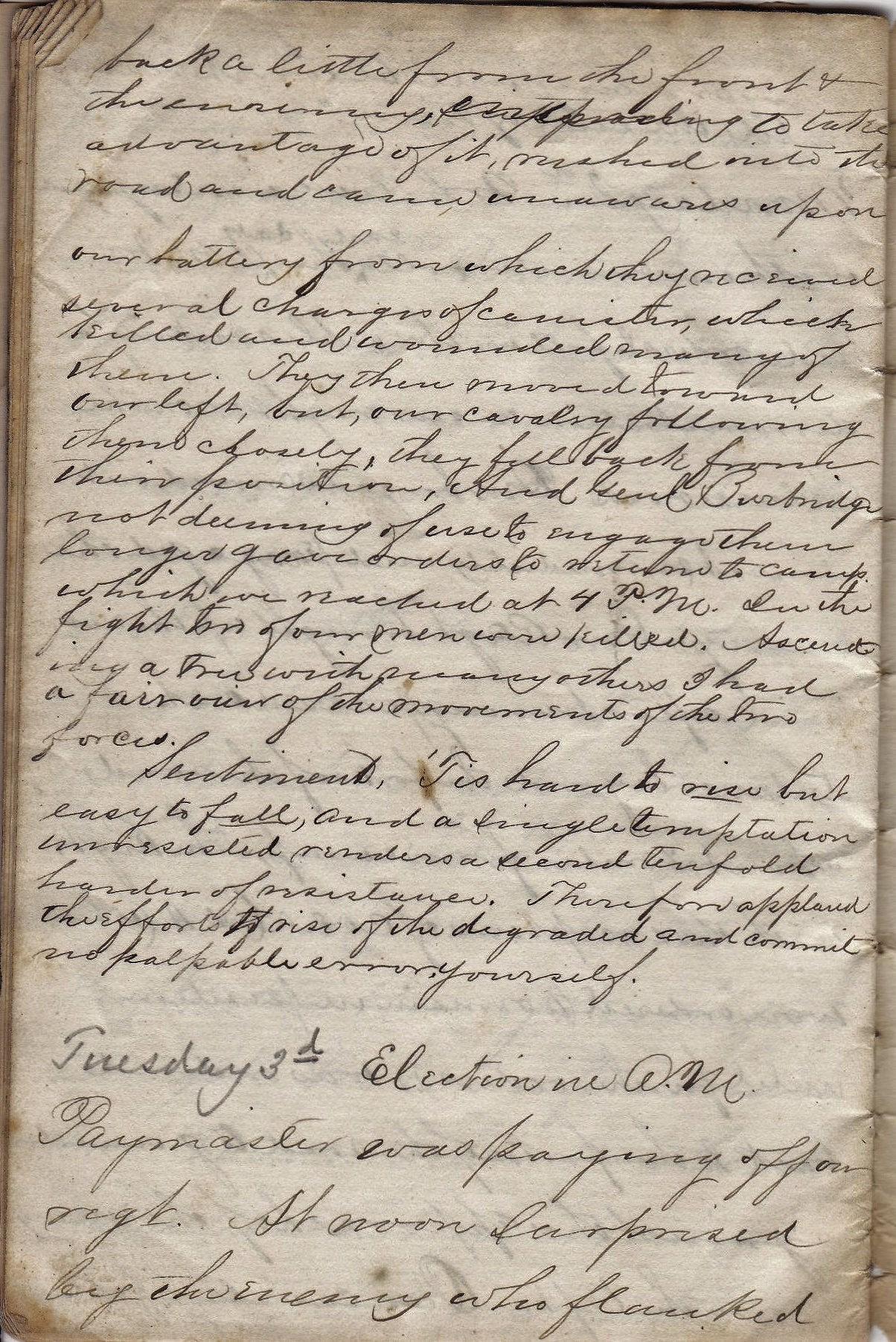

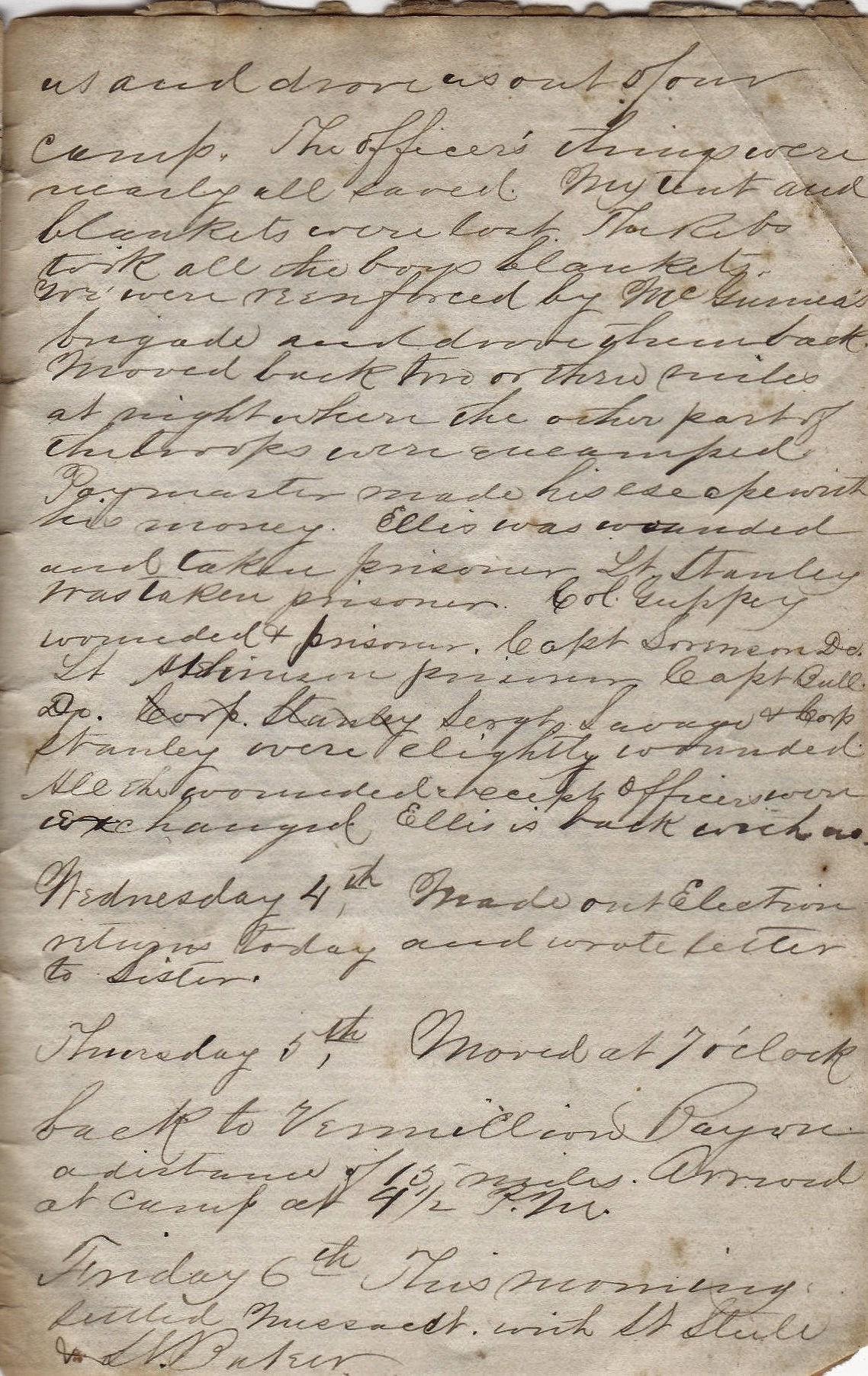

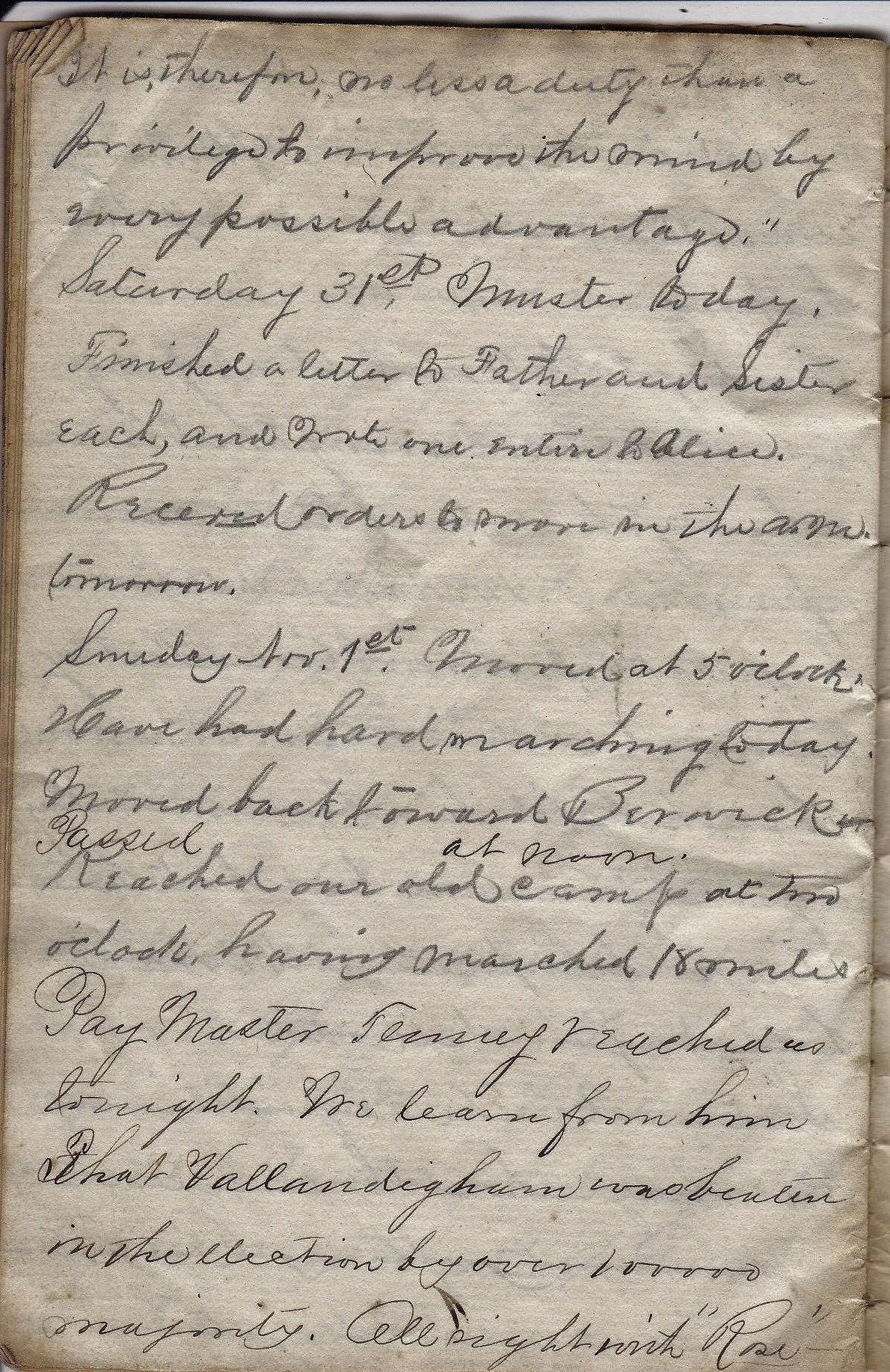





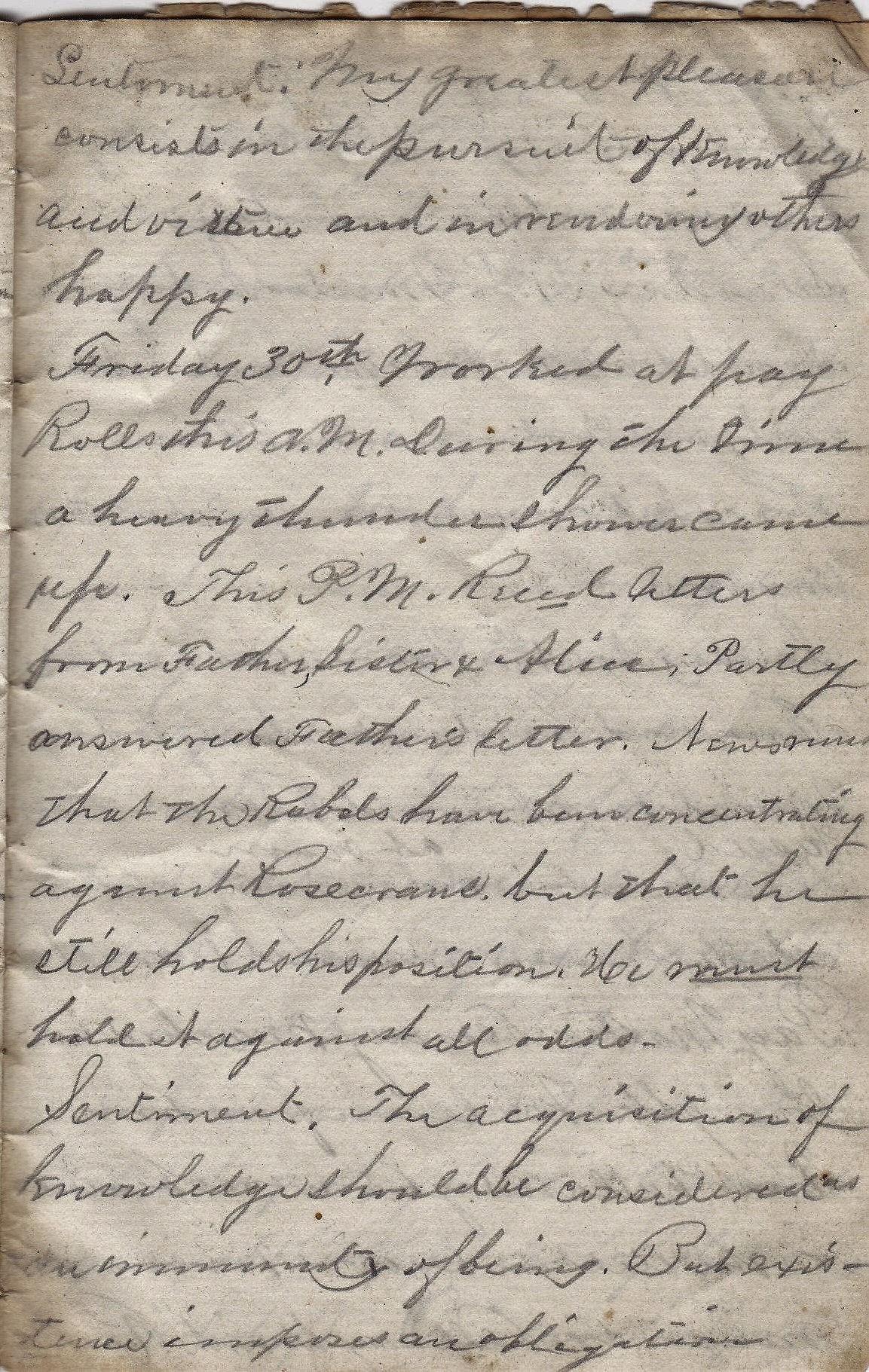

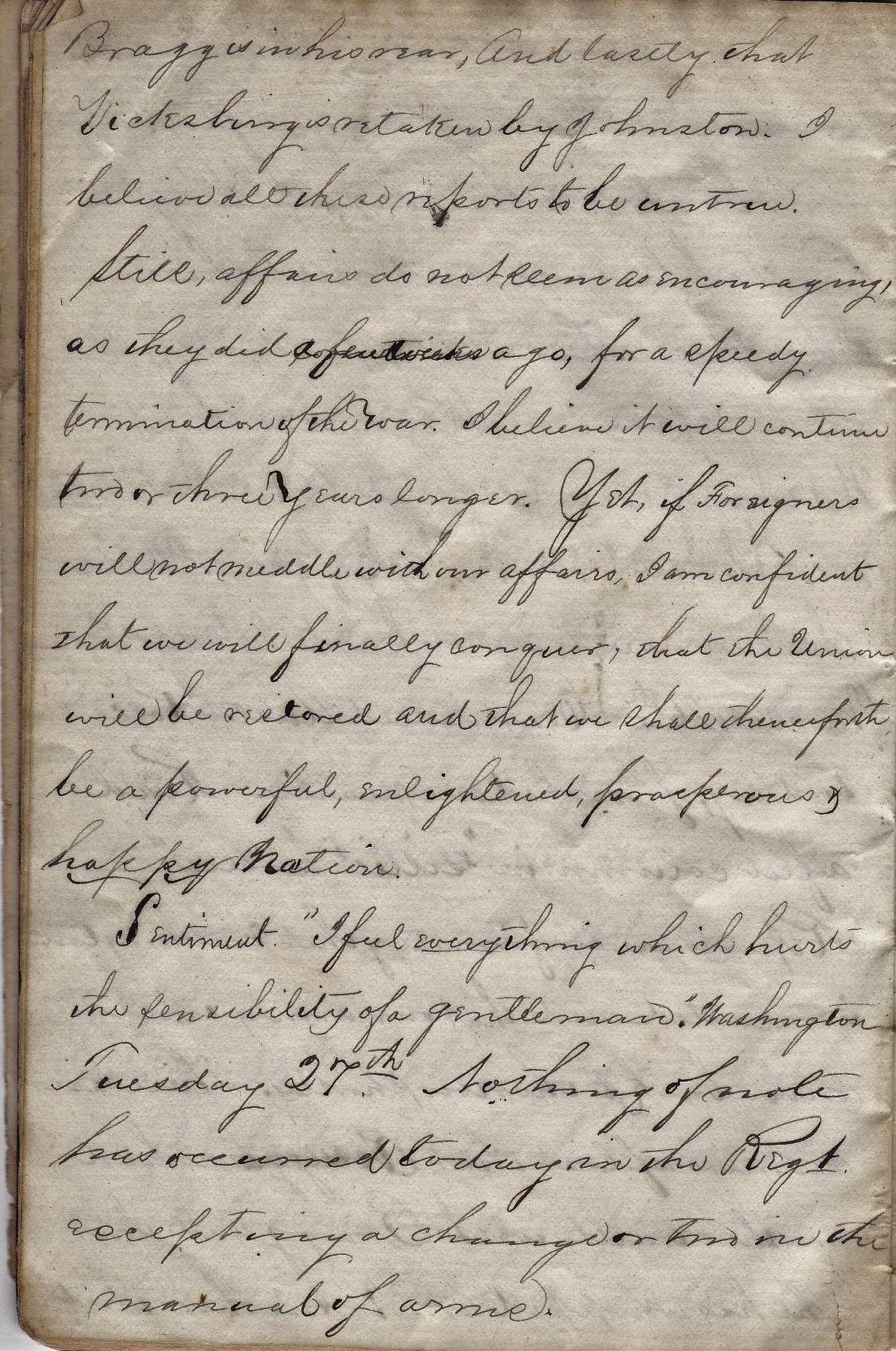

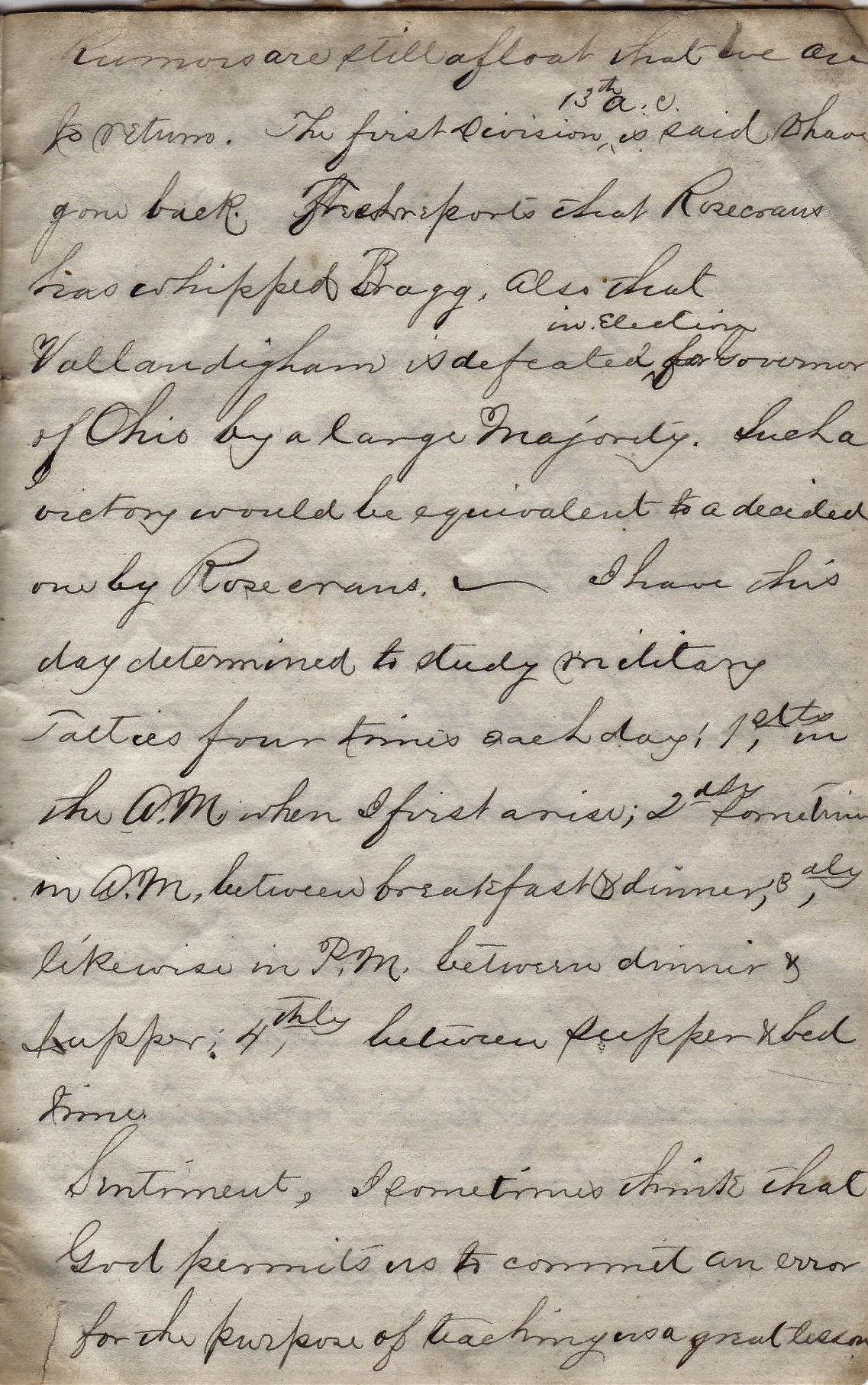

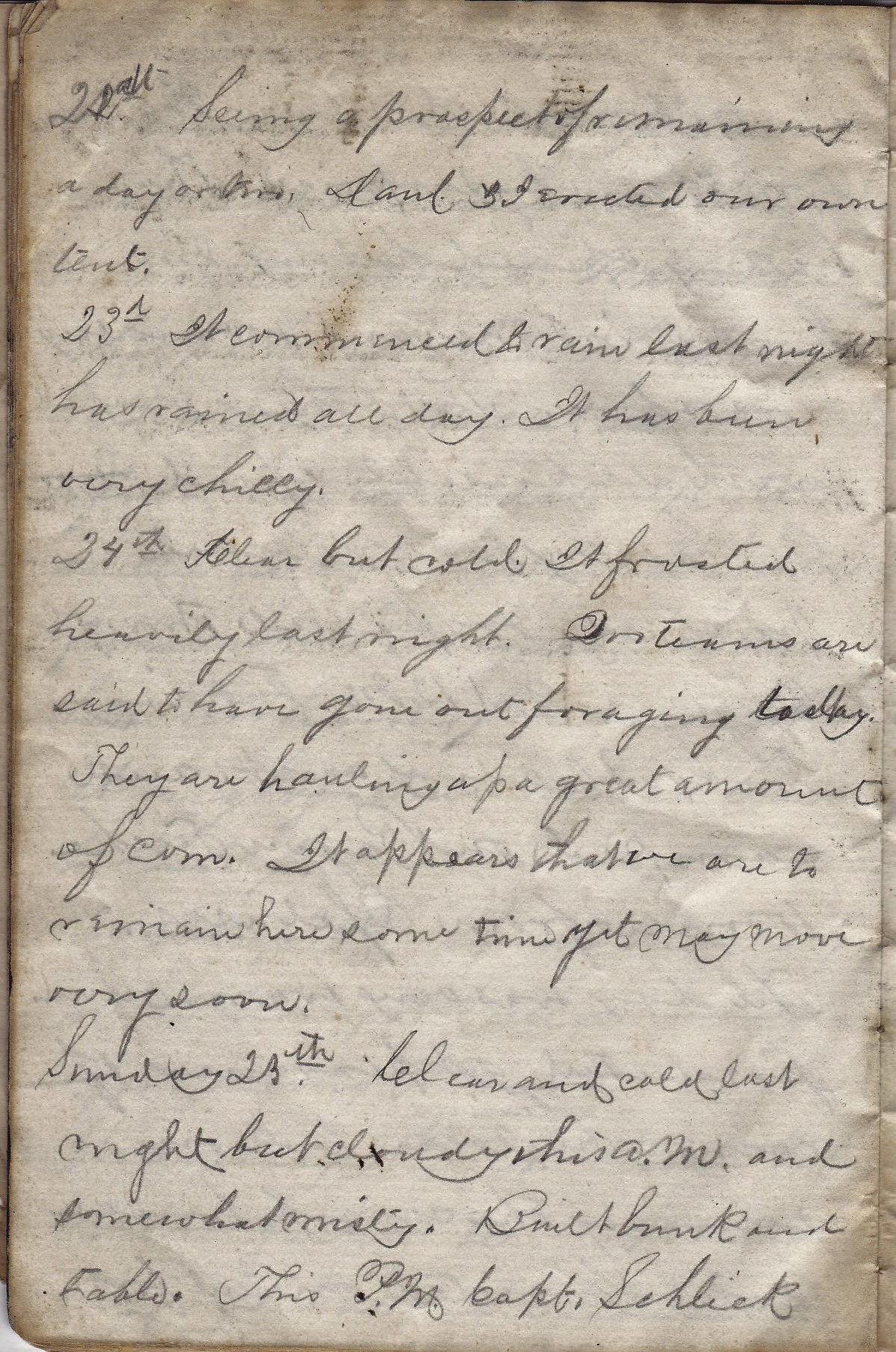

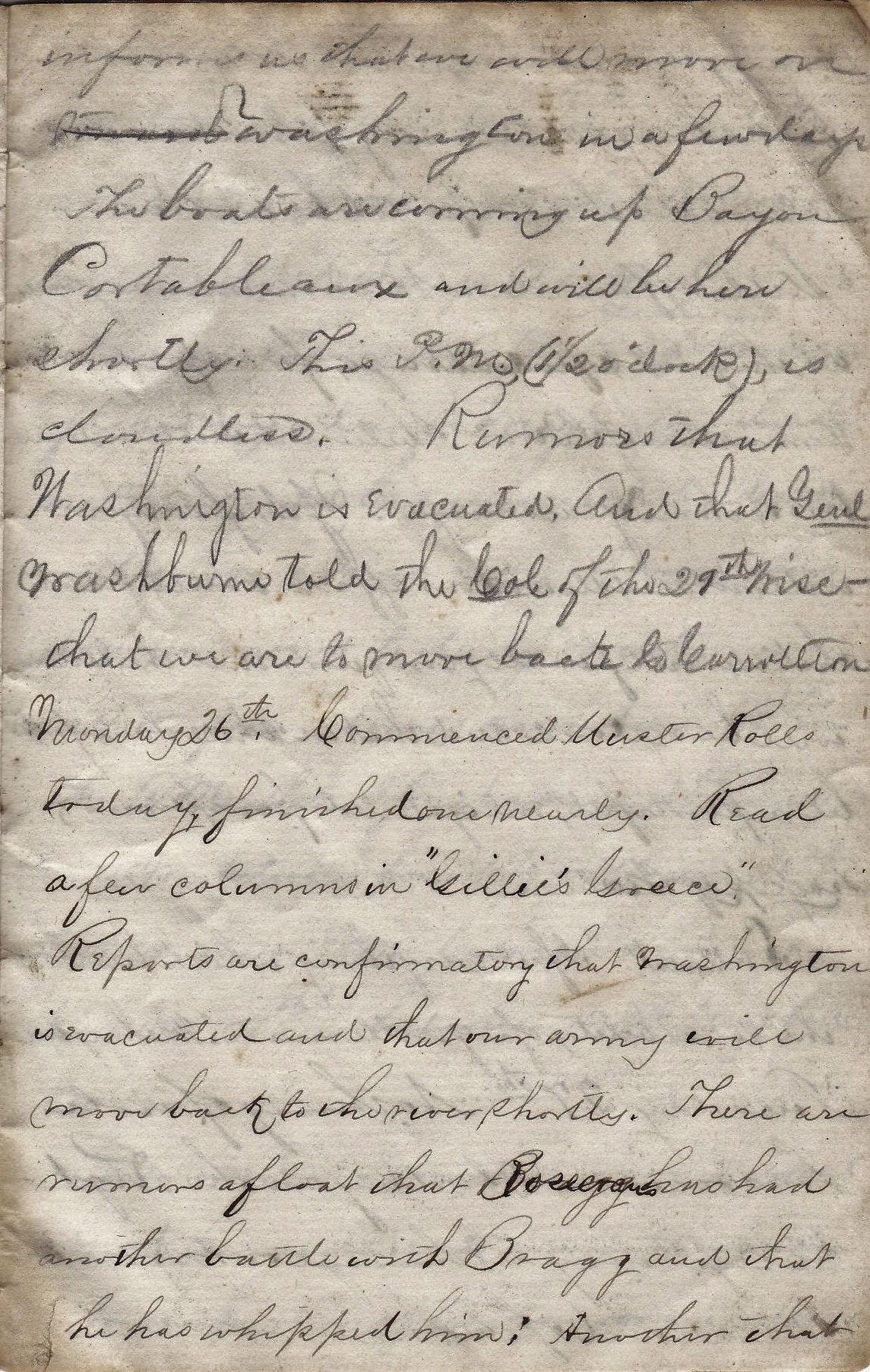

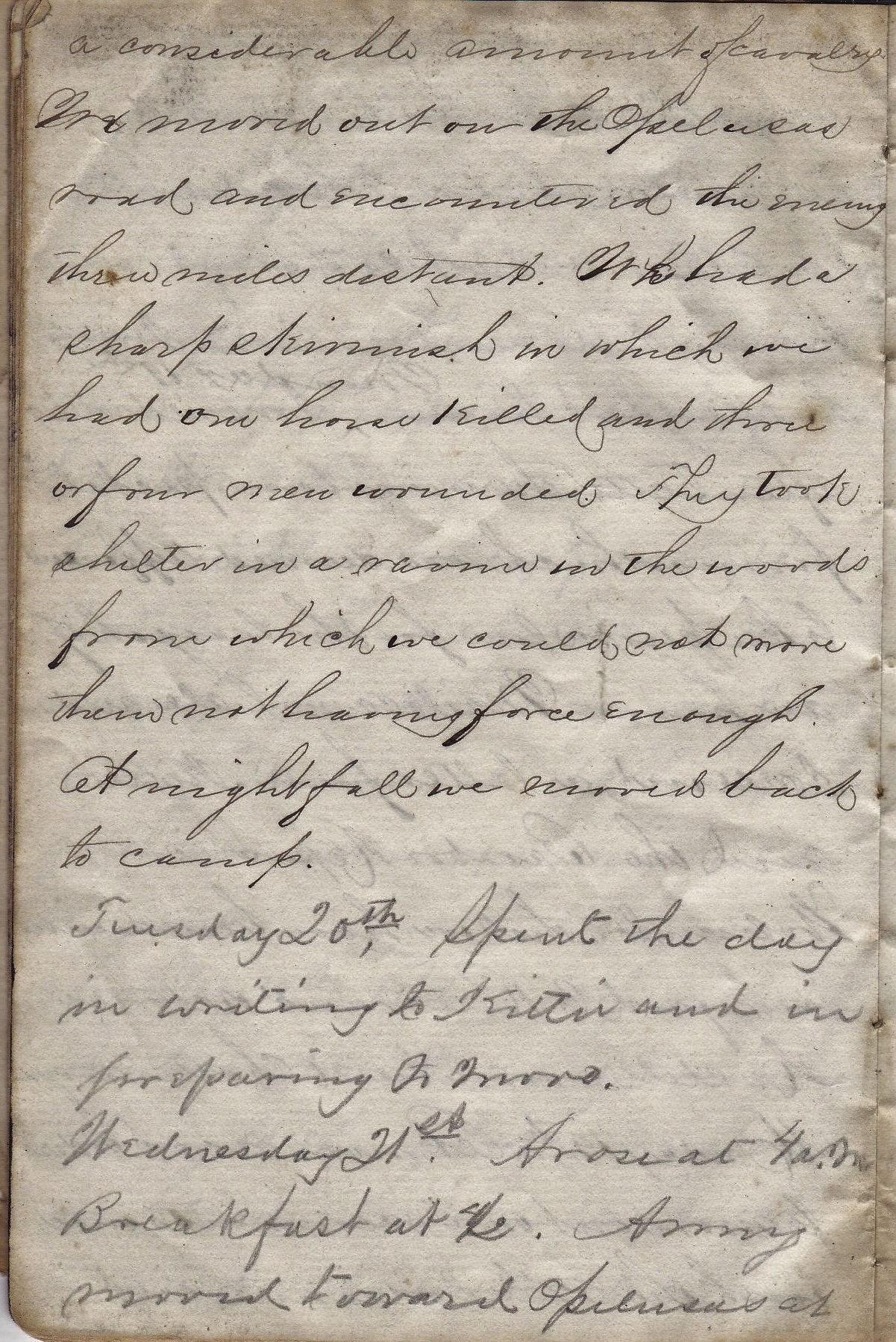

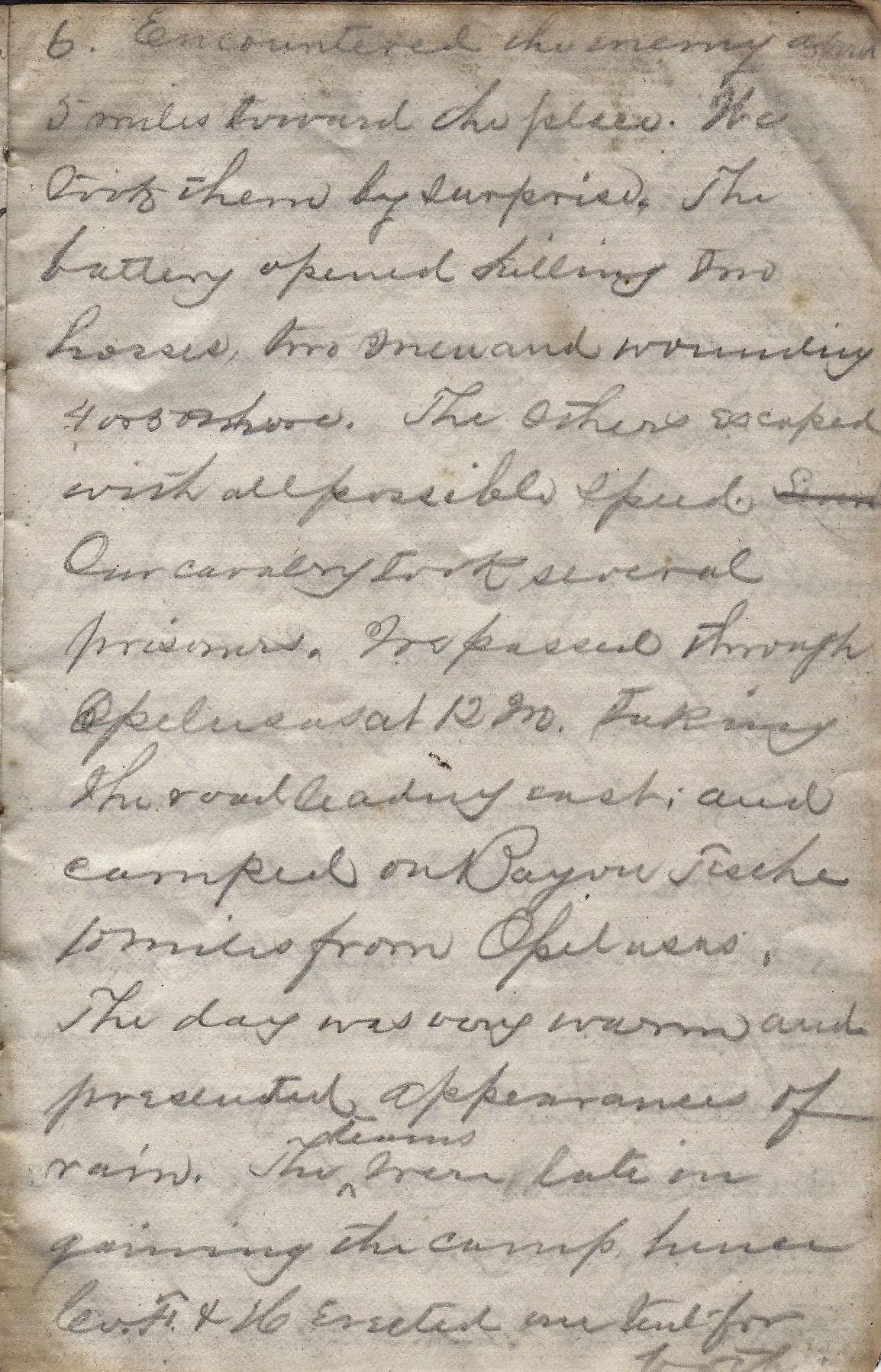

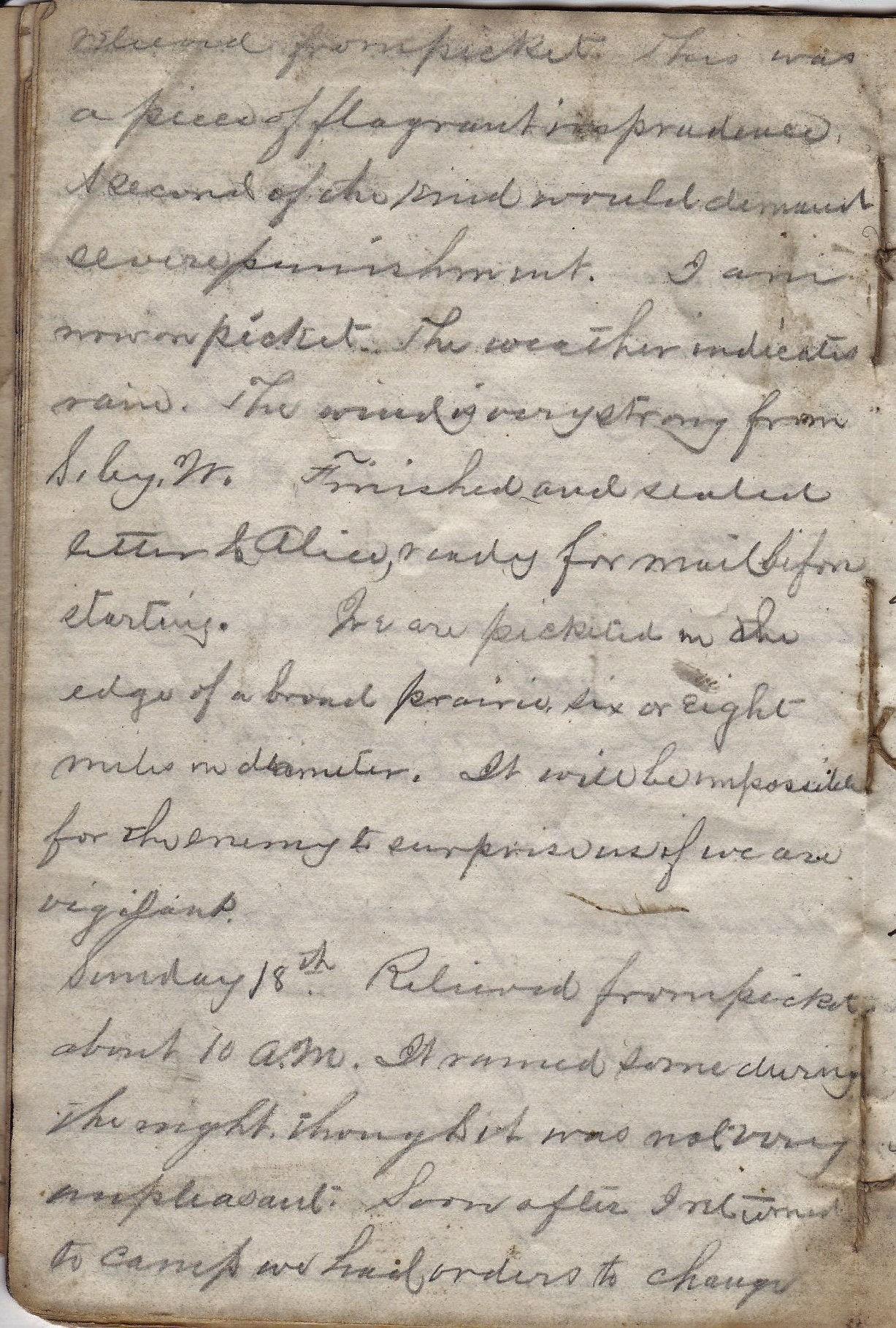





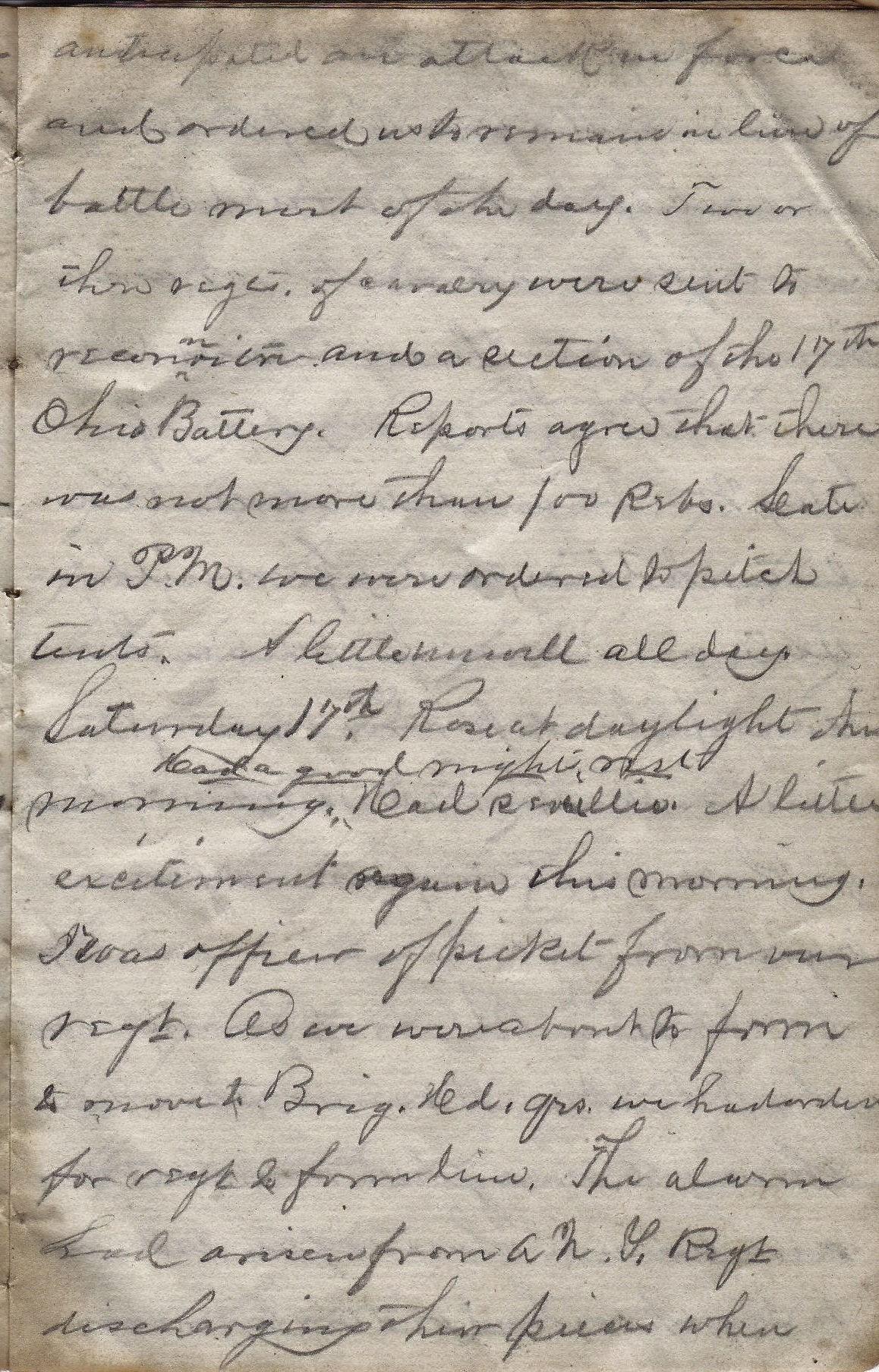











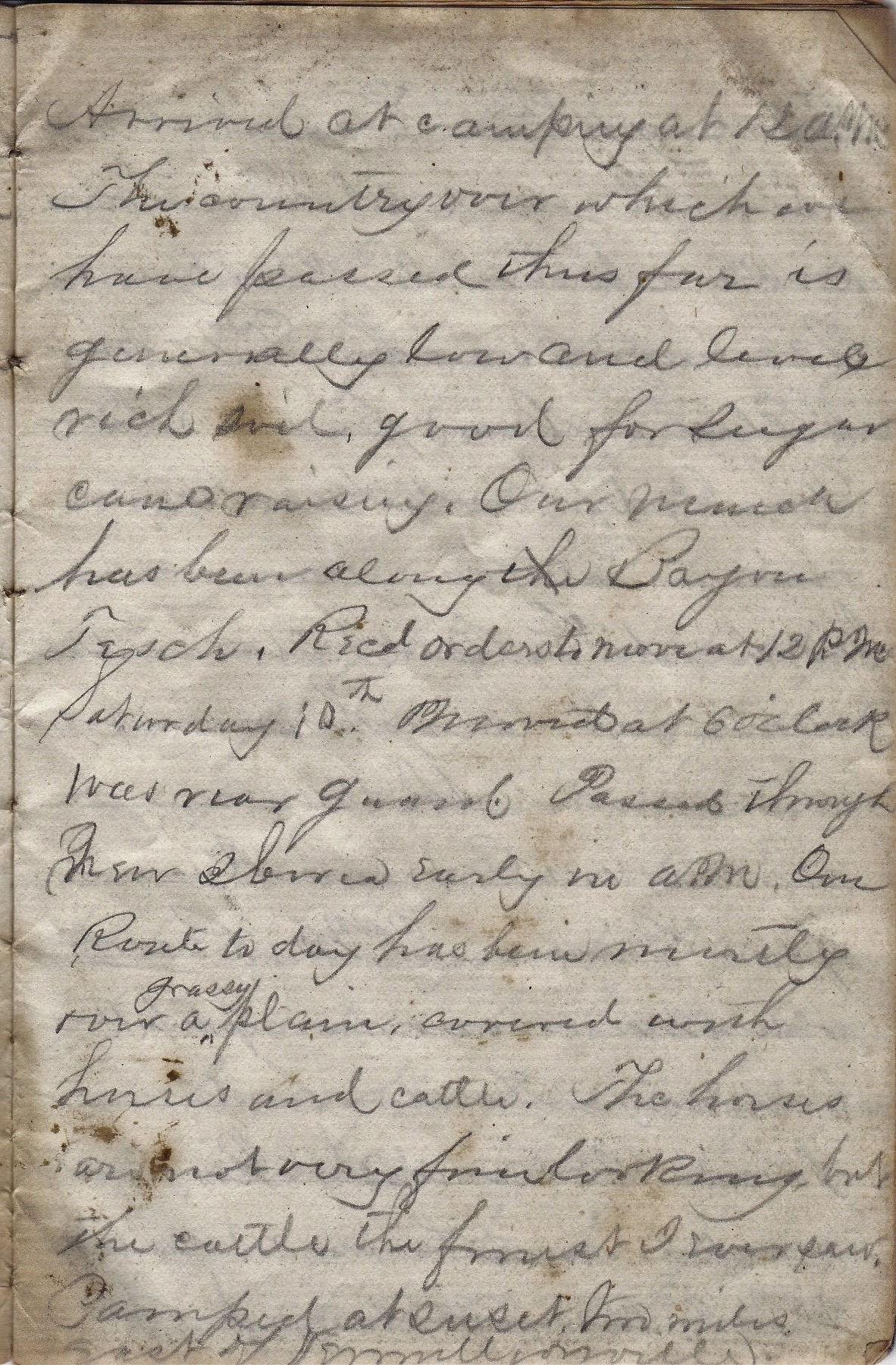

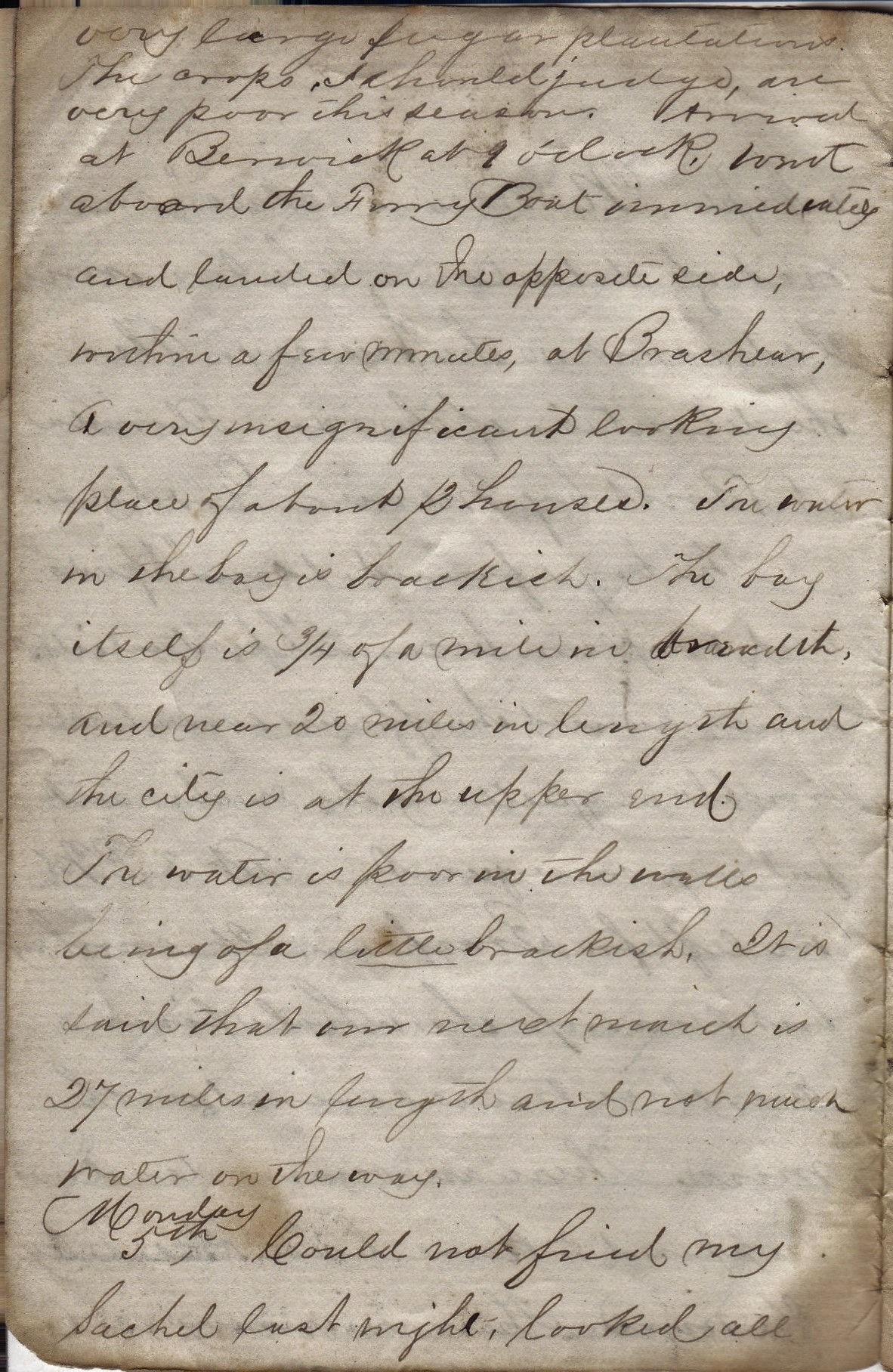

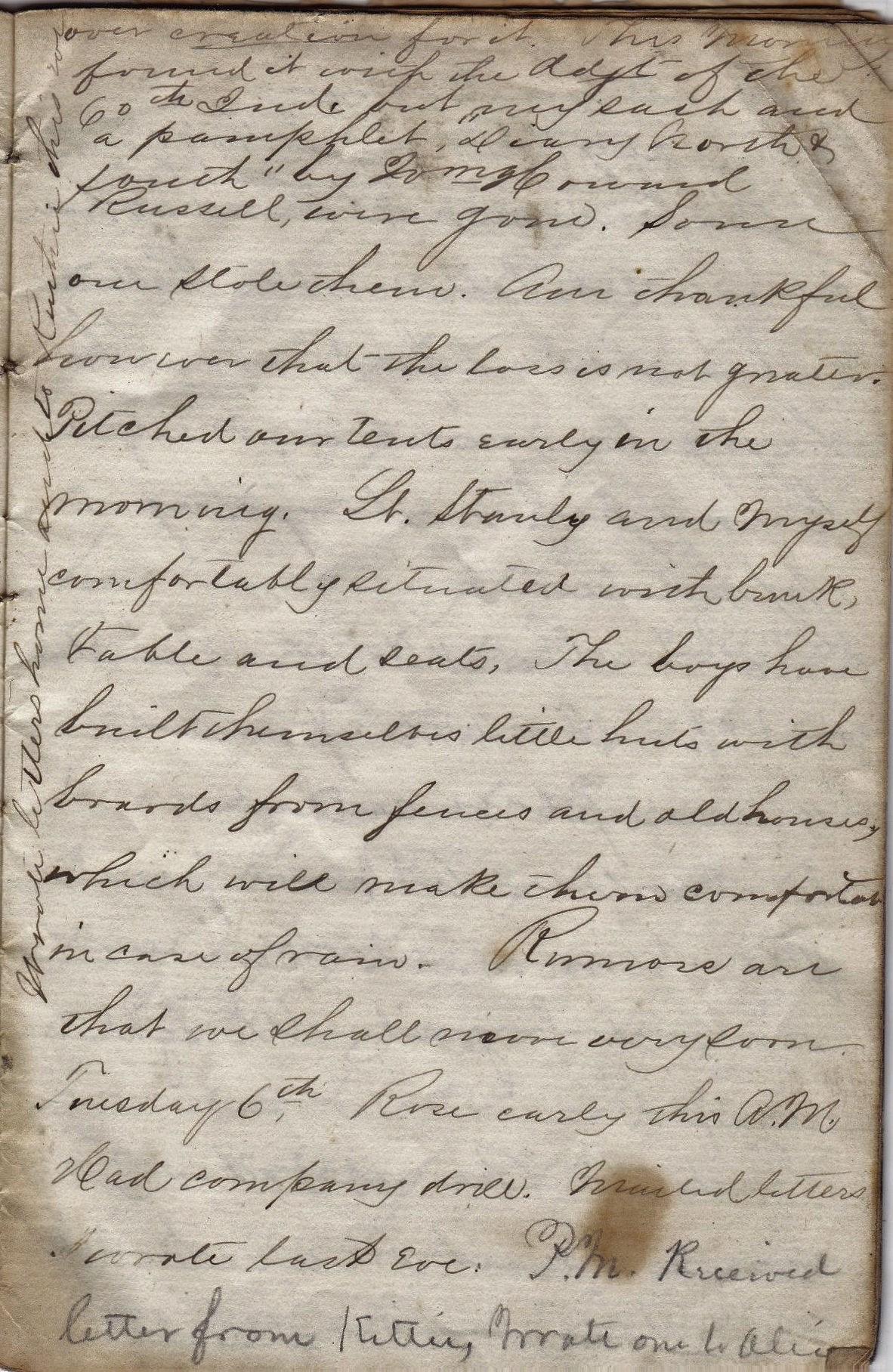



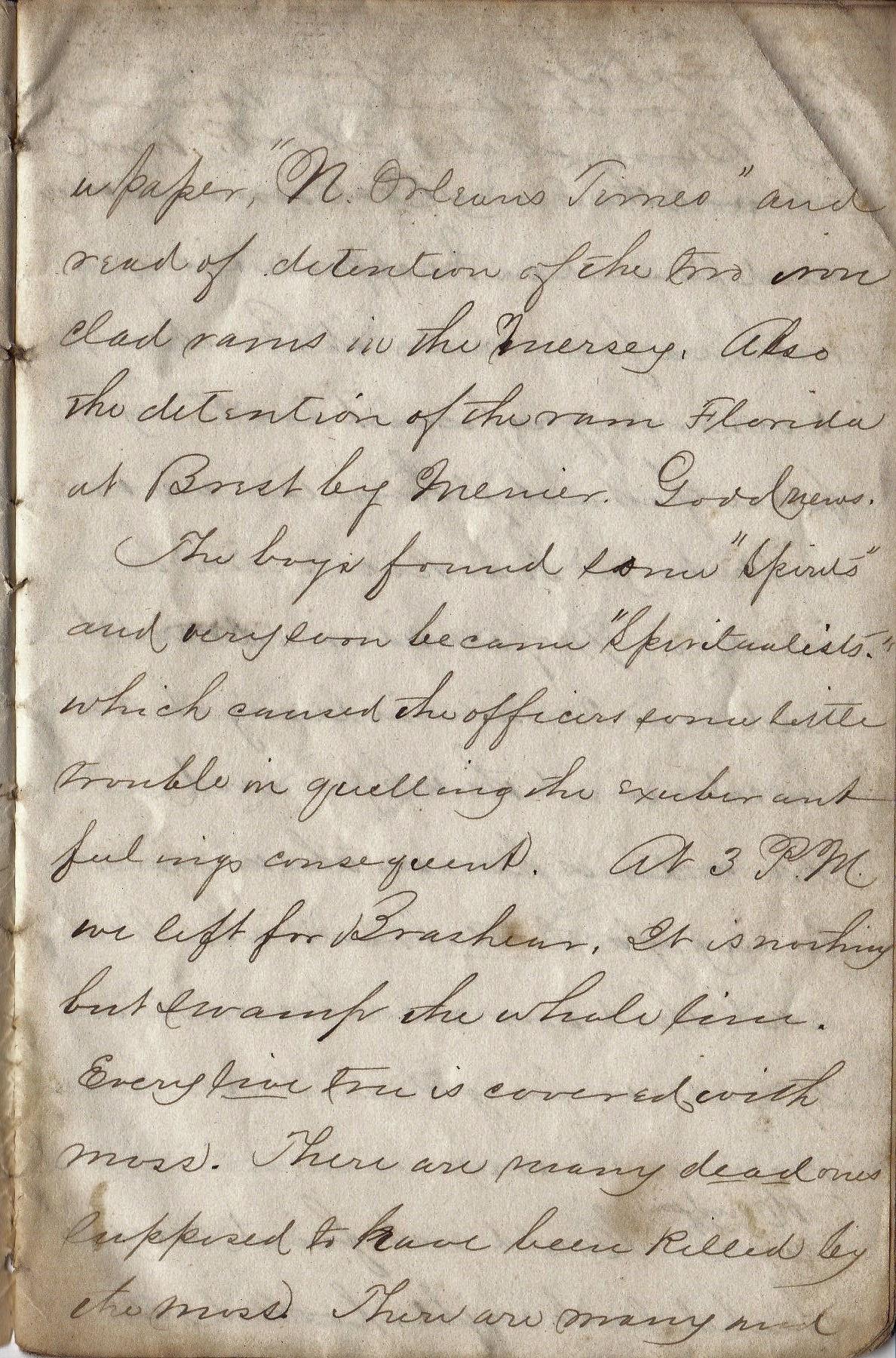

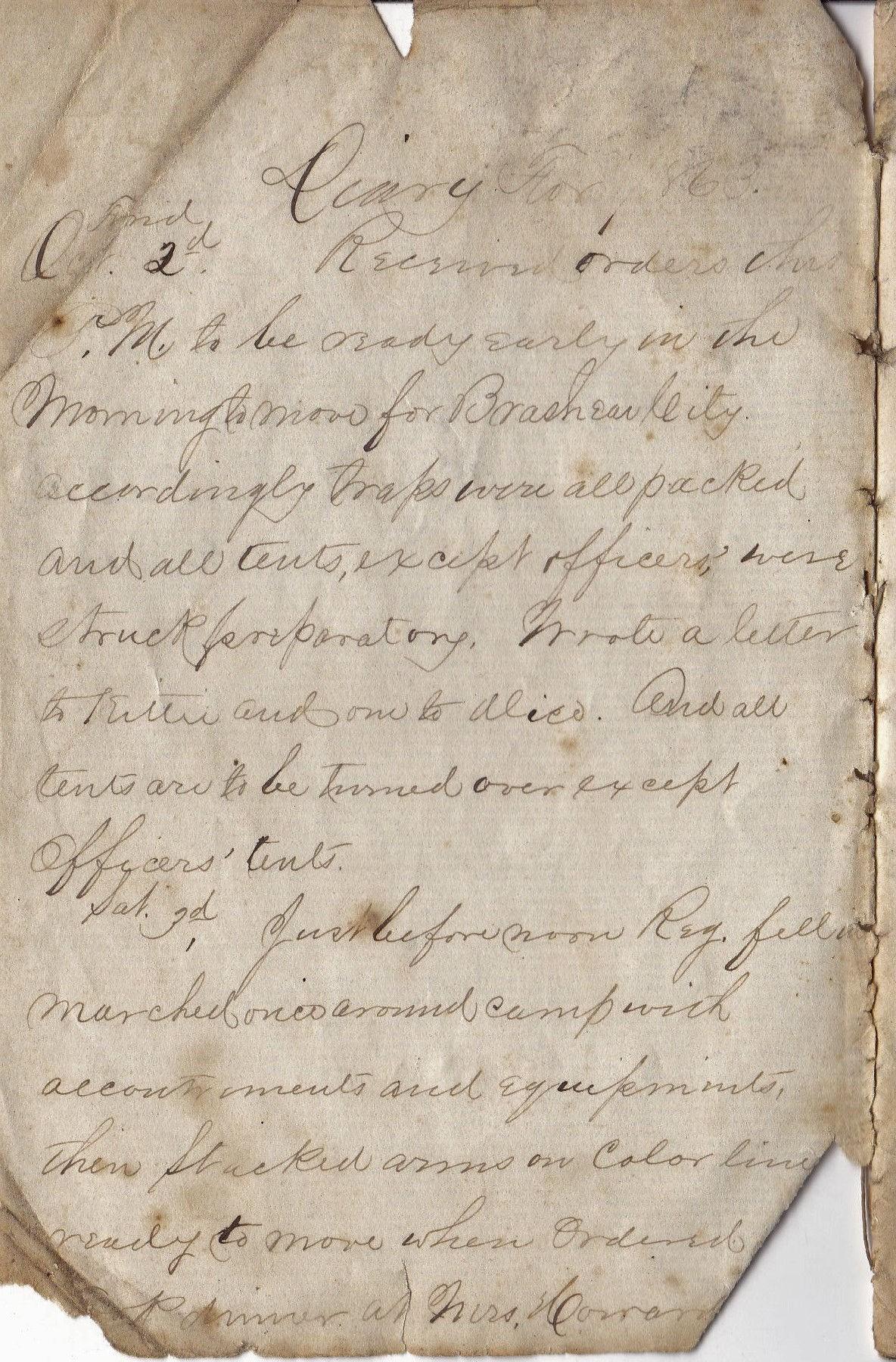


Transcribed on following pages

A little diary was found in a collection of 19th century Crandall Family Papers. Tucked away among newspaper clippings, personal correspondence, and professional papers was a tattered 3inch by 4 inch notebook kept by 2nd Lieutenant Robert B. Crandall in the fall of 1863. Crandall, a native of Mississippi, grew up in Baraboo and joined Company F. 23rd Wisconsin Infantry Volunteers in August, 1862. Early on he achieved the rank of 1st Sergeant but by March 1863 he was promoted to 2nd lieutenant for meritorious conduct.
The 23rd Regiment served in the western theater of the Civil War, primarily along the Mississippi River Valley. They served in the Campaign and Siege of Vicksburg, fought in numerous battles including Arkansas Post, and Sabine Cross Roads, and later they participated in the Red River Campaign and in siege operations around Mobile, Alabama.
In the fall of 1863, the regiment was attached to a expedition up the Bayou Tesche in Louisiana. This expedition was one of those forgotten backwater campaigns which permeated the Civil War. This little diary (it is perhaps no longer than 40 pages or so) is filled with details chronicling not only the campaign but daily mundane routines of Civil War army life. The excerpts shown here were transcribed as they were written, no attempt was made to correct spelling or grammatical errors of the original.
Diary of Robert B. Crandall
The dividend of each was $6.90. Setting down St. Stanley’s Acct. with _____ at $500, I paid minus & Stanley a ___ 8.80. Baker ___ with _.M. up to this date. Amt. $16.46. Sent __________ ows nothing to the good which will not be __________ no ___ to be happy but ____ no other [unreadable].
Wrote to Alice and Ruchic? And made out [&] mailed D_____p Roll to Emary _______.
Sat. 7th. Changed camp from the west side of the Bayou to the East side. We dined and at one o’clock had orders to pack up for chow _____. At two o’clock commenced _____. Marched 8 miles and camped on prairie. Pascal
Rending mateth a full ____; conf____ ____ _____; and therefore of a man unite battle he had said [unreadable] to seem to know that which he doth not know. Pacon
...back a little from the front, and the enemy approaching to take advantage of it, marched into the road and _____ _____was upon our battery from which they received several charges of canister, which killed and wounded many of them. They then advanced toward our left, but our cavalry following them closely, they fell back from their position and Genl. Burbidge not deeming of us to engage them longer gave them orders to return to camp which we marched at 4 PM. In the fight two of our men were killed. Ascending a ____ with many others I had a fair view of the movements of the two forces.
Sentiment, ‘Tis hard to rise but easy to fall and a single temptation __________ renders a second tenfold harder of ___________. Therefore applaud the effort to rise of the degraded and commit no palpable error yourself.
Tuesday, 3rd Election in AM.
Paymaster was paying off our regt. At noon surprised by the enemy who flanked us out of our camp. The officer’s things were nearly all saved. My tent and blankets were lost. The Rebs took all the boys blankets. We were reenforced by Mc Gu_____’s brigade and drove them back. Moved back two or three miles at sight where the other part of the troops were encamped. Paymaster made his escape with the money. Ellis [Corp. Elisha W. Ellis] was wounded and taken prisoner. Lt. Stanley was taken prisoner. Col Guppey wounded & taken prisoner [at Carrion Crow Bayou, LA]. Capt. So__son & Lt. ______ prisoner. Capt Bull D_. Capt Stanley Sergt. ______ and Capt Stanley were slightly wounded. All the wounded except the officers were exchanged. Ellis is back ____ ___.
Wednesday 4th Made our Election returns today and wrote letter to sister.
Thursday 5th Moved at 7 O’clock back to Vermilion Bayou a distance of 15 miles. Arrived at camp at 4 ½ pm.
Friday 6th This morning settled ________ with Lt. [Daniel C.] Stanley & Lt. Baker?
“It is therefore no less a duty than a privilege to improve the mind by every possible advantage.”
Saturday 31st Muster today. Finished a letter to Father and Sister each and wrote one entire to Alice. Received orders to move in the a.m. tomorrow.
Sunday Nov. 1st. Moved at 5 o’clock. Have had hard marching today. Moved back toward Berwick. Reached our old camp at 2 o’clock having marched 18 miles. Paymaster Fennry(?) reached us tonight. We learn from him that Vallandigham was beaten in the election by over 100,000 majority. “All right with Rose” “Sentiment. Write what you feel and your writing will be worth reading until the end of time.”
Monday [Nov.] 2nd While we were engaged with our muster all Thurs a.m. we had orders to fall in the rebels making a demonstration on our right on another Opelousas road. Our brigade moved out almost immediately engaged the enemy. Our regiment brought up the rear and after having passed a short distance beyond the forks of the road about 2 miles from camp the Regt. with the exception of Cos D&A (who were ordered to remain in position until further orders) were ordered back to the forks of the road to guard against the approach of the enemy from the left. Our cavalry fell ……
Wednesday 28th. Battalion drill in the manual of arms this a.m. Co. drill in the manual and also Battalion drill in loadings & firings direct & oblique. Studied tactics today. Went on picket, had a good time of it. Sentiment is “A day __ is the greatest promulgation of morality.”
Thursday 29th. Commenced to rain at 5 ½ o’clock this a.m. and continued until noon. The 2nd Brig of the 3rd divis. Moved back toward Opelousas. The weather clear this P.M. Picketing a little _____ last night & today on account of gorillas in this vicinity.
Sentiment. “My greatest pleasure consists in the pursuit of knowledge and virtue and rendering others happy.
Friday 30th . Worked at pay Rolls this A.M. During the time a heavy thunder shower came up. This P.M. read letters from father, sister & Alice. Partly answered fathers letter. News ___ that the Rebels have been concentrating against Rosecrans. But that he still holds his position. We must hold it against all odds. Sentiment. The acquisition of knowledge should be considered as an necessity of being. But existence imposes an obligation. Bragg is in his rear and lastly that Vicksburg is retaken by Johnston. I believe all these reports to be untrue.
Still, affairs do not seem as encouraging as they did a few weeks ago, for a speedy termination of the war. I believe it will continue two or three years longer. Yet, if foreigners will not meddle with our affairs, I am confident that we will finally conquer, that the Union will be restored and that we shall therefore be a powerful, enlightened prosperous happy nation.
Sentiment. “I feel everything which hurts the sensibility of a gentleman.” Washington.
Tuesday 27th. Nothing of note has occurred today in the Regt. accepting a change on two of the manual of arms.
Rumors are still afloat that we are to return. The first Division 13th a.c. is said to have gone back. _____ reports that Rosecrans has whipped Bragg. Also that Vallandigham is defeated for governor of Ohio by a large majority. Such a victory would be equivalent to a decided one by Rosecrans. I have this day determined to
study military tactics four times each day. 1st in the A.M. whin I first arise; 2nd sometime in the A.M. between breakfast & dinner; 3rd likewise in P.M. between dinner & supper; 4th between supper and bed time. Sentiment, I sometimes think that God permits us to commit an error for the purpose of teaching us a good lesson.
22nd. Seeing a prospect of remaining a day or two, Danl [1st Lt. Danial C. Stanley] and I erected our own tent.
23rd. It commenced to rain last night, has rained all day. It has been very chilly.
24th. Clear but cold. It frosted heavily last night. Our teams are said to have gone out foraging today. They are hauling up a great amount of corn. It appears that we are to remain here some time yet may move very soon.
Sunday 25th . Clear and cold last night but cloudy this a.m. and somewhat misty. Built bunk and table. This P.M. Capt. Schlick. Informed us that we would move on Washington in a few days. The boats are coming up Bayou Courtableau and will be here shortly. This P.M. (1/2 o’clock), is cloudless. Rumors that Washington is evacuated, and that Genl. Washburn told the Col. of the 29th Wisc that we are to move back to _______ [a city].
Monday 26th . Commenced muster rolls today, finished one nearly. Read a few columns in “_illie’s “. Reports are confirmatory that Washington is evacuated and that our army will move back to the river shortly. There are rumors afloat that Rosecrans had another battle with Bragg and that he has whipped him. Another that a considerable amount of cavalry has moved out on the Opelousas road and encountered the enemy three miles distant. We had a sharp skirmish in which we had our horse killed and three or four men wounded. They took shelter in a ravine in the woods from which we could not move them not having force enough. At nightfall we moved back to camp.
Thursday 20th. Spent the day in writing to Kittie and in for spring to move.
Wednesday 21st. Arose at 4 a.m. Breakfast at 4 ½. Army moved toward Opelousas at 6. Encountered the enemy around 5 miles toward the place. We caught them by surprise. The battery opened, killing two horses, two men and wounding 4 _____. The others escaped with all possible speed. Our cavalry took several prisoners. We passed through Opelousas at 12 p.m., taking the road leading east; and camped on Bayou Fisher 10 miles from Opelousas.
The day was very warm and presented appearances of rain. The ____ were late in gaining the camp house ____ & we ____ our ___ for both.
Returned from picket. This was a piece of flagrant imprudence ______ of the mind would demand severe punishment. I am now on picket. The weather indicates rain. It rain is very strong from S. by W. Finished and sealed letter to Alice, ready for mail before starting. We are picked in the edge of a broad prairie six or eight miles in diameter. It will be impossible for the enemy to surprise us if we are vigilant.
Sunday 18th . Relieved from picket about 10 a.m. It rained some during the night, though it was not very unpleasant. Soon after internment to camp we had orders to change camps immediately. Having opportunity to mail letters, I deposited the one I had written to Alice and while the regt. was moving to its new location, I wrote half a sheet home. Immediately after Tatto, there was some picket firing which was deemed sufficient to keep us in line for the length of our hour. Mail came late and I received a letter from Kittie sent to “Baraboo Republic.”
We learn too, that we have been deceived in regard to Rosecrans victories. We still remain at Chattanooga.
Monday 19th At noon reced orders to move out on a [reconnoiter] with the 34th Indiana and a considerable amount of cavalry. We moved north out of the Opelusas road and encountered the enemy three miles distant. We had a sharp skirmish in which we had one horse killed and three or four men wounded. They took shelter in a ravine in the woods from which we could not move them not having force enough at night fall we moved back to camp.
Friday 16th. The Col. (Guppey) anticipating a flank attack had is up at 4 o’clock and ordered breakfast immediately. But Col Owen, commdg the Brig. seeing the fires ordered them to be put out until daylight. Late in the morning we were ordered to camp a little in advance on our bivouac and while we were forming line for camp our cavalry videttes were driven by the enemy. Genl. Burbridge anticipated an attack in force and ordered us to remain in line of battle most of the day. Two or three regts. of cavalry were sent to reconnoiter and a section of the 17th Ohio Battery. Reports agree that there was not more than 100 Rebs in P.M. we were ordered to pitch tents. A little [rain] all day.
Saturday 17th. Rose at daylight this morning. I was officer of picket from our regt. As we were about to form to move to Brig. Hd. Qrs. We had orders for regt to form line. The alarm had arisen from a N.Y. Regt discharging their pieces when relieved from picket. This was a piece of flagrant imprudence. A second of the kind would demand severe punishment. I am now on picket. The weather indicates rain. The wind is very strong from S. by W. Finished and sealed letter to Alice, ready for mail before starting. We are picketed in the edge of a broad prairie six or eight miles in diameter. It will be impossible for the enemy to surprise us if we are vigilant. Relieved from picket about 10 a.m. It rained some during the night though it was not very unpleasant. Soon after I returned to camp we had orders to change camps immediately. Having an opportunity of mail letters I deposited the one I had written Alice and while the regt. Was moving to its new location I wrote half a sheet home. Immediately after tatto, there was some picket firing which was deemed sufficient to keep us in line for the length of an hour. Mail came late and I recived a letter from Kittie and the “Baraboo Republic.” We learn, too, that we have been deceived in regard to Rosecran’s victories. He still remains at Chattanooga.
Wednesday 14th. Arose this morning before sunrise and attended roll call. Studied tactics before breakfast. After breakfast I commenced writing to Alice and Lt. Stanley went with the company on battalion drill in the manual of arms. During the drill we received orders to move camp. I packed up our “duds” and the Regt. moved immediately, (our?) camp about ½ mile from our former. We pitched tents and were nicely settled down again by noon. Did nothing but converse until dress parade, upon which Genl. Ord received us and spoke some rather boyish words to the officers about the resent orders in regard to mar____. Our dress parade was fine. The moving improved greatly in the manual since the morning drills commenced. Since dark hour (heard) cannonading to the north east or rather north-north east. Conclude it is merely a skirmish, wrote ___ to Alice. Must write to Kettie tomorrow.
Thursday 15th. While on Battalion Drill this mourning Reced orders to move withing ten minutes notice with two days rations. We prepared accordingly and moved within an hour and a half from the time we reced the order. I, at first, supposed we were ordered to support the 19th Corps as they were then fighting some 13 miles distant. But we guarded the supply train. Perhaps it was for both these objects we were ordered out. [However] the enemy soon fled not being in large force. Our brigade lay in line of battle on the battle ground of the morning, during the night.
Sunday 11th. Rose at sun rise. Mended shirt then wrote a letter to Kittie + [Marrion] each. P.M. wrote to Alice. Dress parade this eve. Gen Ord present He criticized our manual of carry arms.
Monday 12th . Had battalion drill in manual of arms this morning. Also assisted Lt. Stanley in making out Ordnance Returns for 3rd quarter. P.M. Reced orders to move our camp to better [locality] this [evening] had dress parade. It is said that Gens Frank and Banks have returned to [New Orleans] to make some further arrangements and that we shall remain here until they return.
Tuesday 13th. Battalion drill in manual of arms this morning. It commenced raining this morn[ing] about one o’clock. W____ a very heavy shower. But the clouds have disappeared and it became a very fair day. Our present camp is on a Millikan Bayou near ______ _____. Lieut. Stanley and I have promised each other to refrain in the use of profane language and to correct each other whenever one or the other forgets himself. ______ worthy to be kept. Received order (unreadable) _____ operations accordingly.
Wednesday 7th. Rose at 4 o’clock. Struck tents immediately after and moved. Passed a small plain called Pattersonville. Rested an hour at noon for dinner. The boys got a number of oranges. Camped on a large sugar plantation.
Thursday 8th. Rose at 4 o’clock A.M. Started at 6 ½. In a.m. passed a small place called Centreville. At noon passed Franklin, and took dinner one mile beyond. At night camped.
Friday 9th. Rose at 3 o’clock commenced march at 4 ½. Passed Centreville in a.m. Arrived at camping at 12 a.m. The country over which we have passed thus far is generally low and level rich soil, good for sugar cane raising. Our march has been along the Bayou Tesch. Recd. Orders to move at 12 p.m.
Saturday 10th . Moved at 6 o’clock was rear guard. Passed through New[?] ______ early in a.m. Our route to day has been mostly over a grassy plain, covered with horses and cattle. The horses are not very fine looking, but the cattle the finest I ever saw. Camped at Iuset[?] two miles east of _____ville.
Monday 5th. Could not find my satchel last night. Looked all over creation for it. This morning found it with the Adgt of the 60th Ind. But my sash and a pamphlet, “Diary North & South” by Wm Howard Russell, were gone. Some one stole them. Am grateful however that the loss is not greater. Pitched our tents early in the morning. Lt. Stanley and myself comfortably situated with bunk, table and seats. The boys have built themselves little huts with boards from fences and old houses which will make them comfortable in case of rain. Rumors are that we shall move very soon. Wrote letter home and to Ruthie this eve.
Tuesday 6th. Rose early this a.m. Had company drill. Mailed letters wrote last eve. P.M. Received letter from Kattie, wrote one to Alice.
Sunday 4th. Arose a little before sunrise, had an early breakfast of potatoes and squash pie which I purchased of a woman. We expect to move at 9 o’clock but the train didn’t arrive on time. While waiting, bought newspaper, “N Orleans Times” and read of detention of the two iron clad rams in the Juersey. Also the detention of the ram Florida at Brest by [Menier]. Good news. The boys found some “spirits” and very soon became “spiritualists” which caused the officers some little trouble in quelling the exuberant feelings consequent. At 3 P.M. we left for Brashear. It is nothing but swamp the whole line. Every live tree is covered with moss. There are many dead ones supposed to have been killed by the moss. There are many and very large sugar plantations. The crops I should judge are very poor in this season. Arrived at Berwick at 9 o’clock went aboard the ferry boat immediately and landed on the opposite side within a few minutes. At Brashear, a very insignificant looking place about 12 houses. The water in the bay is brackish. The bay itself is 3/4 of a mile in breadth and 20 miles in length and the city is at the upper end. The water is poor in the wells being of a little brackish. It is said that our next march is 27 miles in length and not much water on the way.
Friday Oct 2 Received orders this P.M. to be ready early in the morning to move for Brashear City. Accordingly traps were all packed and all tents, except officers, were struck. Wrote a letter to Kitty and one to Alice. And all tents are to be turned over except officers tents. Sat 3rd. Just before noon reg fell in and marched once around camp with accoutrements and equipment, then stacked arms on color line ready to move when ordered [had] dinner at Mrs. Conrads.
At about 4 P.M. recd orders to move on to Transport “North America,” an old Hudson river steamer, walking beam. Runs very still with the additional quality of running very slow. We landed at Algiers. Opposite N.O. [New Orleans] very late after dark. Did not receive immediate orders to debark, hence the men stretched themselves out for a little sleep. At 10 ½ o’clock moved off the boat and proceeded to take passage on the cars. When near half the reg. was on, all were ordered to remain until [undecipherable] but companies B & E proceeded to the depot and took shelter under its projecting eaves. The hard ground, covered with small shells did not make a very comfortable bed. Lt. Stanley and myself were minus our blankets, having sent them with the officers baggage.
1880
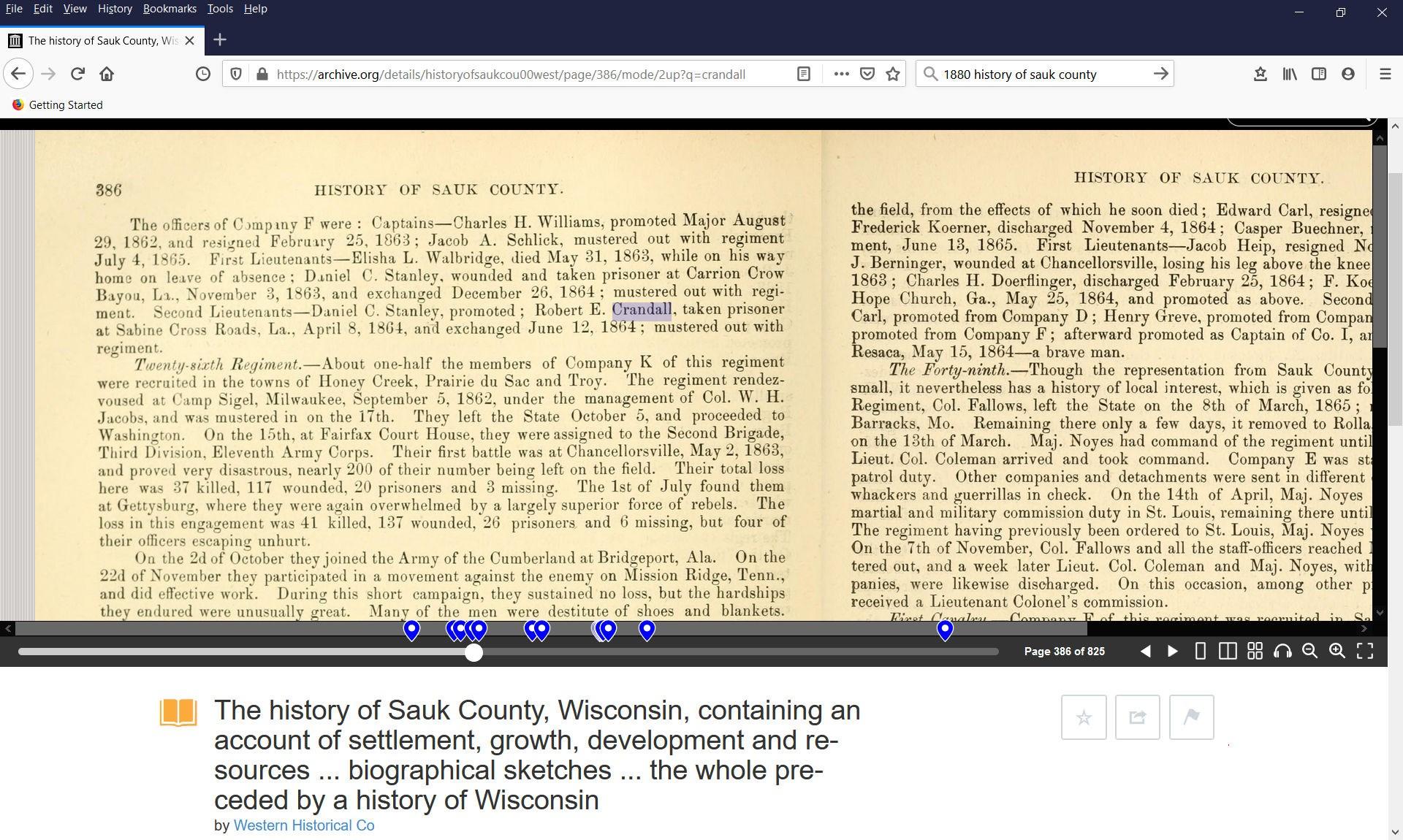


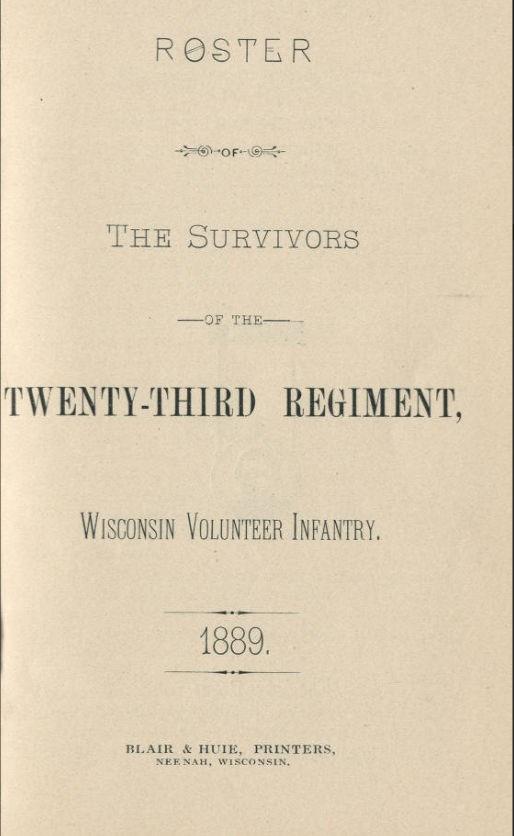
 From the collection of Beverly Cabbage 2020
From the collection of Beverly Cabbage 2020

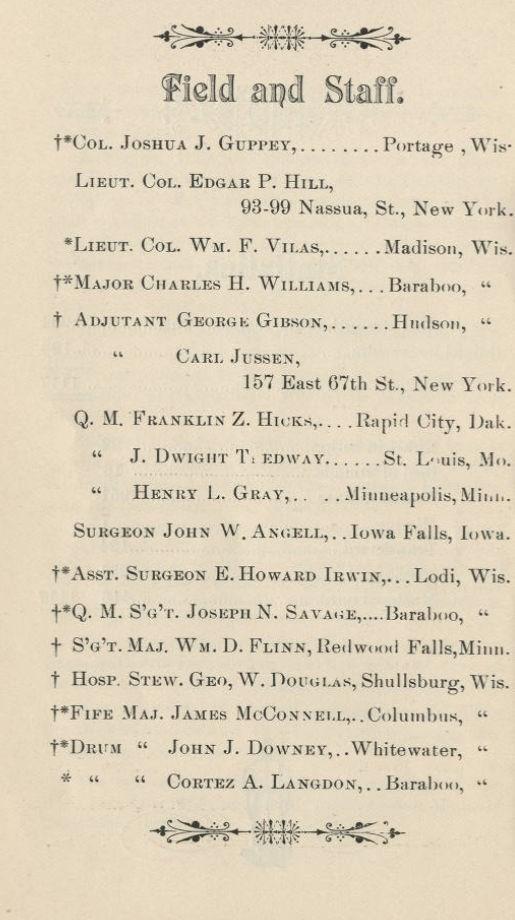


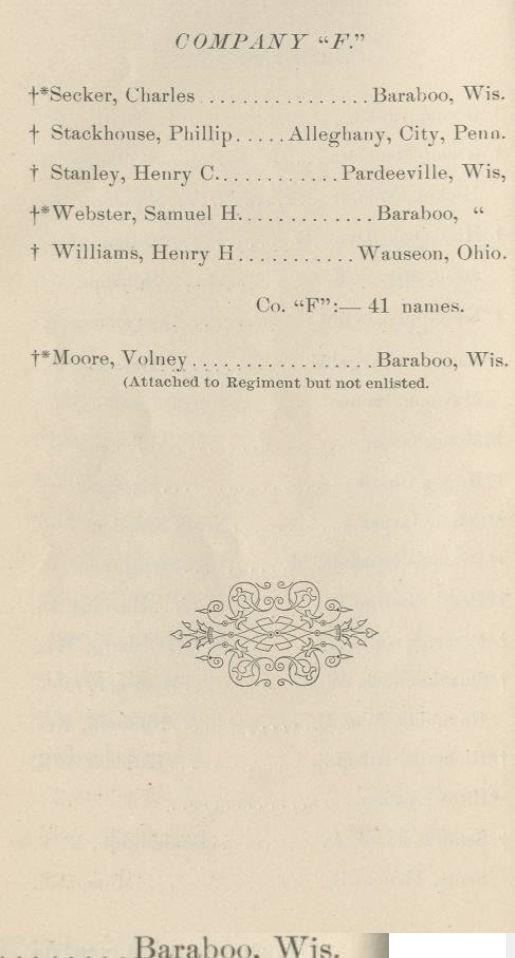

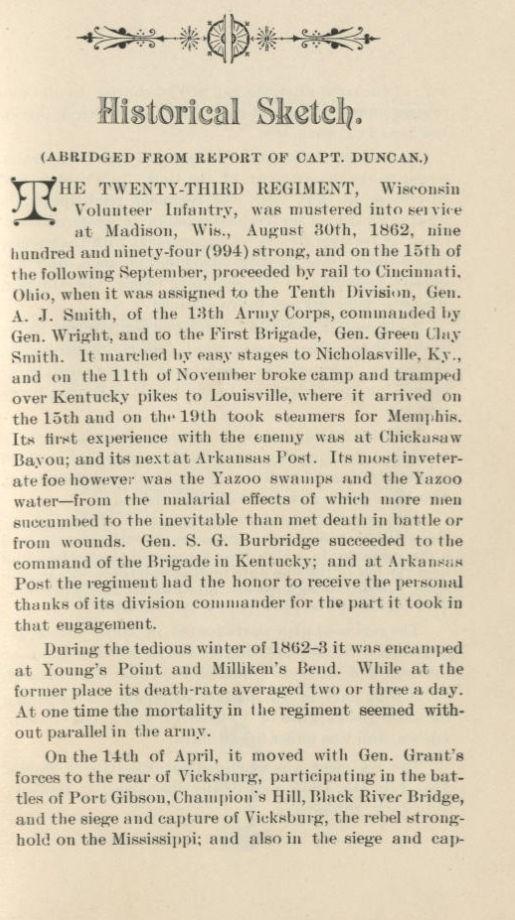

 From the Wisconsin Veterans Museum
From the Wisconsin Veterans Museum
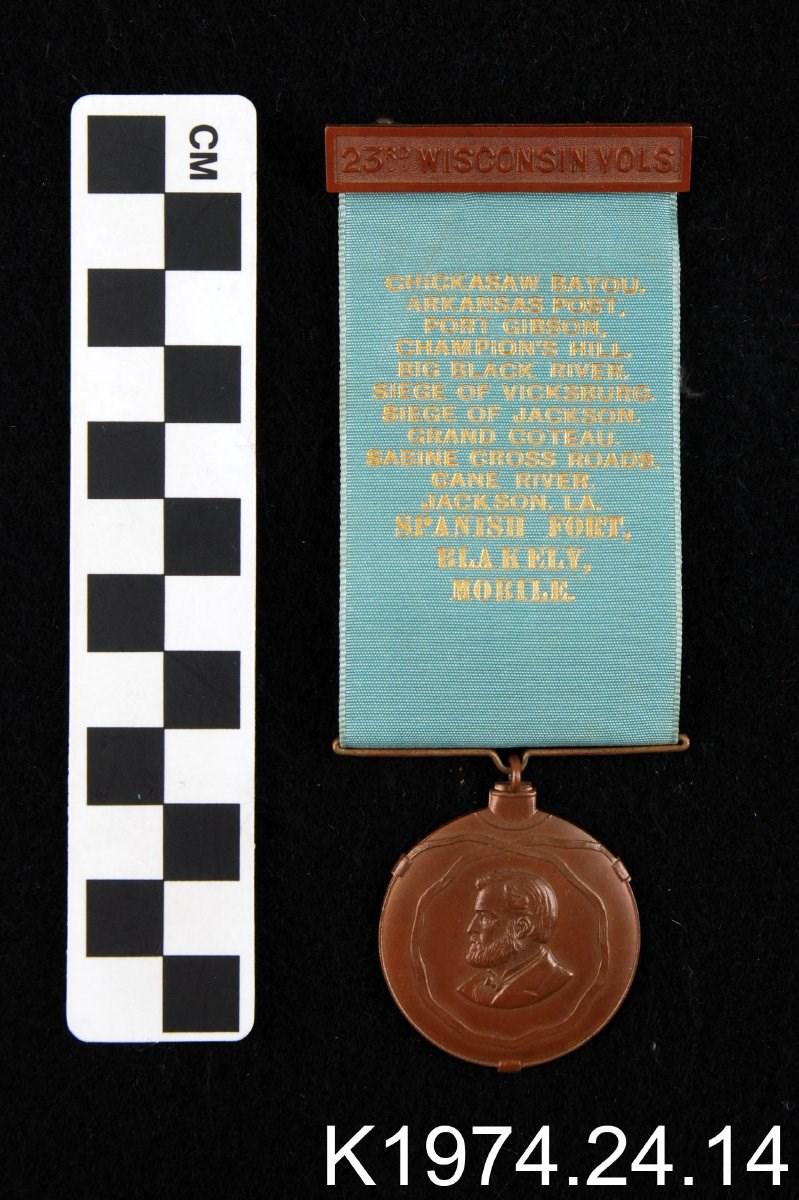 From the Wisconsin Veterans Museum
From the Wisconsin Veterans Museum

 From the Wisconsin Veterans Museum
From the Wisconsin Veterans Museum


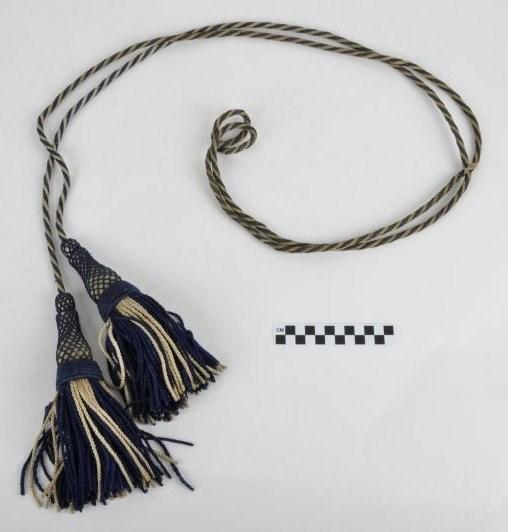 From the Wisconsin Veterans Museum
From the Wisconsin Veterans Museum
A canteen such as this, would have been in common use among the soldiers during the Civil War.





Masonic Memorial Park, Tumwater, Thurston County, Washington, U.S.A.
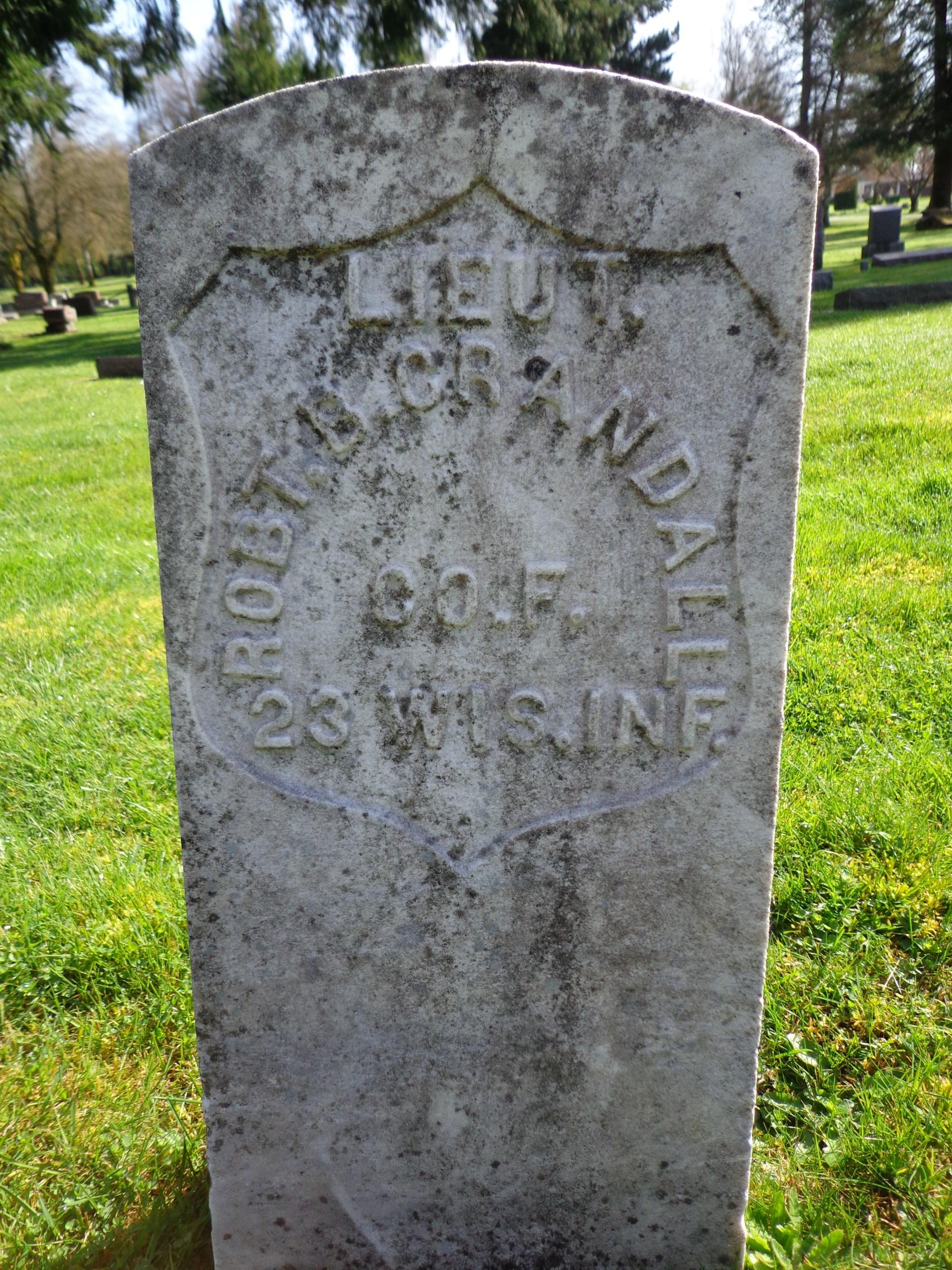

(From “The Advance” Chicago)
Died, at his home, Olympia, Washington, October 10, 1901, Robert Bruce Crandall, aged sixty-two years. The church has lost a strong support, and the community an excellent example of moral and spiritual life. His influence was always helpful, and he held the respect and strong attachment of a wide circle of friends.
He leaves a wife (formerly Alice M. Knight), two sons, Morris C. and David E. and his only sister, Mrs. J.G. Train, of Baraboo, Wisconsin. His only daughter, Jessie Hale, aged twenty-four years, preceded him in death by two years.
(From “The Baraboo Republic,” Baraboo, Wisconsin, by Mrs. Train and an Army Comrade)
Robert Bruce Crandall died at Olympia, Washington, October 10, 1901, after many months of suffering which he bore with great patience and courage. His death was the result of chronic heart disease and rheumatism. He was a native of Mississippi. His parents came to Baraboo when he was young. Here he resided until he enlisted in Co. F, 23d Wis. Vol. soon becoming orderly sergeant then second lieutenant, for meritorious conduct, and finally filling the position of adjutant to the regiment when mustered out. As orderly sergeant and adjutant he was the most considerate of officers, frequently dismounting and giving his horse to foot-sore soldiers who were resting by the way. In camp he was ready with a cheery word for the homesick, and by example inspired the discouraged.
After the close of the war he married Alice M. Knight, who survives him with two sons, Morris and David. Mr. Crandall was twice elected to the office of County Superintendent of Schools of Sauk County, and was principal of graded schools for more than six years. He finally settled in Olympia, Washington, and was appointed bailiff and assistant clerk of the Supreme Court of the State, which position he held until his death. He was buried in Olympia beside his only daughter, Jessie Hale, with the ceremony of the Grand Army of the Republic, the Supreme Court attending in a body. His sister, Mrs. K. Crandall-Train, visited him this summer. She is now the only remaining one of his father’s family.
His record as a soldier is the history of his regiment. He participated in the battles of Chickasaw Bayou, Arkansas Post, port Gibson, Campion Hills, Black River Bridge, Siege of Vicksburg, the Teche Campaign, Bank’s famous Red River Expedition culminating in the disastrous battle of Sabine Cross Roads, ending his proud military career at Spanish Fort and Fort Blakely, near Mobile, at the close of the war. He performed his civic duties with the same earnestness and high endeavor as he did his military and was always faithful to the trust reposed in him at all times a Christian gentleman. During his fatal illness the judges, old comrades and countless friends showed their highest regard for him in every possible manner.
He was born near Montgomery, Holmes County, Mississippi. His parents were David Phelps and Priscilla East Crandall.
From a booklet produced at the time of Mr. Crandall’s death, in the possession of Beverly Cabbage.….unselfish man. He was always gentle, courteous, sympathetic and helpful. More than that, his wide reading, varied experience, cheerful humor and wonderful memory made him one of the most delightful companions in the world, and I treasure as not only happy but valuable the many hours spent in his society.
LOUISE AYER Supreme Court Stenographer“We have read intelligence of the final departure of the one whom we all revered and loved so truly. The weariness and constant physical suffering is all past, and he has entered into a life where rest, peace and joy remain for all those who are God’s own children indeed. His example has been and still is a benediction to all who knew him.”
“His relatives and the multitude of friends will always remember him as one of the best of Christians, and one of the most livable of men.”
MRS. MATTHEWS, Sister-in-law“Permit me to pay my tribute of respect to the memory of a gallant soldier, who never failed or faltered in his duty. A most exemplary man, of irreproachable character, not having a single vice. He was emphatically a Christian gentleman.”
“He was one of the best of men, and the best friend I ever met. He was naturally studious and scholarly, above the ordinary. During the many uears of acquaintance I never heard him utter a word not proper for any presence, nor to speak ill of anyone.”
E.D. JACKSON, Former PupilLAST TRIBUTE FROM HIS FAMILY
The members of Mr. Crandall’s family desire to add their testimony to the foregoing their last tribute to his memory.
While not claiming for him any approach to perfection, still, as a member of his parents’ family, as a husband and a father, as friend, neighbor and citizen and as a Christian in all these relations, he had few superiors. Furthermore, his morals, both public and private, were without reproach, became the controlling motive and spirit of his life were correct.
In religion, he was tolerant, in the highest degree, holding fellowship with all who are striving upward. Surely, such a character is true riches, and the memory thereof only blessed.
MRS. R.B. CRANDALL Morris C. CRANDALL DAY E. CRANDALL From a booklet produced at the time of Mr. Crandall’s death, in the possession of Beverly Cabbage.The following extracts a from private letter (written to a friend after the death of Mr. Crandall) are inserted in this leaflet in order that absent friends and his young grandchildren in after years may know the particulars of the passing of so noble, manly and living spirit.
The history of the half year preceding his departure is a history of pain an almost continued trial to body, mind and nerves, a wasting of flesh and increasing weakness. Notwithstanding all these discouragements, he kept faith in his recovery. But, during the last week, he said to me: “I think I’ll lie right here till I die.” This was my settled conviction, but I replied: “I don’t know but I can’t talk about it. We must remember that ‘whether here or there we are in God’s hands.’” “yes,” he answered, “we are always in His hands.” And I would rather die than suffer as I have been suffering.” He felt that he could endure it no longer, although before his illness he had always enjoyed life and clung to it. But during his illness he said that he did not dread death in the least only the suffering before it came.
During the last afternoon all I could ask was for him to cease breathing. Not that he was suffering much more than usual, but was restless to the last degree, coughing and raising almost incessantly, which weakened him very fast. I said to him, “This is tiring you all out, isn’t it?” he answered, “Yes, I am tired to death.” Some days before this he had been growing more and more quiet, generally whispering his moanings. Sometimes when I would ask him if he was suffering much pain. He would say, “Yes oh, not so very,” making light of it as possible.
He was delirious occasionally, all these last days. His physician said that his mind, like his body, was too weak to work. All afternoon, Thursday his last day he became more and more delirious; in his restlessness asking once, in much excitement, “Is Booker T. Washington coming here today?” Morris told him he guessed not. “Then when is he coming?” Morris said, “I don’t know just when.” Almost the last of his continuous reading was Mr. Washington’s autobiography. “Up from Slavery., which interested him greatly.
While so restless I sat by him, fanning him, and for a while, until I feared he would tire of it, singing some of his favorite hymns and other simple pieces to quiet him. He lay still, more restful, not speaking, except whispering in delirium.
As soon as Morris could leave his bedside, he hastened for the doctor, who saw immediately that the end had come, and administered morphine hypodermically, below the abscess that terrible source of so much agony! Then I tucked him up carefully and said to him, “Now we won’t bother you any more and you can have a nice long rest,” my last words to him. He gazed earnestly into my eyes in slumber. From that restful sleep he never awoke. This is all we could ask. Neither he nor we had known real comfort for months, not being able to alleviate his sufferings, so why should we ask for them to be prolonged?
During the last day we did not send word to Day of his father’s condition, as both he and Bertha were in ill health. Very early next morning Day came and remained with us.
We had the body conveyed to the parlors of the undertaker, who satisfactorily performed for us the last sad duties. Morris went in next day in time to arrange his hair as he had always combed it. The floral tributes from friends were almost limitless and most beautiful. A neighbor’s little girl, who, with her mother, had shown Mr. Crandall many kindnesses during his illness, brought me next morning a huge bouquet, and the most delicate and sweet boutonniere, which she said was “for his breast.” Her wishes were granted.
In the casket he looked perfect so much more natural than he had for many weeks; so pleasant, almost smiling, as if he wanted to say, “I have conquered Pain and Death.” His face plainly showed that he had won the victory and seemed to tell us that he is still living.
“The storm that wrecks the wintry sky No more disturbs his sweet repose, Than summer evening’s latest sigh That shuts the rose.”
“He’s reached at last a sheltering port, A blessed Home.”
And a glad welcome from daughter Jessie the home keeper as of yore, and many others, of his very own, who went before “to prepare a place for him.” A.M.C. From the collection of Beverly Cabbage
I would like to thank the following for their generous contributions to this publication
Beverly Cabbage
Sauk County Historical Society

The Wisconsin Veterans Museum, Madison, WI
Wisconsin Genealogy Trails
Wikipedia
Researched, compiled & produced by William C. Schuette
Reedsburg, Wisconsin
© 2021 William C. Schuette all rights reserved
Proceeds from the sale of this book benefit the Sauk County Historical Society